AMDG
Uganda
For a wordy, protracted, overly-dramatic, yet thoughtful and sincere preface, along with a note from Pope Francis, click here.
For a more concise version of a similar message from The Onion, click here.
For an appeal for mercy, click here.
The goals:
1) To write about the most important aspects of Uganda and the world and life and Jesus and my gratitude for you all and everything else.
2) To write once a day, even if briefly.
3) To include some pictures. A note about the ethics of photography.
The reasons:
This is an attempt to make sense of the otherwise unaccountable fact of my presence in Uganda. Lots of people (among them, Bob Pfunder at ND’s Common Good Initiative, and Denis Kidde and Rose Kiwanuka with the Palliative Care Association of Uganda deserve special mention) have gone to lots of trouble to arrange the trip. My best hope at redemption is to convey some manner of insight. I will certainly try to do some good in Uganda, but the chances of success are slim at best. By the end of the trip, I hope that it can be said that I was here because you couldn’t be.
Oh, and some of you requested this.
The setup:
I will be in Uganda from 5.12.14 until 7.15.14. My official title while here is Intern at the Palliative Care Association of Uganda (PCAU). I will spend my first week in Kampala, getting oriented to PCAU, Uganda, a new time zone, being decidedly white, etc.. I will then spend a month in Jinja and then three weeks in Mbarara working in both places with PCAU’s affiliate hospice and palliative care centers. The exact nature of my work will unfold in the future and on this page. My work here was generously, and inexplicably, funded through the immense generosity of Notre Dame’s Common Good Initiative under the direction of Bob Pfunder. I deeply hope that I can prove myself, even in just a really small way, worthy of the gift. For a brief word about Uganda, including a map featuring the aforementioned cities (along the southern edge of the country), please click here.
5.12.14
Arrived in Kampala. Flight technology is wonderful and absurd. The secure zone guard with a big machine gun lent me his cell phone to call my ride. Hopefully this is typical of the country; by all accounts it is.
5.13.14
Shopped for essentials in downtown Kampala. Traffic, fumes, and street-vendors abound. A dearth of open spaces, the lack of an apparent city plan, and pervasive disregard for traffic laws contribute to a sense of confinement and chaos. On first exposure, the city itself lacks charm, personality, and interest. The people, on the other hand, are friendly, warm, and make good eye-contact. They are at the same time youthful (Uganda is the youngest country in the world; 77% of its population is under the age of 30) and slumped (Ugandans are, perhaps relatedly, the least-employed; the rate of joblessness between the ages of 15 and 24 is 83%). The streets teem with healthy, intelligent-looking, well-dressed young people working as motorcycle taxi drivers and street vendors; hordes of people working way below their potential.
5.14.14
Big Day. Orientation at PCAU, the organization with whom I am interned. It turns out that morphine is the name of the game; PCAU is dedicated to bringing government-purchased, nurse-prescribed liquid oral morphine to all in need throughout the entire country. If PCAU is successful, then morphine will become the opiate of the people. Among the PCAU patient testimonies: “It is my savior.” And the main goal, according to the Program Director, is to “preach the gospel of palliate care.” The gospel is that proper pain control with oral morphine can alleviate terminal suffering.
My internship is undoubtedly a splendid opportunity. PCAU and its partner organizations have been extremely effective in their mission (0/112 districts enjoyed morphine-based palliate care in 1993, and 83/112 districts enjoy it now); it will be a privilege to learn from their exemplary efforts.
There are a couple of questions that have been bugging me throughout my orientation. They should be taken in no way as a critique of the organization; the questions are matters of individual, not corporate, responsibility. They fall into two broad categories: 1) The role of suffering at the end of life, and 2) the role of faith at the end of life.
What is the role of suffering at the end of life? Is there any sense, even if a very vague one, in which suffering is somehow important and should be preferred to narcotic release? As soon as I say this, I realize that it is probably the height of naïveté and presumption to make normative conjectures about how people deal with their pain. Nonetheless, I have a nagging sensibility that suffering can be purifying and redemptive, and that it would be somehow problematic to relieve it completely. The sensibility might be a holdover from related deliberations about euthanasia. While terminal narcotic care and terminal killing are surely two entirely different phenomena, some similar considerations seem to attend each. …OK, scratch the comparison with euthanasia. I just read a splendid article on the USCCB website that answers my questions almost completely. Read it here if interested. The main point: pain control with morphine at the end of life can be decisively distinguished from euthanasia, and is a really important part of good medical care. More about this later.
I must wrap up and hit the hay. The other question, about the role of faith, will have to wait. Stay tuned…
Jogged to Mass this morning. Gorgeous singing. Might try to record some of it for a future post. Also, at the elevation of the Precious Body, and then again at the elevation of the Precious Blood, the congregation gave a round of applause. Yes.
Some pictures:
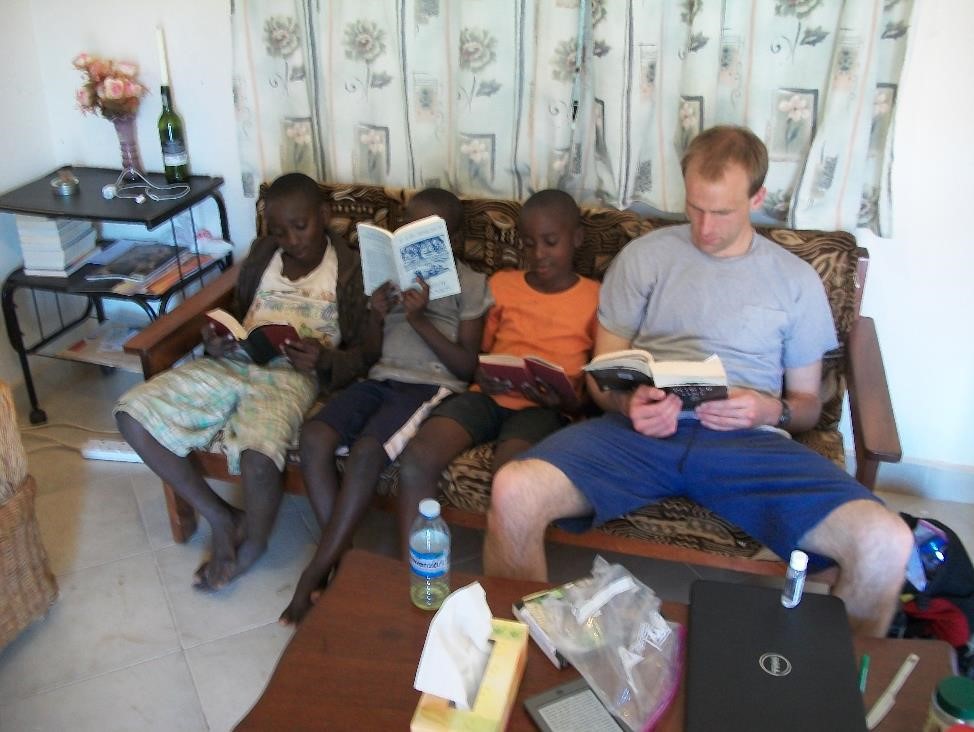
The neighbors and me at leisure. From left to right, Joel is reading his favorite book, namely Genesis. Eric prefers St. John Chrysostom’s On Wealth and Poverty. My newest Muslim friend, Shafiq, The Imitation of Christ. And I am finishing The Power of One, which is, as it turns out, One of the finest and most Powerful books ever written. After we read, hanged out and ate some chapatti, the dudes took my roommate (Graham, a fellow ND student doing a month of research on medical stuff. Good guy.) and me on a tour of the neighborhood haunts, to include the local charcoal stove factory where Joel’s dad works. See pictures of stoves below. More, perhaps, on the factory soon. The posse members in addition to J, E, and S are named Danielle (5ish) and Daisy (3ish). Please pray for them.
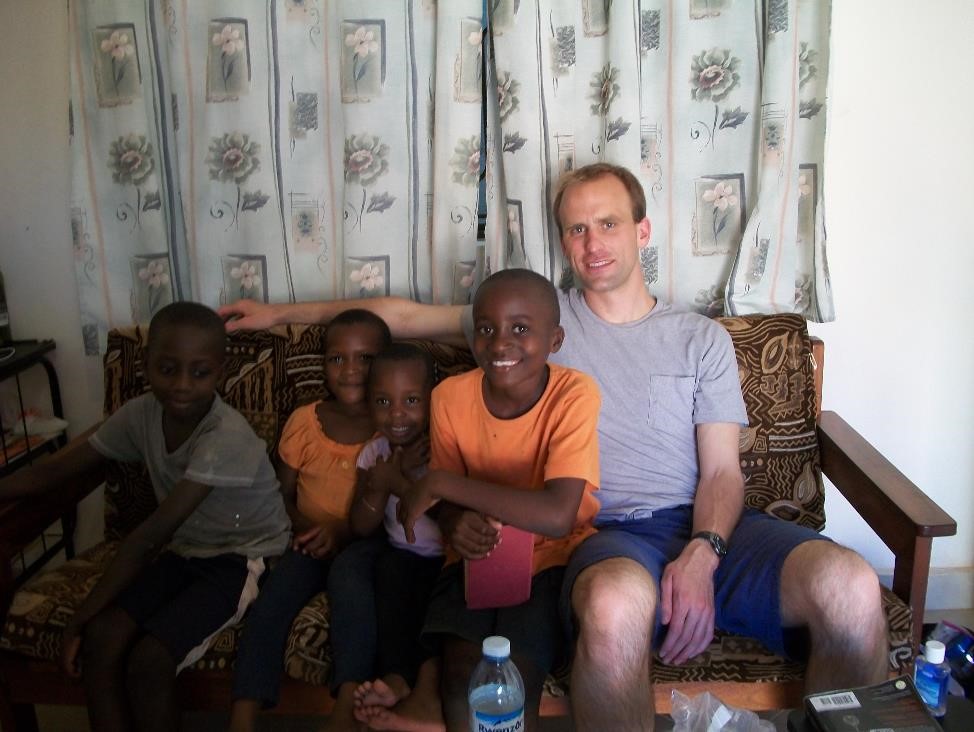
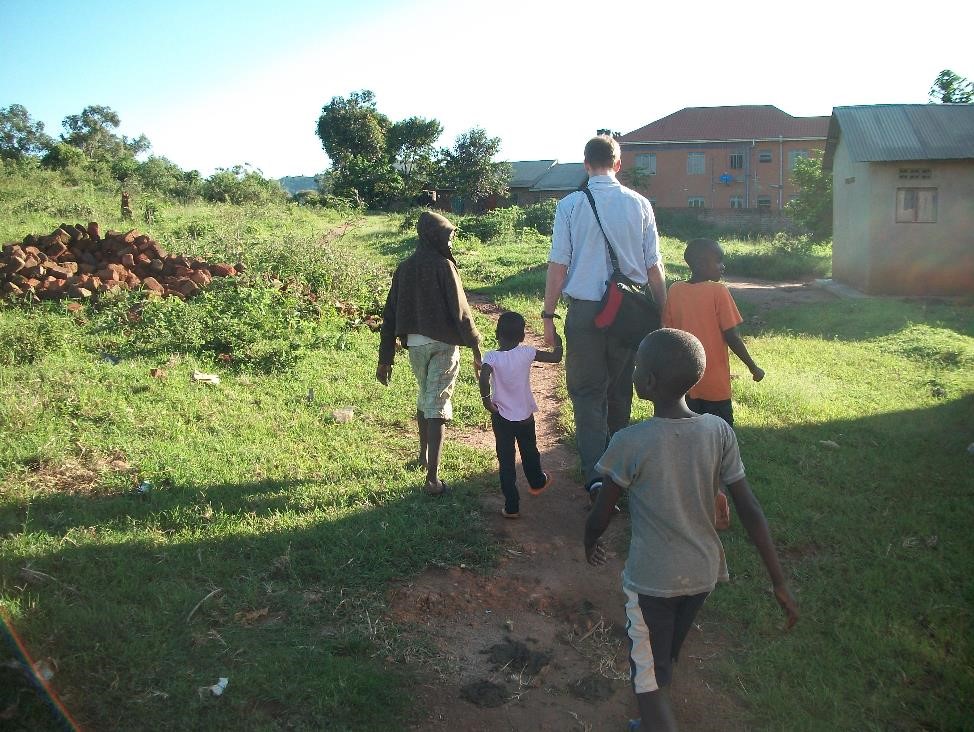
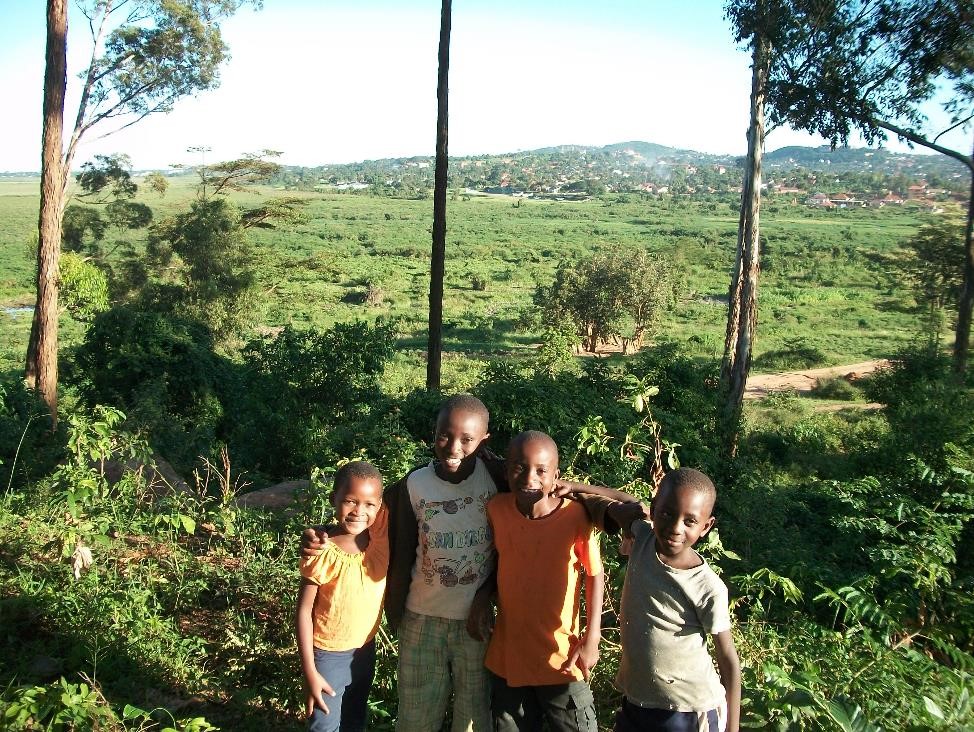
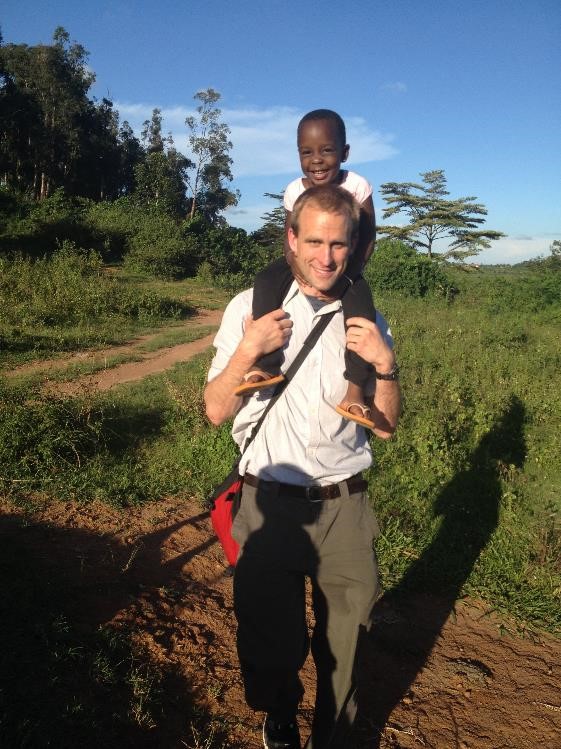
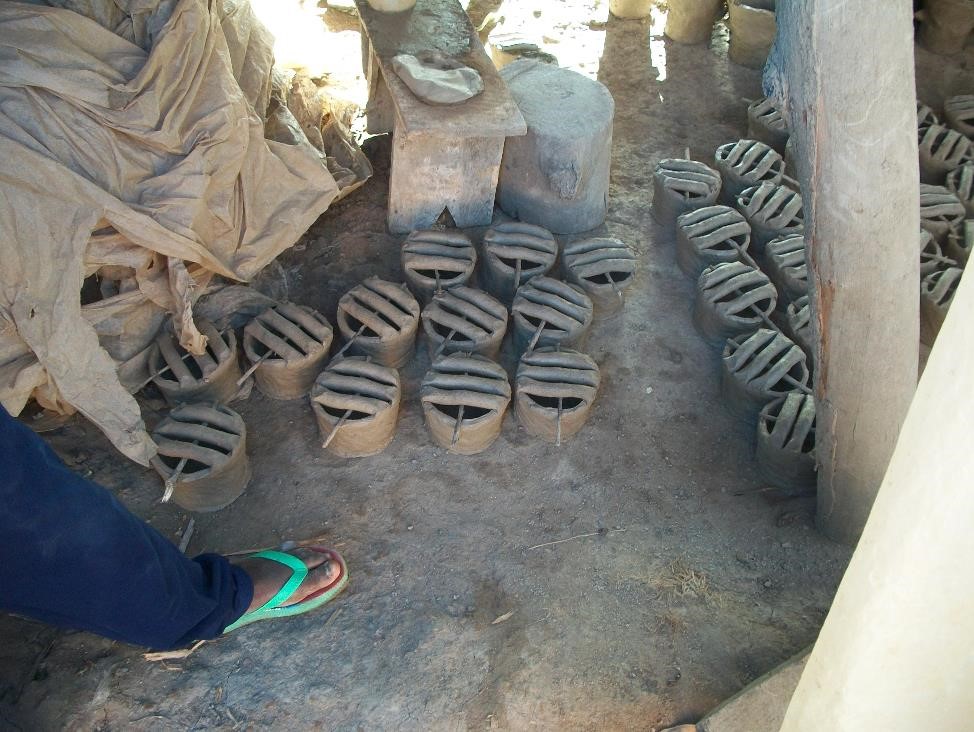

Featured prominently in the PCAU waiting area, where religious art would be in a Church parlor, or a giant logo would be at a corporate headquarters, is a portrait of morphine distribution.
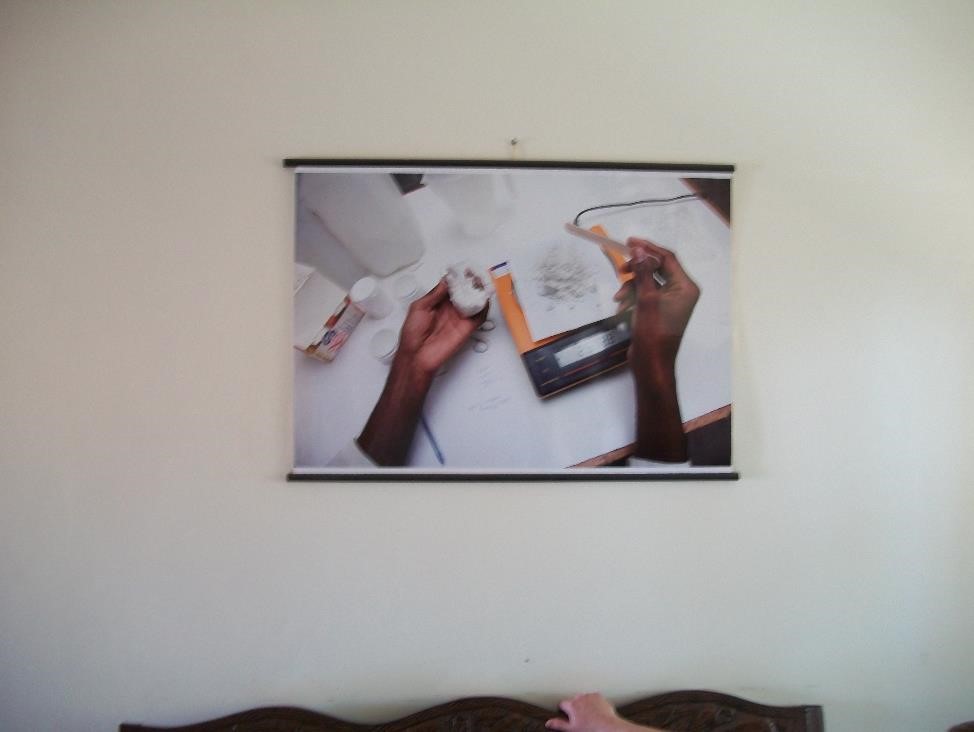
5.15.14
Hospital Day. We (Graham and I) visited Mulago Hospital, Kampala’s main public referral hospital. It was a tremendously valuable experience. There are many aspects that I would like to write about at length, but time is short so I will provide some brief quips and a pic instead. The most striking difference between Mulago and an American Hospital is that the patients are primarily cared for, not by nurses or docs, but by their own people. Here is a pic of a typical ward (from cccuganda.blogspot.com):
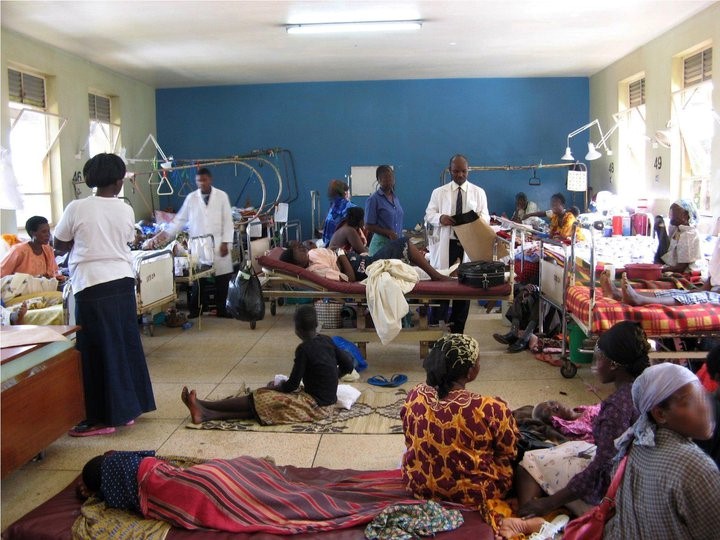
The people in the foreground on the floor are caregiver relatives and friends. They camp out in the wards, sometimes sharing the same bed as the patient. Since they are not allowed on some wards, they often hang out just outside of them, lining the hallways and crowding the more capacious stairwells. While this is surely a terrible inconvenience, and sometimes an impossibility, for people who live hand-to-mouth and for whom not working can mean starvation, the effect at the bedside is, on the whole, quite humanizing. While the challenges of tending to a loved one in the hospital are surely great, the work (of mercy) prevents depersonalization, which is one of the plagues of American medicine. Today, we met an elderly woman dying of cervical cancer, along with her teenage granddaughter who was caring for her. The girl’s presence seemed to change the dynamic entirely. From the practitioner’s perspective, it would have been almost impossible to reduce the patient to a bed number or a disease entity or something like that; her granddaughter was proof against clinical analysis (from the Greek for “cut up”, in other words, “person-chopping”) and corporate commodification. The patient’s personal identity as grandma, lover, and beloved became unforgettable. From the patient’s perspective, her granddaughter’s presence staved off loneliness and despair, the same demons that attend so closely the isolationist policy in America. The woman, though exhausted, withered and bedraggled, was not sad. She smiled genuinely, from the inside, at moments, and seemed, I guess you could say, undaunted and whole of soul. I doubt that she would be so if she were alone, as so many patients in our country are.
There is much more to say. I hope to get to it soon. Thanks for reading and following this whole thing with so far. I hope that it helps somehow. Please email with thoughts.
5.16.14
I had the pleasure today of lunching with Michael, a founder of Africa’s first and only Catholic Worker. The convo could have been entitled Lost in Translation: Why the Catholic Worker Doesn’t Abroad. Here are a few key points:
1) Americans have extra stuff and Ugandans don’t. Food, clothes, money, time. Lesson: The Catholic Worker depends on economic excess.
2) Similarly, Americans are into giving homeless people stuff, while Ugandans are not. They see it as ridiculous that able-bodied people should eat for free while many others starve. Not only that, but the sloth induced in this manner is harmful to the homeless and to society.
3) Americans can say whatever they want and Ugandans can’t. I asked Michael if the Worker here engaged in political activism, whether he did war resistance, tax evasion, etc.. He laughed. If someone questions the government here, they get beat up (badly) and put in jail. It turns out that dictators are really touchy. Especially when they are trying to keep up the appearance of democratic mandate. A man named Museveni was elected to a five-year term in 1986 and is still the president. By anecdotal accounts, approval ratings are low. These demagogue types are sort of insecure, don’t get jazzed about constructive criticism, and fail to see how cool protests can be. Lesson: The Catholic Worker’s contrarian swagger is predicated upon a relatively functional democratic milieu.
4) Americans are into spending a few years doing “service,” while Ugandans look for jobs. Where money is tight, competition is fierce, and you don’t get ahead by hanging out and helping poor people. The parents, especially, find it absurd that their kids, for whom education is extremely expensive and for whom the parents sacrifice endlessly, should use their most productive years in such a silly manner.
5) Not all Americans want to get married, whereas for Ugandans to be unmarried is to be incomplete and unsettled. According to my PCAU colleagues on a long car ride today, nobody takes people seriously until they have kids. And preferably lots of them. The CW lifestyle is not conducive to procreation.
There are probably a few more points that I am not recalling at the moment.
The history of the Uganda Worker is educational. The entity was apparently conceived by a couple of m’zungu (whities) in 2011 who preached the vision, got things moving, and then left. And then said that they would support the CW and didn’t. And then lots of CW’ers in the States apparently told Michael to keep plugging, even without a lot of support, because, well, many Catholic Worker communities struggle at first. So Michael is still at it. There are surely other sides to this story, and I would be delighted to hear them. I guess the moral of this story is the old “love in action” bit.
Now, could Michael have been just buttering me up for a fat donation? Sure. Did it work? Absolutely. Even if it was a whopper, though, it was a good one with some good lessons that were probably worth the price of admission, and it’s pretty cute for me to be able to say that I met Africa’s only Catholic Worker. I got a picture too:
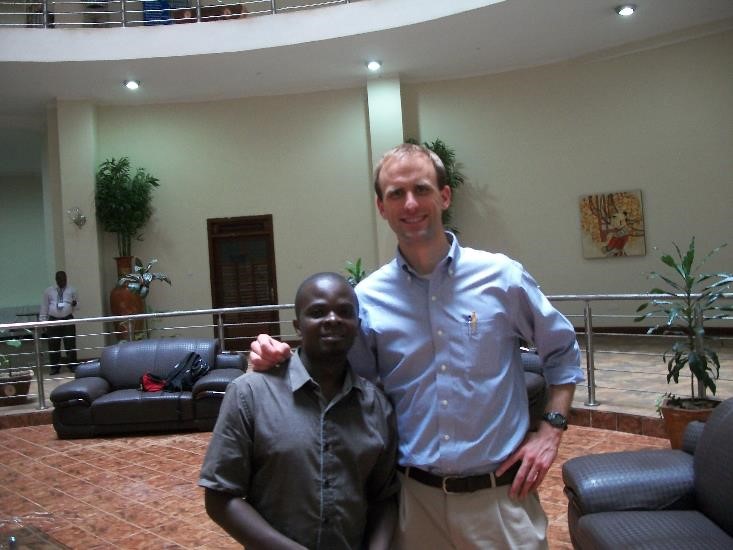
I spent most of the day at a conference at one of the nicest hotels in Uganda (see background above; voluntary poverty is not a concept here). It was a summit of some of the main players in the African palliative care scene. They were trying to pass legislation that gave them more bureaucratic support and a stronger governmental mandate. It was boring and fascinating at the same time. The presentations were difficult, but the social dynamics were rich. Basically, it was an attempt at implementing a Western societal convention, The Bureaucratic Meeting, in a radically unconducive environment. I found it hard to follow what the people were saying, not only because the English was heavily accented, but also because the thought processes were difficult to follow. They lacked the logical coherence and linearity that make statements go smoothly into my bureaucratically-formed mind (What is the classroom, after all, but an exercise in bureaucratic procedure?). It felt like people from various particular coherent local tribal traditions and modes of interaction, expression, thought, and dress were forcing themselves into Western bureaucratic conventions, social, verbal, mental, habilimental (please email if you can replace this made-up word with a real one) and otherwise. The effort was stilted and violent.
I suppose that the incapacity to assimilate smoothly to (Nietzschean?) bureaucratic culture is rather a virtue than a deficiency. So the folks are bad at meetings. Good for them. They have ways of being and interacting and communicating that resist foreign imposition. Perhaps many of us who have been formed in the ways of the West would stand to benefit from trying to retrieve those aspects of our traditions and cultures and tribes that resist homogenization, deracination, commodification, Americanization, etc.. Especially the Roman Catholic tribe. I hope that it’s not too late.
I realize that I am treading on sensitive territory here, and that my thoughts lack a lot by way of nuance and political correctness. Please remember, though, dear reader, that I am not going for nuance here. This journal is a collection of stereotyped, prejudiced, first approximations. I suppose that there is really no other possible way to say anything about life on first glance than sloppily; making thoughtful, hasty judgments and then revising them later is surely better than having no thoughts and withholding all judgment (I mean to exclude here the condemning sort of judgment, of course). If anyone can help me with the nuancing, I am sure that I stand in great need of it, and I would be delighted for the help.
I just hijacked one of those corporate legalese email disclaimers from an email of a friend who works at JP Morgan and posted it at the bottom of the page.
[A note from the future (6.21.14)]: Back on this day in the journal (5.16.14), I went a bit overboard with a rant about the recent Uganda Anti-Homosexuality Bill. Unfortunately, it came out a bit more strident than I had hoped, and I can’t seem to soften it without being untrue to my convictions. So, I took it down; I didn’t want to blind-side my audience with a polemic among otherwise polite and relatively innocuous observations. There are a couple of paragraphs, though, that are only pertinent to the Bill by way of back-grounding, that are not terribly controversial, and that bear on the Ugandan experience more generally. I excerpted them here in case they help.
“…In order to understand the importance of the retributive Western response [to the Anti-Homosexuality Bill], some words about foreign assistance are perhaps necessary. Foreign aid is a narcotic here, and the whites are the dealers. When people get hooked on drugs, they forsake the relationships and modes of existence that sustain them. So it is with the Ugandans and their traditional relationships, cultures, and native institutions. When people turn towards the aid-dealers to get their fix, they turn away from their ancient tribal social structures, the institutions that give them life and identity, meaning and satisfaction. By the time the dealers lose interest and pull the plug, the relationships have often changed and the structures eroded. Whereas people were poor before, now they are destitute. In the case of the anti-homosexuality stance, it’s a big price to pay for displeasing the masters.
It doesn’t help that the psychology of the Western do-gooder is quite complicated; his reasons for engaging in the aid relationship are profound and mysterious, even to himself, and his reasons for leaving the relationship are similarly complex. The overall effect is that the m’zungu (Ugandan for Whitey) is a fickle and unpredictable beast. The problem for the Ugandan is that the sense of gratification that most Westerners get from doing good over here is not enough to sustain them in a long-term relationship, with the effect that they are rather more like dealers than true patrons or loyal friends. (I will go ahead and try to riff for a bit about the psychology of assistance, even though I am sure that it is much more complicated that I can imagine, and much-better-treated elsewhere.) It’s really nice for Westerners to feel like we are helping people. In fact, there is nothing nicer. We Westerners all have this holdover sensibility from Christendom that we should serve the poor and vulnerable. Secular atheists, Catholics, Protestants, hipsters, John Wayne, Flipper, vegetarians, casual Buddhists, and spiritualists alike, almost everyone in historically Christian countries thinks that it’s a really good idea to go help really poor people in all corners of the world. When you ask the Western atheist do-gooder why he is doing good, he will make a circular proposition, like he is helping people in order to help people, or he is going good, just, you know, for sake of going good. And helping people. If one really pushed it though, and really tried to get to the bottom of things, I thing that one would find suppressed Christian premises. One corroborating bit of anecdotal conjecture is that the globe-trotting impulse doesn’t really seem to pertain in non-Christian cultures. Muslim and Hindu cultures come to mind. They might have a great ethic for dealing with their own, but I can’t imagine that something like the Good Samaritan story would have a lot of meaning in these contexts. In most cultures, the “neighbor” is literally the guy next door, not the guy from a different country and/or caste. I haven’t encountered any Muslims doing aid work, or at least the kind of aid work that the Westerners do, and the widespread sentiment among the Ugandans are that the Hindu Indians are here for business, to make money. Westerners, on the other hand, come to Africa in droves because they get a lot of internal satisfaction and external affirmation from exercising their genetic Christian propensity for helping the poor.
This drive to lend a hand surely has many great and salutary aspects, and much if it, in the end is truly sincere, holy, and helpful. The problem for the poor, though, is that dependency is a one-way street. The Westerner can get his satisfaction and affirmation after only a short time with the poor, or by sending an occasional check if and when he can afford it and is feeling generous. The poor person, on the other hand, cannot get free food, water, medical care, money, and advice without the Westerner’s assistance, and his need is constant. The experience of helping the poor for a few weeks or months is enough to buoy the Westerner’s ego and pad his resume for the rest of his life. The experience of receiving help for only a few weeks or months leaves the poor person in need, sometimes a greater need than before the intervention. The strength of motivation in the aid-recipient relationship is grossly lopsided. The Westerners’ reasons for withdrawing aid can be trivial, whereas the recipients’ need for intervention always remains grave. Western support is fickle because it is driven by a desire that can be easily satisfied, even without actually accomplishing anything. It is often enough for people to only love in dreams. The Westerner can run from the poor for any number of reasons; because they get annoyed, because they get bored, because their excess money runs out and in order to continue they might actually have to sacrifice some aspect of their rich lifestyle, because the poor are not grateful enough, or, sin of all sins, the poor might take a stand for their families and their youth by opposing a …”
You can see where this is going. I think that the argument might actually have some good points, and that it’s not all actually as vitriolic as I am making it sound. Feel free to ask me about it in person if you’d like; I don’t mind mouthing off about this stuff in the context of friendship. No matter how much I may disagree with a friend, there are ways of communicating these things to their face that preclude animosity. In person, I can state objectionable points while also communicating, in various subtle and powerful ways, how much I love and admire my friend. This is impossible over the internet. I have long thought that people never really change their minds outside the context of friendship. People only really listen to someone if they think that that person loves and accepts them first. Public diatribes, many academic exchanges included, are for the gratification of the zealot and for the indulgence of people who already agree with him. They rarely, if ever, lead to benefit or conversion. In fact, impersonal, public rants usually have quite the opposite effect of polarizing and alienating the people who might gain the most from conversation in the context of warm and caring friendship.
Pic from the day:
The portrait that I drew for Daniella (5yo) during neighborhood kiddo activity time today. She kept on demanding that I draw various animals, and this is the menagerie that materialized. It’s a picture of a snake attacking an elephant that is counterattacking the snake, but only at the behest of the terrier that is riding the elephant while an eagle swoops in to finish whatever carnage the elephant manages to initiate:
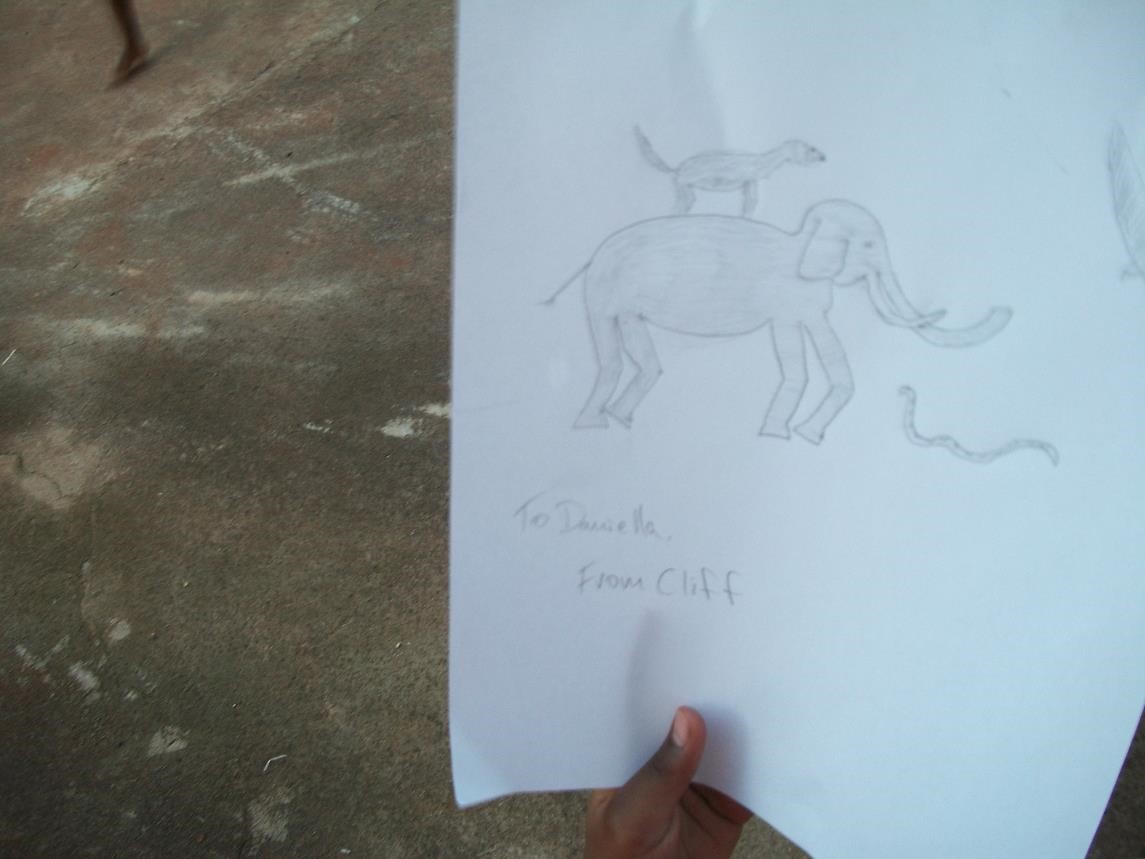
5.17.14
We went to the Uganda Martyrs’ Shrine in Namugongo today. The main mission was to fetch a relic at the request of my friend, Rick. Thanks, Rick, for the motivation; it was a good trip to make. Here is a brief history of the martyrdom, from America Magazine. Here are some profiles of the martyrs. The America article is worth a read; I will rely on it instead of doing my own recap here. The lesson is succinctly stated by Charles Péguy: “Life holds only one tragedy, ultimately: not to have been a saint.” Uganda martyrs, PRAY FOR US!
A few pics:
The sign at the front of the Shrine:
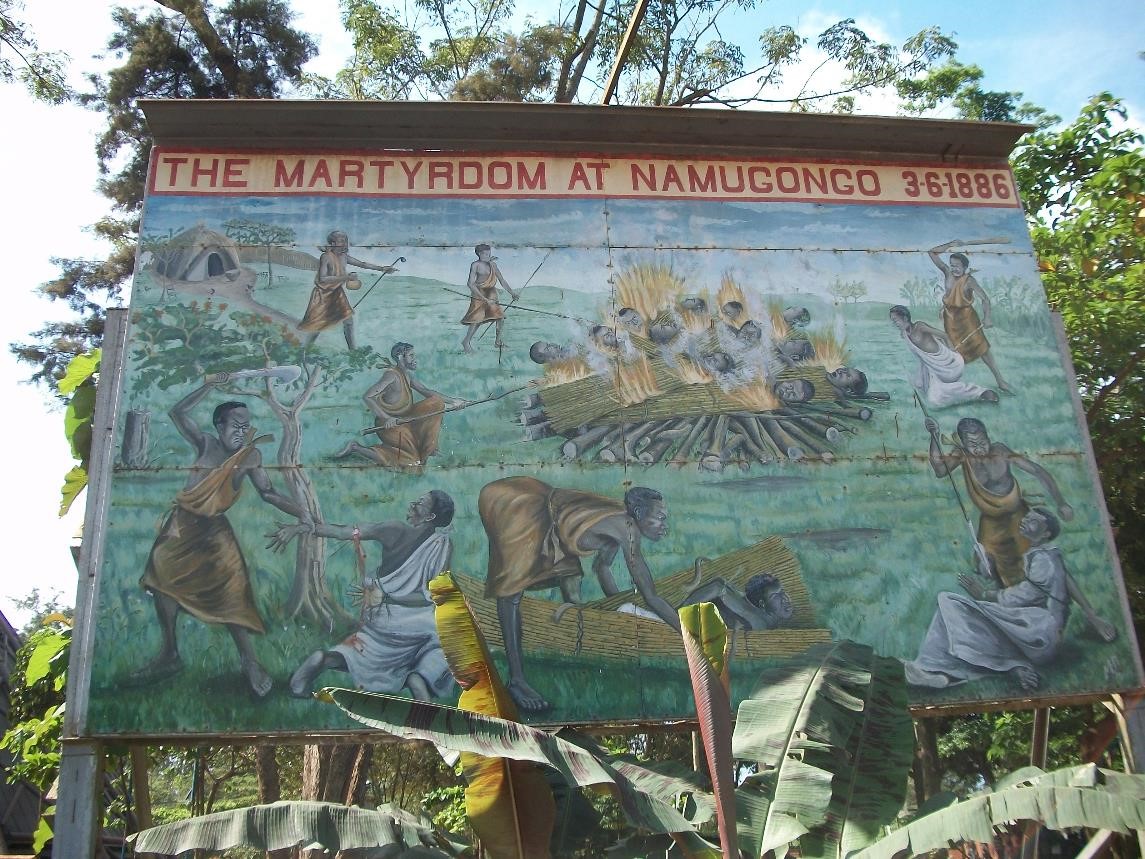
The Tabernacle:
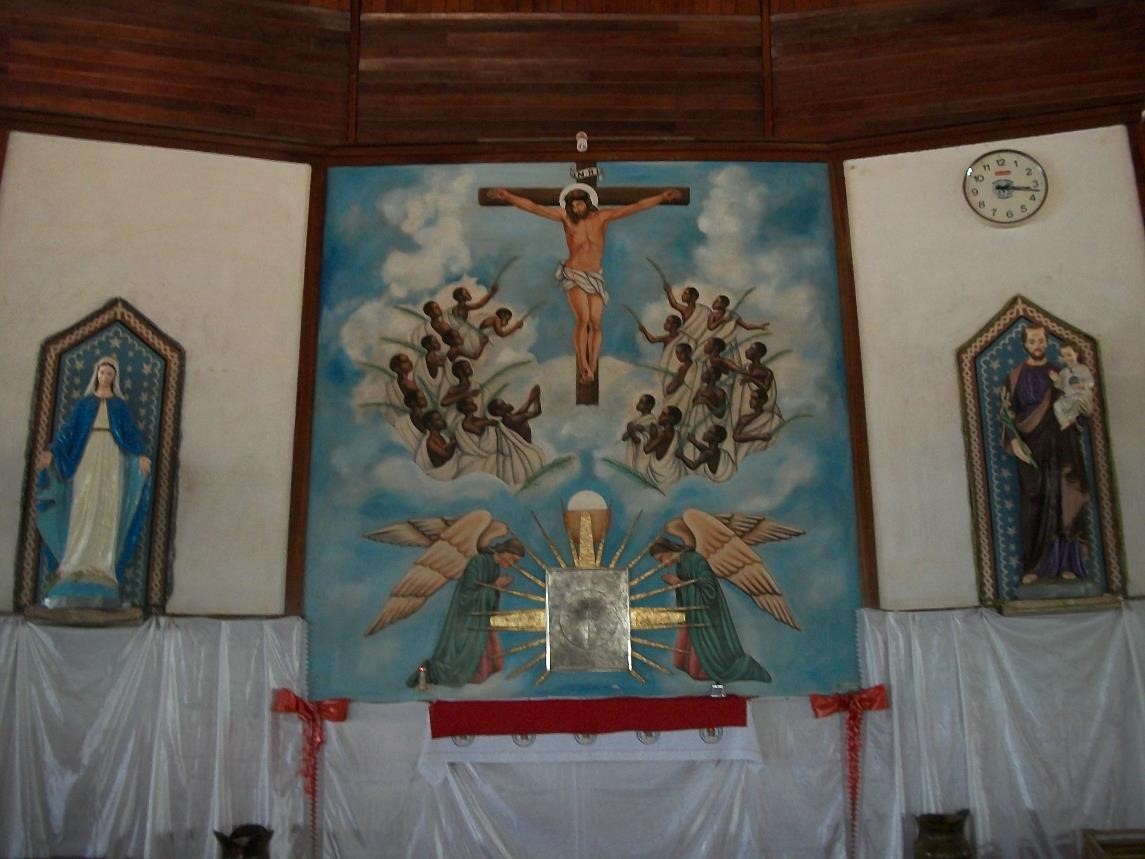
A sign with a short bio of Charles Lwanga:
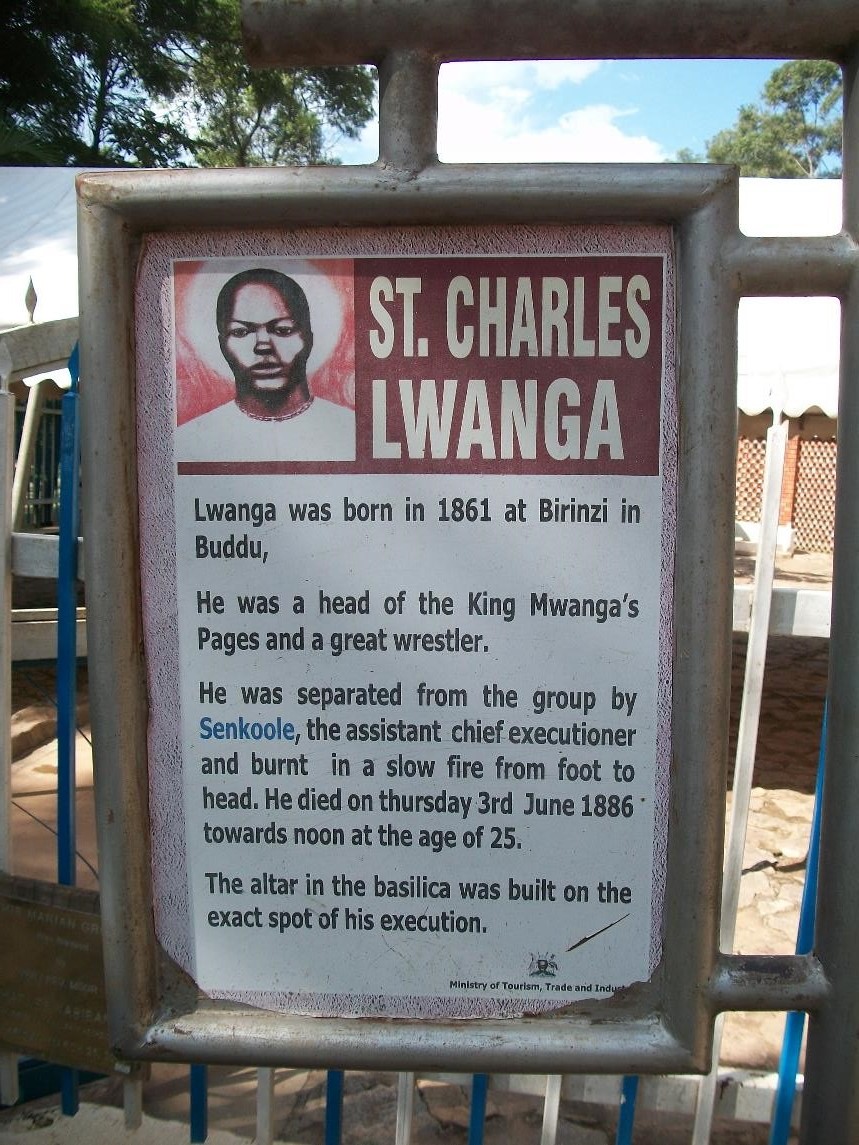
A scene of Charles Lwanga’s burning (look for the bundle of sticks with a head coming out the top; it’s sort of difficult to make out here):
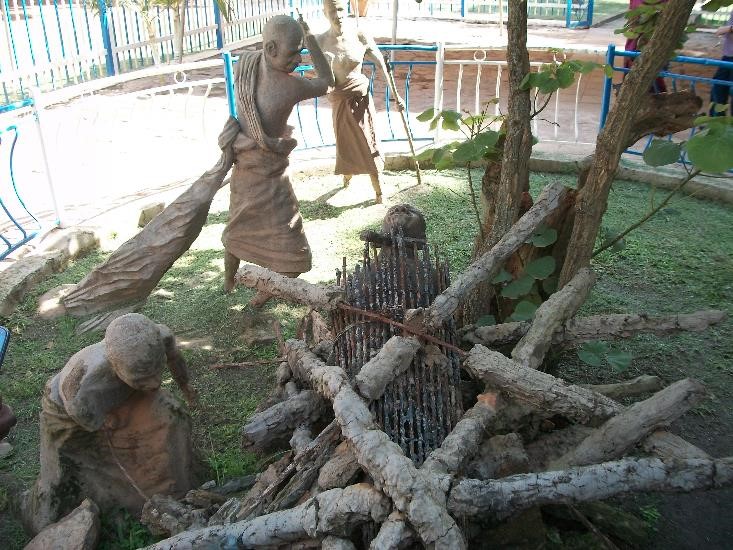
A few aspiring martyrs (Ronald [our car-driving Virgil], Graham [the roommate], yours truly):
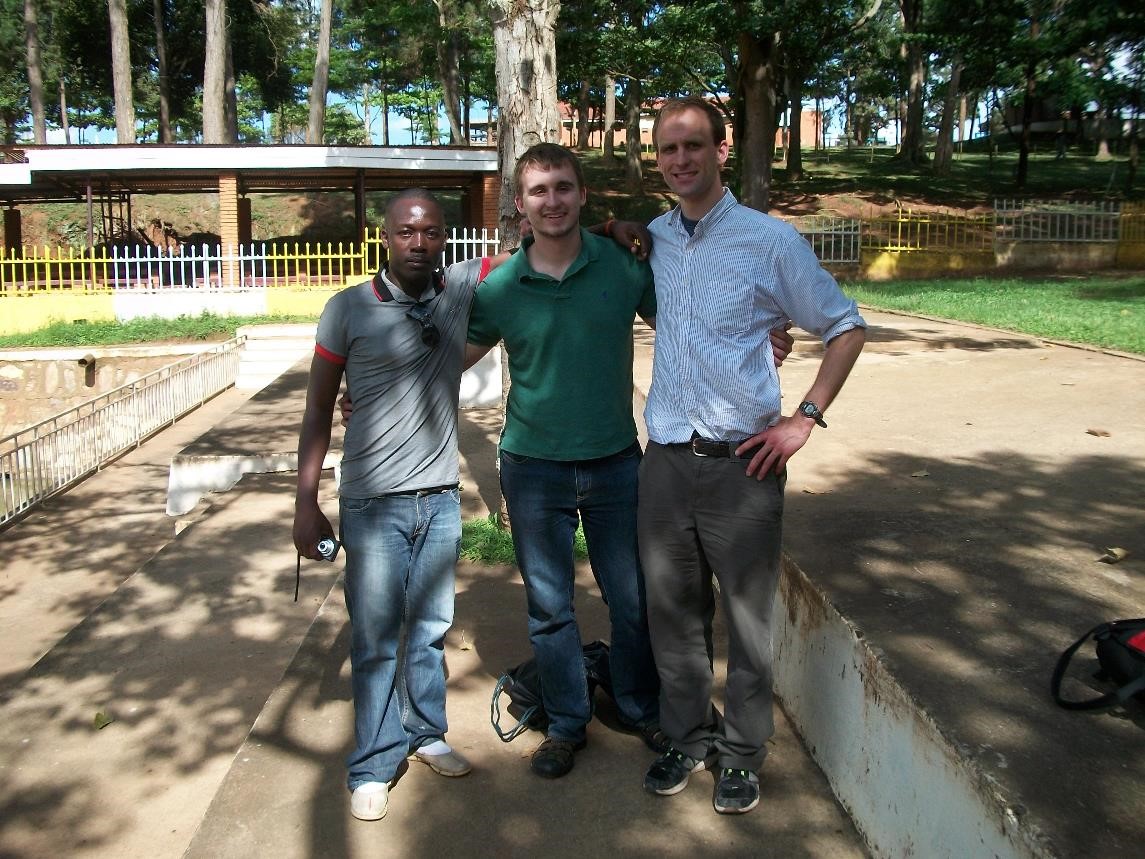
5.18.14
Travelled from Kampala to Jinja. Took most of the day. Nothing much to report.
5.19.14
I hit a wall today, especially with journaling. It feels quite lame and self-centered, like I’m just talking to myself and navel-gazing. I might take a break for a couple of days.
Another wall- I checked out from reality a bit and watched a movie on my laptop this evening. The Way Way Back. Pretty good flick. I’d give it an A-.
I suppose that these thoughts have nothing to do with Uganda and poor people and stuff. I am probably doing the escapism thing. Maybe the honeymoon is over, and the difficult stuff is getting to me. Hopefully this will pass and I’ll be able to live into the whole thing a bit more. Maybe it’s a natural and temporary response to witnessing a lot of poverty and suffering. We shall see.
We did do some home patient visits today with Hospice Uganda, the Jinja branch. I need to let it sit a bit before I can talk about it.
5.20.14
This is actually a note from 5.21.14--from the future. Whoa. I didn’t write today because life was really hectic. Graham and I decided to move out of our Jinja apartment that we have been in for the last couple of days because it was pretty rough. Small, stuffy, hot room with lots of mosquitos and ants. The last straw was the really loud TV next door that made it difficult to sleep. Here’s the thing, though. I had a breakthrough of insight at 2:53am, after being really angry and frustrated for a few sleepless hours in my bed. Right after I had the insight, and actually started writing about it, the television went off, at 2:58am to be exact. It was like God was trying to teach me something through the trial, and he wasn’t going to let up until I got it. But then, after I figured it out, the trial stopped immediately. I just regret that Graham had to get dragged through the whole experience.
The next day, I thought about how to present my lesson on this journal. Here it is: My grandparents used to cut out and pin up this little one-frame comic called “Love Is…” that would feature the most sappy and cliché aspects of love being acted out by naked babies with adult facial expressions. Totally creepy and arguably pathological. Here are a few samples:

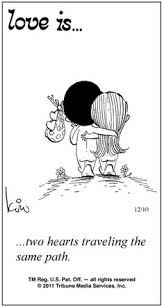
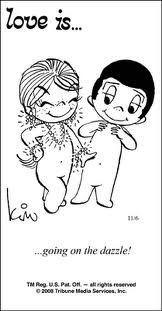

I thought to write a few observations about what Wealth Is…, but without all of the Freudian baggage of nude manchild comic characters. Here are a few taglines that come to mind based on my experiences over the last few days:
Wealth is…control over your sleeping environment.
Like I said above, cheap apartments mean thin walls and unpleasant neighbors.
Wealth is…beefsteak and mango lassi instead of maize patties and rice.
I lust for protein over here. Most people can’t afford much of it, so I end up spending Western amounts of money for Western amounts of beef at the m’zungu (Ugandan for “whitey,” “cracker,” “gringo,” “The Man,” etc.) restaurants in the area.
Wealth is…a smooth ride.
The roads here are awful, which means that car rides are tremendously turbulent. And slow. Unless your driver is as reckless and skillful as ours has been. James drives extremely fast over very difficult terrain. He is truly an artist at the wheel, a surgeon of the road. He drives with surgical precision, which is important because so many lives are in his hands, especially the lives of the people that he passes within a hairs’ breadth, mostly children. I marvel than he doesn’t clip at least one person a day. It doesn’t seem safe at all to me, but I suppose that I shouldn’t impose my standards…
Wealth is…frequent nursing attention and doctor visits in the hospital.
Everybody who has ever had a run-in with hospitals knows that the difference between life and death is a lot of attention, mostly from the nurses. Limited resources means limited salaries means limited attention. If you want good medical care here, you either have go to the public hospital and pay the physicians extra on the side for their attentiveness, or go to a m’zungu hospital, of which there are a couple in the country, and which charge much higher fees.
Wealth is…peace and quiet.
It is difficult for Americans to imagine how relentless and pervasive noise and chaos and stress can be, especially in poor urban settings. In America, we have lots of space, parks, benches, trails, rivers, and cheap, quiet restaurants where we can just sit down and take a deep breath and relax. And everywhere, for the most part, is relatively clean. Not so in most poor countries. There are few public open spaces, parks, natural vistas, benches, etc., and nothing untouched by commerce and disorder and dirt. If you want peace, you pay for it. In each of the towns I’ve been in so far (Kampala and Jinja), there are a couple of little enclaves of quiet and shade and relief, usually at high-end, Western-style restaurants or hotels or golf courses. There are rarely any locals around unless they are serving you, and you always have to pay. I’ve never before so appreciated or been aware of the thousand little things that make for pleasant environments. Maybe this means I’m getting old and soft. Here is a short list of those pleasant-making factors that come to mind as I think of the places I’ve been over the last week, both the dirty streets and the refreshing oases (particularly pricey restaurants): nice views, humble table service (there is nothing more relaxing, even inebriating, than being deferred to), polite manners by other rich customers (what are good manners but the mutual guarantee of a pleasant environment?), lots of space, a line of defense (preferably unspoken and invisible) against the riff-raff (usually enforced by a gatekeeper or maître d’), the absence of needy people (in other words, the presence of other wealthy people), a feeling of security (both bodily and with regard to belongings), aesthetically pleasing and solid architecture, tasteful art, healthful food, shade from the sun, and clean bathrooms. It’s the little things.
Wealth is…good information.
A lot of the patients that we see in palliative care have been thoroughly fleeced by the “healing” establishments by the time that they get to us. By their own accounts (I’m thinking of a patient named Lawrence that I did a full patient interview with yesterday), their first recourse is to the local traditional “healers”--herbalists, witch doctors, etc.. These often unscrupulous practitioners charge significant fees, and convince the people to keep coming back even without results. When the sick are finally out of money, the traditional types cover their incompetence by telling the patients that their disease is such that it can only be cured with a particular talisman that is obviously beyond their ability to obtain, such as a lion’s pelt or something like it. By doing so, the “healers” maintain their professional reputation and prestige; it is the patient’s fault that the treatment didn’t work because they weren’t willing to go the distance. Then the patient might put himself into the hands of equally unscrupulous Western practitioners, a white-coated version of the same scam. He goes into the Western-style medical establishment with his hat in hand and what little money he has left after the first round of fleecing. Instead of providing a probabilistic diagnosis based on patient history and clinical examination, which a skilled physicians can often do in little time and for not much money, the hospital advises the patient to undergo a full battery of imaging and lab tests for his suspected condition. A patient might come in with a classic, no-brainer, presentation of prostate cancer, for example. After spending all of his money on x-rays, PSA, biopsy, ultrasounds, and blood work the hospital issues a judgment that yes, indeed, the patient has prostate cancer. The kicker is that the diagnosis is useless because the patient is now too poor to obtain treatment in the form of radiation or chemotherapy. And the establishment knew this from the beginning because the full course of treatment for cancer, including transportation, food, etc., is about $1500, an unimaginable sum for most of these people. The establishment takes all of the patient’s money to perform a bunch of unnecessary tests to provide a useless diagnosis. The patients come to us, the palliative care folks, with lots of pain, and no recourse to treating the underlying illness. I suppose that we do them some good by lessening their suffering, but it sure doesn’t feel great to see people walking around with conditions that, back home, would be treated and sometimes even cured. My American colleague Graham was relating in the car yesterday, for example, that his grandfather’s prostate cancer was radiated and resected such that his grandfather has been cancer-free for years. My African patient Lawrence, on the other hand, is dying of prostate cancer because he can’t afford to treat it. Not being able to afford good treatment is one thing, but having access to good information and trustworthy medical professionals who could have saved him lots of money and time in another thing. A good doctor could have told him him after a ten minute history and five minute physical exam that yes, you probably have prostate cancer, and no, you can’t afford to do anything about it. Instead, the establishment here produced an identical result, but took him for all he was worth in the process.
Wealth is…a solid education.
It is probably difficult for us in the West to understand, also, how much an education matters around here. I include a photo of a little placard that sits in our apartment, on top of study guides for a nurse’s licensing examination. The placard belongs to the apartment’s regular resident, who is studying to be a nurse.
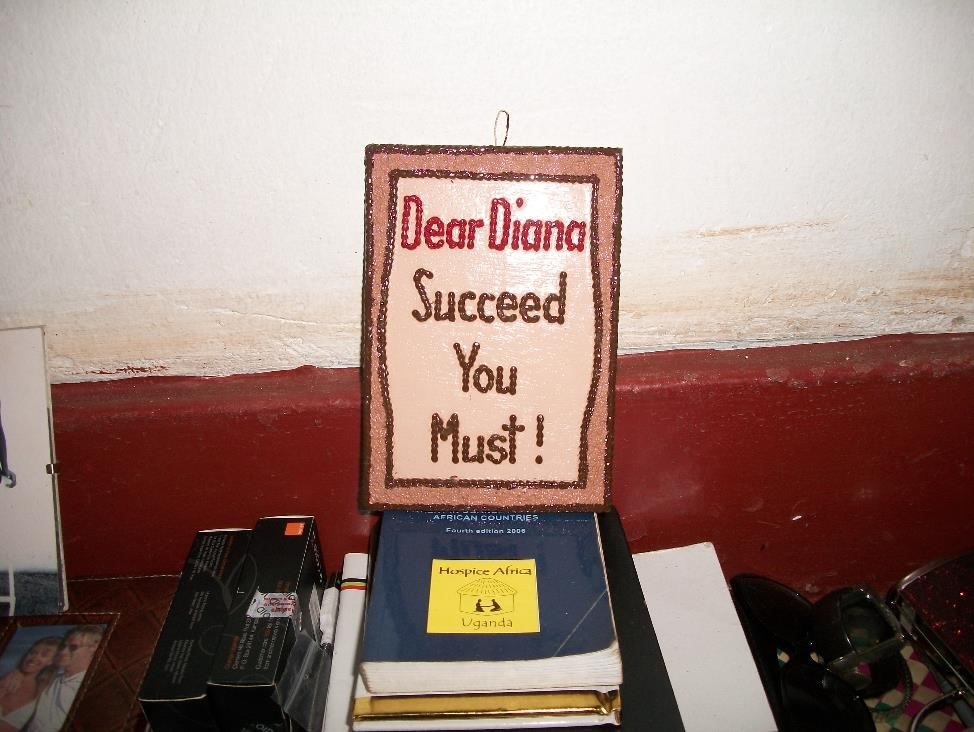
I think that this captures pretty succinctly the local attitude towards education. It’s not so much a matter of refinement, or even social status, as much as raw necessity. In an economy like Uganda’s, education is the only way out of one-dollar-a-day manual labor. Whereas in America, a high-school dropout can expect to be able to work hard at a decent job and make enough to feed, house, and educate a family at a relatively high standard of living, a lack of education in Uganda means penury. If someone can afford it education can open a world of possibility. Learning English, for example, gives one access to Western wealth; getting a professional credential is a quantum leap in terms of opportunity. Uganda is clustered along with the rest of Africa at the bottom of the literacy rate list, coming in at about 60%. If one can simply learn to read, one is way ahead of the game. Since an education is the (only) way out of grinding poverty, lots of families give everything to provide their children with a good one. Our driver yesterday was laughing at the fact the police had set up their radar guns along our route. It happens only sporadically, when they need some extra income (in the form of bribes to keep from getting a ticket). The widely-known reason that the police had set up shop during this particular time of year: school fees are due. Educational costs put a lot of stress on families, and scraping for the fees is a well-known phenomenon. The moral of all of this is that an education is utterly important in Uganda and that people sacrifice a lot to ensure a good one for their kids. And I should add that the difference between no education and a mediocre one seems to be almost as big as the difference between a mediocre education and an excellent one. Each leap entails a huge increase in cost, and so education is a means for the wealthy to maintain privilege across generations.
[An addendum from the future] Wealth is…an ad-free existence. The richer you are, the less advertisements you have to look at and listen to. This is true everywhere. Enlightenment and power accompany wealth. Enlightened people realize that, “wait a minute, why am I watching people on television telling me what to buy and do, and why am I looking at billboards instead of sunsets on my drive home from work. This is crap.” And then they change things by turning off the television and radio, reading books and buying music instead, and petitioning their cities to get rid of the signs. The poor are not enlightened. So they watch their two hours of daily TV, which is a form of mind control (Click on the link to read a solid review of a great book about television.), and they passively resign themselves to the ubiquitous radio and billboard advertisements at work, in the taxi, and on the road; they lack the imagination or will to resist the onslaught through either personal choice or political action. It has reached absolutely ridiculous proportions in Uganda. The walls on the streets are painted over with ads. Many storefronts, even in remote little villages, are covered over by national advertisements for Pepsi, Coke, mobile phone companies, and the like. Loudspeakers blare commercials throughout the most populace areas. There is no limit to corporate intrusion and marketing greed. Every aspect of the peoples’ environment is a plaything of the national brands. The government, by allowing all forms of marketing, has sold the souls of its people to the highest bidders.
So what are the folks to do? The assault is implacable; when it comes from all directions, when nobody stands in the way between the corporations and their prey, when it becomes just another part of the culture, how are the poor to resist? I used to teach all subjects to Latino sixth-graders in inner-city Los Angeles. I had to counsel a lot of them about doing homework, and when I started asking them about their home environments, I realized that there was literally no escaping the tube. Every room in their small houses was colonized by the great manipulator. Poverty means getting handled in many ways, but especially by advertisement. People in Marketing should all quit their jobs and spend a few years teaching inner city youth how to read and think in reparation for their opportunistic sins.
This evening, Graham and I moved to a hostel, due to the television problem. Seems like a good place- friendly fellow guests and peaceful accommodations. It’s called Busoga Trust Guest House in case you are ever in the area.
A few more pics:
The apartment with the really loud TV next door:
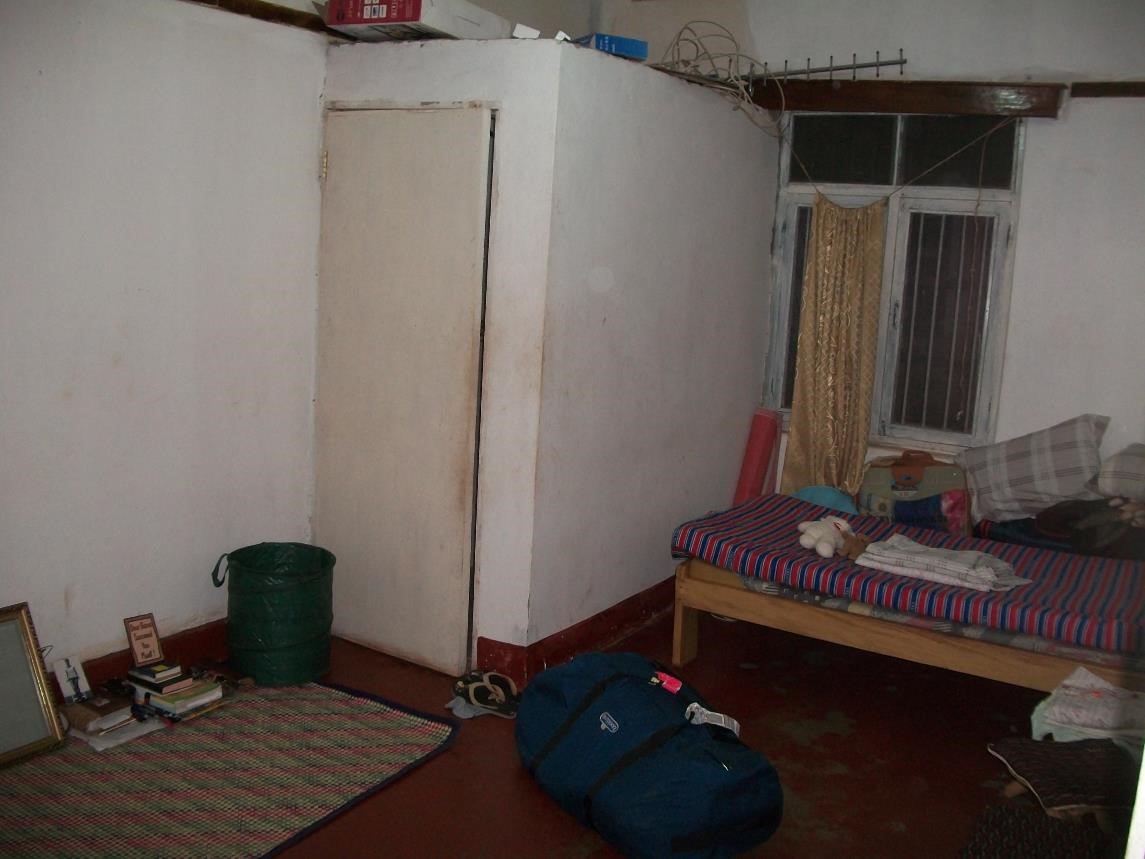
The driver-artist James and a typical stretch of road:
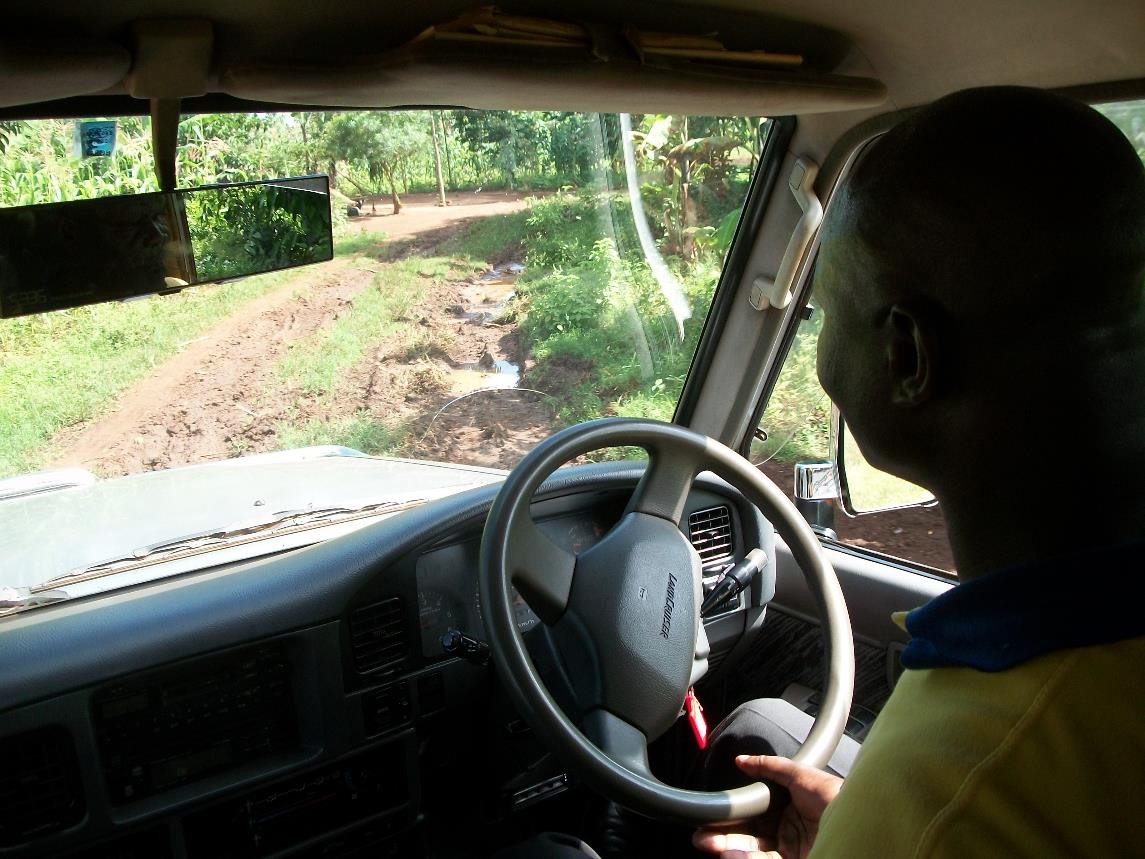
My salvation from certain starvation:

5.26.14
Just had a convo with Lisa, a Canadian nurse who has been here for a couple of years, and is doing some really interesting work with orphans and their families. The main idea of her organization is to make sure that kids never become orphans to begin with. It turns out that, according to this woman, 80% of kids who become orphans actually have someone who is willing to take care of them, but is prevented from doing so by financial hardship. In addition to this hardship, there is a demand-side incentive to separate kids from their families because it’s highly profitable; orphanages can bring in $5k-$10k per adoption in various fees. Another demand-side incentive is the starry-eyed and naïve attitude of people like me who once spent a few weeks with street boys and now want to start an orphanage and need clientele. So, financial hardship, profitability, and do-gooder naivite combine to needlessly split up families. This woman’s organization focuses on helping families keep their kids by giving them emergency housing for three months, providing social work expertise in order to help stabilize family crises, and otherwise preventing the kinds of pressures that lead to orphanhood. What an astoundingly sensible and excellent approach! Here is the website: http://abidefamilycenter.org/ . And the FaceBook page: https://www.facebook.com/AbideFamilyCenter .
Lisa also affirmed my desire/idea to try to do child and adolescent psychiatry in a setting like this. Apparently two of the most neglected areas of care among the poor in Uganda are addictions counselling and trauma counselling. There are very few people who are qualified to do this kind of work, and it is tremendously important because the need is so great. According to Lisa, almost all of the women in the slums of the bigger cities like Kampala actively prostitute themselves, and almost all of the children who go through orphanages are physically or sexually abused at some point. Additionally, alcoholism is rampant among these families. Lisa’s organization does not take these cases on because they do not feel qualified to handle the intense demands of that sort of work. Hearing her talk about the kids and the ways that abuse affects them was both heartbreaking and made a lot of sense. It takes years, apparently, to even get to a place of trust with the kids from which one can help them shed the denial and defense mechanisms that keep them from processing things. In the meantime, the trauma manifests itself in nightmares, depression, intense behavioral problems, and even medically as failure to thrive. The desire to forget about the pain often, ironically, drives the kids to run away from their adoptive families; the streets are a familiar place, and survival mode, even if unpleasant, feels like home. On the streets, the kids don’t have to deal with the process of learning to trust people and all of the wound-surfacing that accompanies it.
Wow. Amazing stuff.
5.30.14
I am on my way home from an African cultural show. The show featured tribal music and primitive African mating rituals. It all felt forced and stripped of proper context, kind of like being at a zoo. I wonder whether these pageants are rather more misleading than educational, whether they misrepresent African tribal cultures. Phrases that I wrote while watching the show: Jungle dancing, uncoordinated, unskilled, fake smiles, animalistic, base, sad and artificial, inauthentic and zoo-like. The entire show can be summarized as follows: the group of dancers divided up by sex and trapsed around the stage for two hours, each sex demonstrating one of its unique physical capacities. The women chose to demonstrate their capacity for shaking themselves. For two hours. The men exercised their capacity for jumping around. Also for two hours. At various points throughout the exhibition, the two sexes engaged in some sort of ritualistic mating drama. But the interactions were always predicated only on the most unrefined, base, artless forms of physical self-expression and animal lust. At no point did the players hint that they were driven by capacities beyond those of the beasts of the field, let alone by powers of intellect or the soul. Compassion, generosity, wit, culture, art, virtue, intrigue, plot, character, and theme were out; fatpad-shaking and high-jumping were the main orders of business tonight. This was brutality, pure and unalloyed. During the show, I pulled up The Iliad on my phone in order to counteract the corrupting effects of the inanity on my mind and soul. I eventually left early, escaped to our van, and plugged into Beethoven’s Sixth as a sort of emergency shock treatment to reorder my affections and resuscitate my higher faculties. I sincerely hope that the actual tribal traditions are not so base and vacuous, but perhaps they really are.
[Ed. Note: The following paragraphs are a collection of thoughts undergoing a piecemeal process of concurrent accretion and refinement. Contrary to journalistic conceit, I’ve gone back to this section multiple times over a couple of weeks. Some parts are bloated and flabby; others are starting to read with some flow. There are some good thoughts here, but the overall structure is still a work in progress. Please read mercifully.]
The show launched me into a deliberation about the relationship between native tribal culture and Western modernity (It’s not a difficult thing to do; I think about this stuff all the time even without prompting). A particularly harmful dynamic comes to mind. The main players are the average Westerner, the Western caricature of African culture, the African, the political correctness thought police, and Western capitalism. The setup goes something like this: the Westerner absorbs a caricature of African culture, much like the one portrayed on stage tonight and described above. The most current dictates of political correctness proscribe any kind of critique. The Westerner is therefore prohibited either to think critically about African culture, or to wonder whether the image he has is an accurate one. The caricature is sacrosanct and unquestionable. On the other side of the world, the African goes about his business. Whichever kind-hearted Westerners would come to the assistance of the hapless natives are blinded by the sort of caricatured shadow-play that I witnessed tonight, and paralyzed by the fear-mongering political climate that attends American culture, especially around Universities and bureaucracies. The American is lulled to complacency by a false sense of propriety (“I toe the line with regard to race rhetoric, therefore I am kind and good to black people and can comfortably ignore what is actually going on with them”), and does little by way of thinking critically about the problems that face Africans or actually trying to help them.
But why is it important to think critically about African culture? I mean, come on, haven’t we already done enough harm without judging them? The answer is yes. The West has wreaked, and continues to wreak a lot of havoc here. But I don’t think that we would be helping the Ugandan by going hands-off. The Ugandans have a lot going for them; in fact, I will argue that they have a great amount to teach us. But they also, I will argue, still need something from us by way of critique and encouragement. The argument goes as follows: The forces of modernity in Uganda threaten to chop society it into bite-sized individualistic people-chunks for ravenous consumption by the hideous Nation-State-Global-Corporation-Military-Industrial-Complex. Monster. What the West has loosed upon the land cannot be re-caged. It can only be conscientiously resisted. And I would argue that the only force in Western culture that is truly capable of resisting the modernity and the ravenous beasts that follow in its wake of carnage is the power of Christ, especially as it is mediated through His Holy Catholic Church. The local cultures of the various Ugandan tribes have a lot going for them, but they don’t stand a chance against modernity without the Church. Just like Catholics don’t stand a chance against modernity without local tribal culture. We need each other in order to survive.
OK. I know that this sounds far-fetched and tendentious, but hear me out a bit. The threat of the monster is real. Let us call it the Corporate-State Beast. This Beast has the potential to ravish Uganda, as it has ravished America, and reduce everyone to its slaves. Uganda, as most poor countries, is an advertisement feeding frenzy. No vista in all of Kampala, Uganda’s capital and largest city, lacks a prominent billboard or two or ten. You can’t listen to the radio for five minutes without hearing a string of violent, inane commercials that last for longer than the intervening series of songs; the music is inserted between commercials merely as a gesture, an attempt to keep up appearances. The culture of Kampala is comprised of scattered weak rural tribal remnants surrounded on all sides by consumerism. Instead of following the Liberal (both in the classical sense and the recent sense) impulse and “freeing” people to pursue all of their desires (which are easily and often coopted by corporate interests) the Westerner should look to helping them defend against modernity by bolstering the most important and authentic aspects of their own culture and supplementing it with the highest and best traditions that the West has to offer, the traditions that free people in the truest sense, that is, that free people to pursue the Good. The tradition of the Liberal Arts and of Catholic formation come to mind. The alternative is to leave them to the same unredeemed tendencies that once perhaps made for functional pagan society, but now form the basis for manipulation by Corporate-State profit-and-power-motives.
The premise of this line of reasoning is that people are more easily manipulated when their appetites are disordered. For example, if I desire to watch television more than I desire to be with my family, and spend my time accordingly, then my mind will be at the mercy of the networks, which, as many thoughtful folks realize, are controlled by corporate and State actors. Another example: if I desire to listen to other people (who are voluble) more than I desire to listen to God in prayer (who is silent), then I will fill my ears with noise in order to escape the silence, and buy a bunch of loud national corporate big-label music to do the trick. And another: If I desire to use pornography more than I desire to give myself to God or to my wife, then I begin to see people as objects for consumption and relationships as commodities and sex as a means for pleasure; the most intimate aspects of my humanity become negotiable and Market-able, and big-business items like porn and contraception and big-ticket political crowd-pleasers like abortion become not so absurd. Or consider how much easier the State can convince its people to go to war when they love petroleum energy and material comfort and security more than they love their enemies and those innocent people around their enemies who always suffer way more than anyone else in the bargain. Even something so simple as desiring junk food like chips and Pepsi more than the naturally healthy common Ugandan diet puts people into a corporately-dependent relationship; this may not seem significant to us, but food is a big deal here, comprising a majority of most peoples’ expenditures. The basic idea is that when people sin by loving a false image of the good (TV, bad music, porn, comfort, junk food, etc.) more that their good alternatives (human relationships, silent prayer, self-gift, self-denial, healthy food, etc.), they orient themselves away from God, Love, and the Good and towards other Masters. Everybody serves something; the choice is between a loving master who gives you freedom in return for your obedience, and a selfish master who enslaves and kills. Everyone makes their choice. The pitfalls of modernity are easy to make, and I think that without Church teachings on faith and morals to point out the traps, it is inevitable that people will persist along false paths towards destruction. Everybody makes false steps often, but the difference is whether or not we acknowledge our sin and turn back towards the way of goodness and truth. Those who can be permanently misled into false ways are the playthings of the powerful. Those who submit their affections and appetites to the purifying fire of the Sacraments and right doctrine have a chance, Lord-willing, of bravely resisting the foe.
(This, by the way, is why both the Right and the Left are both dead wrong. In simplistic terms, the Right thinks that the Market is a benevolent dictator, and the Left thinks that people’s passions are basically good. “Free the Market,” say the neo-cons, and the liberals want to unbridle everyone’s desires, no matter how potentially misled they are. Since a water-tight argument along these lines would take a book rather than this short cursory reflection, I will go ahead and make an appeal to the authority of various aspects of the Western Tradition and Church teaching in order to assert that they are both recipes for disaster.)
So now that Uganda faces the same modern tyrants that we do (the global corporation, the Empire, their own misdirected appetites, etc.), don’t you think that it behooves us to help them understand what they’re up against, and maybe even help them resist? I do. Otherwise, I think, they are dead in the water. Their tribal cultures have many arrows in their quivers and spears at their sides, but they need the heavy artillery of the Church in this war with big modern forces. My humble opinion is that the Church is the only really substantive countervailing institution in the face of modernity. Consider that there is no other entity more despised my moderns and more reviled and persecuted by almost every major thinker and government since the Enlightenment than the Catholic Church. A quote from John Henry Cardinal Newman about Her:
There is a religious communion claiming a divine commission, and holding all other religious bodies around it heretical or infidel; it is a well-organized, well-disciplined body; it is a sort of secret society, binding together its members by influences and by engagements which it is difficult for strangers to ascertain. It is spread over the known world; it may be weak or insignificant locally, but it is strong on the whole from its continuity; it may be smaller than all other religious bodies together, but is larger than each separately. It is a natural enemy to governments external to itself; it is intolerant and engrossing, and tends to a new modelling of society; it breaks laws, it divides families. It is a gross superstition; it is charged with the foulest crimes; it is despised by the intellect of the day; it is frightful to the imagination of the many. And there is but one communion such.
--An Essay on the Development of Christian Doctrine
Having the right enemies, of course, doesn’t make an institution good. What does make the Catholic Church good is that Jesus founded it, and said that the gates of hell shall not prevail against it. It alone offers the Sacrament of the Eucharist in its fullness, which is the most powerful manifestation of God’s humility, love, and power on Earth. And it alone presents a coherent cultural alternative to modernity. The Catholic Church offers a way of thinking about the human person and human life in their entireties; of understanding family life, civic life, and one’s role in the Church; of thinking about economics, poverty, birth, death, work, education, art, philosophy, music (OK, maybe not so much recently, but historically speaking the best music has been made by Catholics), not to mention sin, redemption, grace, God, and Heaven. To a superior extent, the Church incorporates doctrine and faith into a coherent, robust, thoroughgoing culture, a way of life. It answers the question, “OK, I am on board with the whole Jesus thing, but how then shall we live?” The people of the Church haven’t always, or even often, demonstrated the truly Christian way of living, but the answers are there. I think that in order to resist being subsumed into a secular, modern culture, it is not sufficient to merely deny that culture, but rather it is necessary to practice an alternative one. With the Sacraments, especially the Eucharist, at its source, the Catholic Church offers a truly Christ-centered, integrated, thoroughgoing, and incarnational alternative to modernity. The history of the Church for the last 500 or so years can be seen as an active rebellion against modernity, with much suffering and wounds to show for it.
So leaving the Ugandans to their own devices is not enough. But neither is leaving the Americans to theirs. We need the Ugandans in much the same way that they need us. This is the wealth of the Ugandan: he knows who his people are. He knows who are his family, his clan, and his tribe, and the bonds are sacred and permanent. Americans, by contrast, only rarely experience any thoroughly committed relationships. This is the way of modernity, to think and act like autonomous individuals rather than as members of a clan. One of my main lessons about life over the last few years is that the tribe is everything. When I have lived around long-standing, caring, committed friends, I have been happy. And I have been lonely, impoverished, and a shadow of a man when I have (briefly, thank God) been in contexts where I was alone and friendless, like when I was travelling. It turns out that one of the big secrets about life is as follows: always prioritize friendships when making decisions about where to live, what to do, etc.. This emphasis is what makes for happiness and provides the means to resist globalized consumerism. When you have your people, you don’t need as much stuff, and you can give the finger to capitalism. The Ugandans have the friendship and familiarity thing down. But through modernization, development, or whatever you want to call it, they seem to be at great risk of losing it. In the political realm, for example, the nation-state has an overwhelming interest in converting people from members of a particular tribe (Bugandan, Acholi, Karamojongi), with the full complement of communal identity and traditional roots, into members of the one national tribe as Ugandans. Just as the American Establishment liquidated the ethnic identities of the various European-American (Irish-American, German-American, Italian-American, etc.) tribes throughout the 20th Century by means such as the intentional disintegration of the Catholic ethnic enclaves via urban planning measures (see Jones, The Slaughter of Cities), so the Ugandan government employs various means to promote the national identity over all other forms of self-conception. In the process, the Ugandans are losing their tribal sense of being part of a people who have various strong allegiances and affinities with each other, predicated on blood and the land. They are moving towards a future of having one Master, in the State, whom they’ve never even met, and who doesn’t really care about them as individuals at all. And their relationships with each other are at risk of becoming so thinly attenuated as to be almost insignificant. I can say this with confidence because America has already gone down this road. The way that most people connect with each other in America is through a thin, national-scale, least-common-denominator culture, mostly shared through mass media in the form of watching the same sports, listening to the same corporate-produced national music, watching the same television shows, movies, and commercials, buying the same stuff, and talking about all of the above on corporation-controlled social media (Contrast this with the idea of a local culture and a local economy [click on the link for one of my favorite essays ever, by Wendell Berry]; it’s difficult to even imagine what such a culture and such an economy would look like, mais non?). We share nothing but what the powerful tell us to share; this malleability, in many ways, is what makes our economy and our State so strong. The State has an unimaginably powerful interest in keeping things that way; malleable citizens make for a malleable population, which makes for a supremely powerful State. In fact, the homogenizing forces (State-sponsored, corporate-driven, and otherwise) are so powerful that they spill over into other countries so that even they want what we offer, and everyone in the world is becoming American to some extent or another. The point for the current deliberation, though, is that when the sources of a shared life in America are so thin and meaningless (How could the least-common-denominator be otherwise?), then so are the relationships. Ugandans, on the other hand, have warm and deep ties because they share their lives together and still have small-scale local cultures and local allegiances; they have a lots of kids and live in big families (What makes people share life with other people more effectively than having to figure out how to live in the same room, house, and family with other people?), they stay married (What more purifying and self-less-ifying relationship could there be than marriage?), they live in crowded and intimately involved community lives in their cities and towns (You can’t swing a hyena without hitting someone in Kampala), they care for their old and sick and suffering (There are no nursing homes in Uganda), and they haunt each other even after death (Ugandans believe in a non-quite-dead-yet sort of afterlife where spirits roam around taking care of unfinished business, visiting people in their dreams, trying to find their way back to their home villages if their bodies are not properly buried there, etc.). The true interests of the people are opposed to the interests of the State in both Uganda and America, and the State is threatening to prevail in Uganda as it has already prevailed in many ways in America. If the people in either context prevail, it will be because they maintain their commitments to each other, in the context of coherent local traditions. But, as I argued above, they also need the strength of the Sacraments and the teachings of the Church in order to resist the State’s assault on human appetites.
[Side note:] The way that the State lures people away from their commitments to each other and to their communal duties is by appealing to the appetites for money, power, and pleasure. Geographically, this allurement takes the form of urbanization. In the city, people can think and act like autonomous individuals, whereas in the village they are inextricably part of a broader social fabric. T. S. Eliot’s haunting words come to mind:
When the Stranger says: “What is the meaning of this city?
Do you huddle close together because you love each other?”
What will you answer? “We all dwell together
To make money from each other”? or “This is a community”?
--Choruses from the Rock (click on link for full poem; well worth a read)
Without recovering local tribal cultures, like the Ugandan has, Americans will only plunge further down the path that the Ugandan is just now setting upon.
This deliberation is getting scattered and attenuated; I am bringing too many strands into this discussion--urbanization, local tradition, the State and appetite--to treat any one well. Let me try to pull it together a bit. My main point is that the trajectory of modernization in Uganda is away from a local, traditional, small-scale, tribal, coherent, relational mode of life in the village to a national, progressive, large-scale, State-centric, relativistic, individualistic mode of life in the city. The State and large-scale corporate entities have an interest in promoting modernization because the process severs people from competing allegiances--tribal, familial, religious, etc.. Whereas many consider modernization to be desirable and progressive, citing its capacity to alleviate material poverty, I argue that modernization actually introduces more profound and grave forms of poverty, namely relational poverty, spiritual poverty, and cultural poverty, among other forms. State and corporate interests lure people away from their relationships and duties by promising wealth, pleasure, sex, and enlightenment. One need only watch a few commercials and look at a few billboards to see how the logic of modernity proceeds--buy this car, and you will be like God. The way to resist this allure is by recourse to Jesus’ guidance and grace, especially through the teachings of the Church and her Sacraments. No other power in the world can effectively grant victory over the enticements of sin and the death that is their fruit. I do not think that it is enough for the Ugandans to attempt to go back to their local, tribal cultures. While they should certainly try to recover their relational way of living and the traditions and practices that sustained that way, they also need the power of Christ and his Sacraments and the wisdom of the Church to resist the allurements of sin in their own hearts and in their own cultures, and to resist the individualism that is the result of sin, along with all of the other traps of modernity. The temptations of the modern age are extremely powerful and potentially overwhelming; the Church is a bastion against them. Similarly, we in America need to learn from the Africans how to cultivate local tribal cultures. And we need to do it soon, before the African cultures disappear.
A great quote comes to mind, from Pope Pius XI:
When we speak of the reform of institutions, the State comes chiefly to mind, not as if universal well-being were to be expected from its activity, but because things have come to such a pass through the evil of what we have termed "individualism" that, following upon the overthrow and near extinction of that rich social life which was once highly developed through associations of various kinds, there remain virtually only individuals and the State. This is to the great harm of the State itself; for, with a structure of social governance lost, and with the taking over of all the burdens which the wrecked associations once bore, the State has been overwhelmed and crushed by almost infinite tasks and duties.
--Pope Pius XI, Quadragesimo Anno.
For another pertinent quote from E. M. Jones, click here.
In much more superficial news, I found the most intensely sick, twisted, wicked, awesome acre of land in all of Africa today. Next to the PCAU offices is posted the following sign:
(Snake Park sign pic forthcoming)
After a week or so of being intensely intrigued, I finally had time to follow the twisty dirt road on the back of a motorcycle taxi (“boda-boda” in Ugandan) to the place where the most accursed and fascinating creatures slither and smiles are even guaranteed (see bottom of Park sign pic). It was totally rad. There were fifteen or so little huts with plexiglass windows, along with five or six open-air cages. The guy kept on offering to take the snakes out so that I could get a closer picture, which offer I usually declined. In order to produce a more stimulating experience, the dude would poke the snakes to get them riled up and in a mood to strike. My boda-boda driver and I were the only people around, so we got a lot of showmanship and patience out of our guide. My favorites were definitely the Egyptian cobras (see pic below). They were HUGE. And pissed. And like blue and shiny. And really aggressive. PETA would certainly have a fit about this; I’m not so bothered, though, as I have little sympathy for serpents, their being so accursed and adversarial and all.
The Egyptian cobra (The pic does not convey scale [ha!] very well. Picture it six feet long, and standing about as tall as a mid-sized dog).

Here’s a Forest Cobra, which is, according to our guide, the most dangerous of all the snakes. These guys stand right up, about three feet high, and definitely mean business. Sorry about the glare.

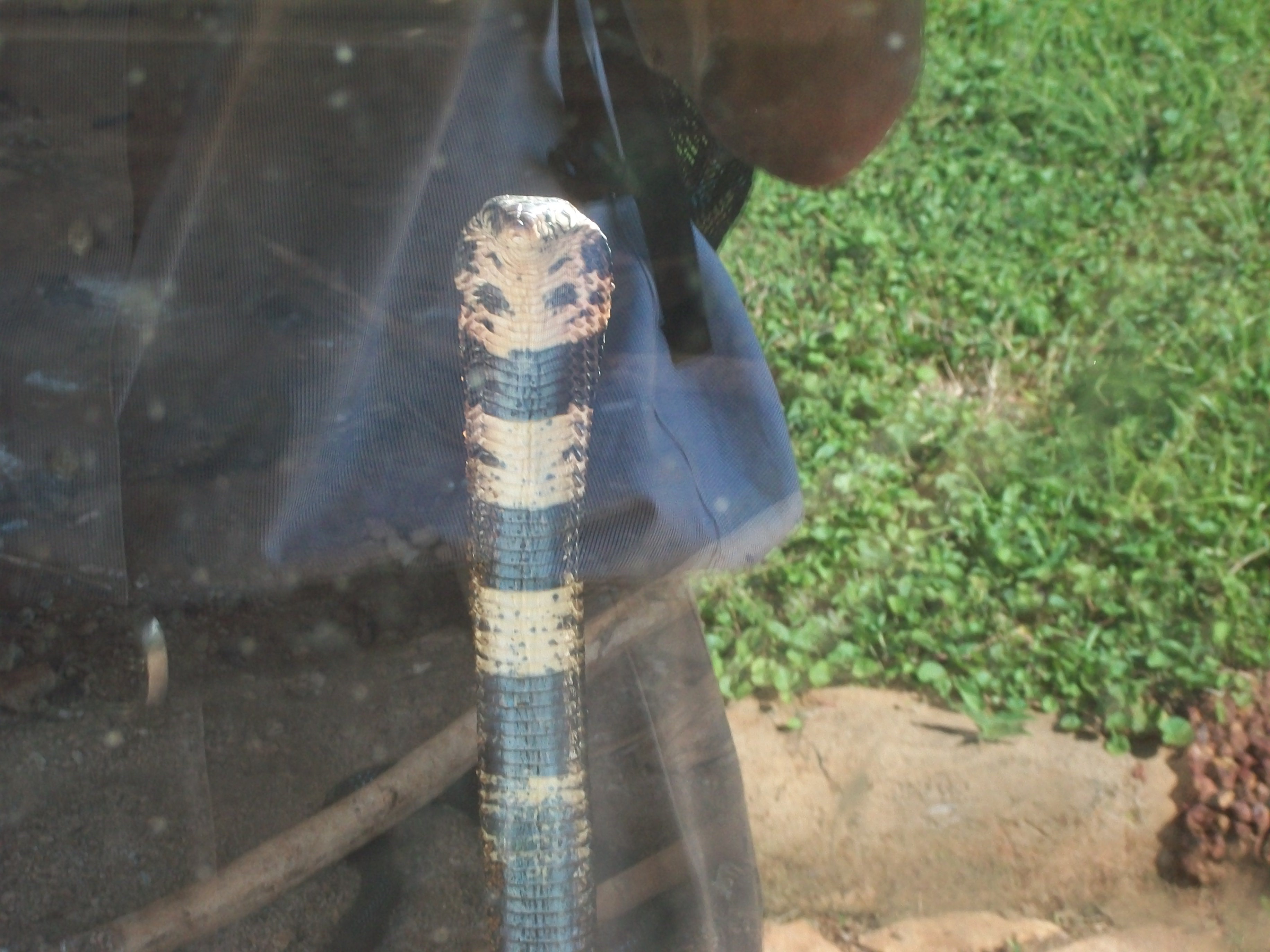
And here’s a Rhinocerous Viper:
 Please note the rhino horn:
Please note the rhino horn: 
This is a photo series from a video that is amazing, but too big for posting. The idea was to fish a 15’ python from of the pond, drag it out, and then piss it off enough to make it strike.
The fishing: 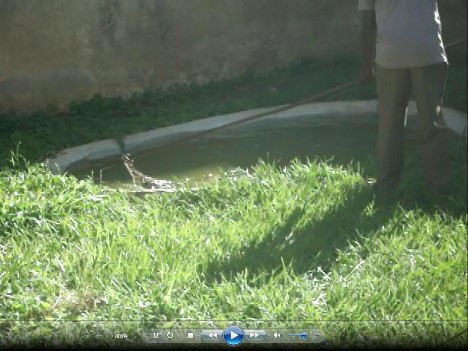 The dragging:
The dragging: 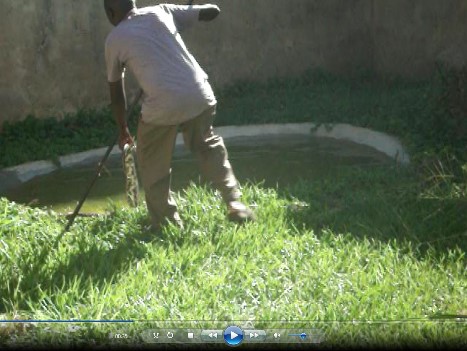
The python strikes back:
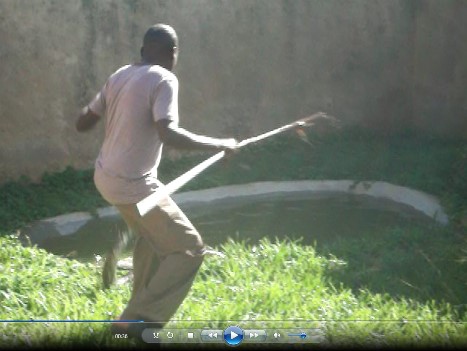 Dragging attempt #2:
Dragging attempt #2: 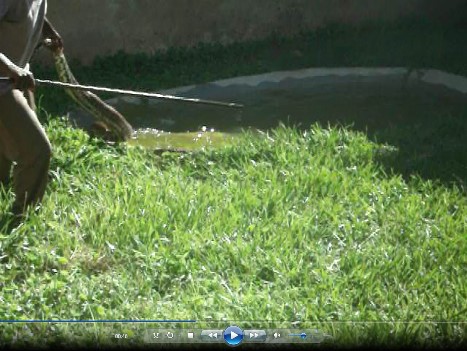
Our guide dances around to elicit a strike:
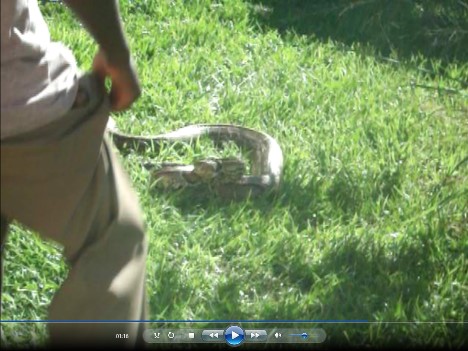 Sick!:
Sick!: 
The thing about pythons is that they have really sharp teeth, but they don’t inject (much) venom. Instead, the python latches onto its victim with its mouth, wraps its body around it, and then squeezes the hapless sap until it cannot inhale.
And finally, the guy dragged a regular old viper out of its cage for a brief little slither. A few facts about the family Viperidae follow, for your herpetological enlightenment. Contrary to popular depictions and branding associations, the vipers are usually a rather sluggish and uninspired crew. This guy was no exception. Another surprising viper fact: they give birth to slithery snake babies instead of snake baby eggs. In fact, the word “viper” is derived from the Latin words vivo = “I live” and pario = “I give birth.” Unlike the python, vipers do inject. A word about viper venom from the Wikipedia article entitled “Viperidae”:
“Viperid venoms typically contain an abundance of protein-degrading enzymes, called proteases, that produce symptoms such as pain, strong local swelling and necrosis, blood loss from cardiovascular damage complicated by coagulopathy, and disruption of the blood clotting system. Death is usually caused by collapse in blood pressure. This is in contrast to elapid venoms that generally contain neurotoxins that disable muscle contraction and cause paralysis. Death from elapid bites usually results from asphyxiation because the diaphragm can no longer contract….
Proteolytic venom is also dual-purpose: firstly, it is used for defense and to immobilize prey, as with neurotoxic venoms; secondly, many of the venom's enzymes have a digestive function, breaking down molecules in prey items, such as lipids, nucleic acids, and proteins. This is an important adaptation, as many vipers have inefficient digestive systems.”
Out for a slug-like, creeping slither:
 Not actually like this:
Not actually like this: 
The grab:
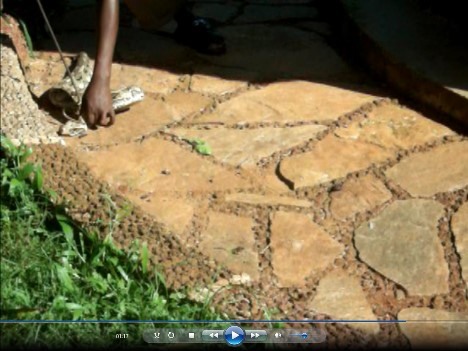 For your sense of scale [!]:
For your sense of scale [!]: 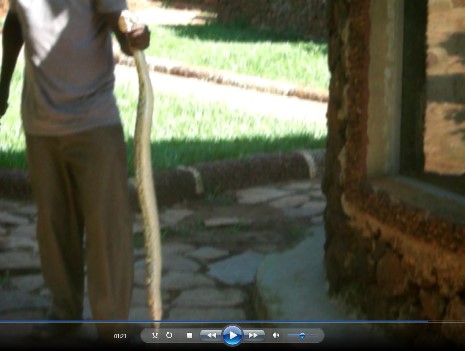
In the morning, I attended a PCAU monthly conference. This month’s theme was the ethics of palliative care, which you’d think would be really interesting. Or rather, I would think would be interesting…for me…given my interests in bioethics. I expected, though, what was actually the case, namely that the presenters would merely pull a page out of the Principlism handbook and follow it to a letter. Chalk another one up for Beecham and Childress, all the way over here in Africa. (Sorry; I am being a little bit inside here. B and C devised a way to reduce all bioethical considerations to four words, namely Autonomy, Beneficence, Non-maleficence (sounds redundant, huh?), and Justice. Bioethics on a business card. It’s totally lame and wildly popular. They make gajillions of dollars publishing texts and hosting seminars to train all manner of medical professional in their method, which amounts to bureaucratic procedure calculated to promote patient autonomy above all else, especially above any absolute normative ethical standards; the parties deliberate about the four principles until autonomy rises to the top and the patient or the proxy makes a decision that might or might not be a good one. But who is to judge when absolutes are out the window?).
5.31.14
This evening was the best time so far in my trip, and maybe for the past few years or my entire life. Whoa. Yeah. The apex was sitting on the floor in a 10x10 concrete room with 20 street boys, one candle, and my Ugandan friend David on the electric piano leading praise and worship in Luganda while the boys sang and prayed their hearts out. It was the beatific vision. Or maybe the closest I’ve come so far.
I ran into my South Bend friend Brittany and her Ugandan friend David on a rafting trip last weekend. She told me about her street friends in Kampala and welcomed me to come and see, so naturally, I made an excuse to move there for a couple of weeks. We met close to my place, and made our way to the slums of this already slummy city; so, like, the slums of the slums. The kids. Oh, the kids. My heart is full of them right now, so it’s kind of difficult to get it all into words. But I’ll try for a bit. One of David’s friends lives in the slums and opens his house to 20 or so of the boys for camping out at night. We went to his house, met some kids briefly, and then made our way to a slum market place where a bunch of high-school-aged guys flocked around us and introduced themselves. The really heartbreaking thing is that almost all of the guys over 13 or so were high on glue and gasoline fumes. They carry it around in small water bottles tucked into their sleeves and sniff it constantly to stay buzzed. So tragic. Some of them were really bombed out, while others were just sort of hazy. They all wanted to talk to the m’zungus, and we carried on for about half an hour. Then we walked through a field at an elementary school where a lot of the dudes hang out and play soccer and stuff. I got into a tug of war match with a few of the younger pre-adolescent guys who were not high and a lot of fun. I gave a lot of shoulder rides. We made our way back to the slum house, and served some dinner that we had grabbed on the way over. The playing got a lot more fun as the regular crew of 20 gathered for their weekly Saturday night bible study. Lots of learning elaborate handshakes and tickle attacks and stuff like that. Some of the guys just wanted lean on me and have an arm around them. One of the dudes asked for a back massage which became the cottage industry for the rest of the evening. The waiting list remained healthily populated until I left. The bible study started up with about 40 minutes of P and W, wherein the boys really belted it out, prayed so much and so hard, and lifted their amazing huge/little hearts right up to Jesus. Then one of the leader types gave a lesson, they prayed and we went. The whole thing lasted an hour and a half or so. Heaven on earth.
I will make these boys and boys like them a big part of my life somehow.
I had the opportunity to talk to David about the boys and their backgrounds a bit at dinner beforehand. David is about 21 and has been working with the dudes for about 5 years. He is a really serious and sincere Christian, and has a tremendous commitment to the guys. He grew up an hour or so from here. I asked how they end up on the streets, and he said that a lot of them have run away from home for various reasons. Many of them experienced abuse in their homes, either beatings or sexual abuse. A lot of the kids come from poor backgrounds, predictably, but others come from wealthy backgrounds where they were mistreated. I also asked whether any of them make it off of the streets, and David responded that when they do, it is usually through church involvement. Much, much more could surely be said about everything, and perhaps I will learn more as I try to work with the kids more and more.
Praise Jesus! Please pray for these guys! Like crazy! I don’t know a lot of their names at this point, but I will try to share some names and profiles as I (hopefully) get to know them better.
General note: You might have noticed that I haven’t been talking much about my work. There is a reason for that. I don’t yet know how to present the stuff that I have seen to a general audience. Suffering and pain and really personal and intimate interactions with people are sort of dear and private and sacred, and I haven’t felt comfortable spouting off about them in public yet. If you are interested, feel free to shoot me an email asking about the people and the work. I will hopefully be able to express myself better in the privacy of a personal conversation, and that process might help me figure out how to talk about things on this journal.
6.2.14
I got violently ill last night. It was/is one of the best things that could have possibly happened to me. God laid me flat, and I so needed it. I’ve been wanting to pray more, needing to pray more, but haven’t done it. There’s nothing like sleepless nausea and endless bathroom trips to bring us to our knees, in all the possible senses. I prayed the name of Jesus constantly, and for all of you, and for God’s will in all of this totally nutzo stuff He’s been revealing to me over the last few weeks. The hospice patients, the street boys, the life, the career, my family and tremendous friendships, everything. So good.
Yesterday I had two great convos that I will mention briefly, if only to bookmark them. The first was at lunch with Br. Francis, an 80-or-so-year-old member of the White Fathers community in Kampala, with which I am camping out these days. The main topic of the convo was development. Br. Francis is from the Netherlands originally, but has spent the last 50 years or so (!) all over Uganda as a missionary. His work has been focused on giving people the education and tools that they need to run sustainable farms and to work in various technical professions. He’s started many operations all over the country. One of the most interesting principles that he brings to bear on his work is that he tries to avoid using western money. For instance, somebody recently offered him around 250k Euro for his work; he only took about 12k of it. His rationale is that the people can’t maintain the big ticket items that the big donations buy. Big buildings and fancy new machines end up being more of a burden than help. On the other hand, if the people have to work for the money to buy the stuff, or go into a bit of debt for it, they buy only what they actually need and what they actually can use and maintain. For example, the western mentality decreed in 60’s that ox carts were backwards, and that it would be a big help to the people if we bought them some trucks. But when things fell apart under Idi Amin Dada, the trucks became useless as the infrastructure needed to maintain them disintegrated (petroleum lines, repair shops, parts manufacturing, etc.). By that point, the ox cart infrastructure had also been scrapped, along with the good jobs that constituted it (blacksmiths, wheel-coopers, carpenters, etc.). So, thanks to well-meaning, but ill-conceived, western aid, the people were impoverished even further. Br. Francis has a prophetic sensibility, born of years of hard experience, that people shouldn’t own what they don’t earn. Another anecdote: he spoke of living in a bus on a farm property for a year or so as the farm was starting up. The idea was to make the farms productive first, and only then, to buy houses with the hard-earned money. This way the people avoid debt and make good decisions about what sort of house they can reasonably afford to build and maintain. Br. Francis also spent a large part of his career setting up and teaching in vocational schools. He mentioned that the five main subjects were metalworking, carpentry, mechanics, electricity, and plumbing. Br. Francis did all of this in connection with the charismatic movement, which connection doesn’t make much sense to me, as I am totally unfamiliar with the idea. But what came across when Br. Francis was talking about the movement was that he thought it important to de-emphasize the emotional aspects of charismatic experience, and subordinate them to fruits of peaceful and quiet contemplative prayer. What a tremendously life and a fabulous man!
Oh, and another great thing about Br. Francis is that he tries to walk as often as possible, instead of taking the car. His reason: when you walk, you meet people and see how things are on the street. When you drive, on the other hand, you miss so much. Driving one’s own vehicle is a luxury in Uganda, so it’s kind of like using one’s wealth to fly over the rabble. It breeds a sort of mutual disdain between the drivers and street people; when we were stuck in traffic a couple of weeks ago, our driver told us to quick, roll up your window because the street people and beggars and such will reach in and take your phone and slap you (pretty funny to imagine, but definitely not good). The mutual animosity is surely avoidable by taking more humble modes of transportation. When our coach driver speeds recklessly through really poor villages and neighborhoods, narrowly missing numerous folks, usually kids, I am reminded of a scene in A Tale of Two Cities (click the link to read the passage) wherein the Monseigneur’s coach kills a poor child. It’s a pretty serious and dark passage (preceded by a scrumptious and hilarious one about the Monseigneur and his chocolate men), but worthy of keeping in mind, given the risks involved with my own carriage habits. It lays bare the attitudes that a lot of us can easily adopt with regard to the poor in poor countries if we are not careful. It’s really easy (and fun) to flex one’s spending power in poor countries by paying what we would consider average American prices for really nice meals, accommodations, transportation, etc., but it breeds a lot of arrogance and often ends up harming people in both subtle and not-so-subtle ways, like in Dickens. The lesson could easily be extrapolated to the international level, to the way that Americans relate economically and militarily with poorer folks in other nations. It is a much more indirect sort of carriage cruising, but one that bears a direct similarity, by analogy, to various aspects of American foreign policy.
The other convo, at dinner, was much more brief. Michael is a young Aspirant (the first stage of religious formation) from a poor district in the North of Uganda. We got to talking about America, and it bewildered him, as it does so many other Africans, that Americans don’t have tribes. He asked, with a quizzical look, something like “How do you know anything about a person if you don’t know his people?” How indeed, Michael. How do we know anything about ourselves if we don’t know who our people are?
I suppose that in America we have to make up our tribe as we go. I guess the Catholic Workers form a sort of clan. By African standards, though, we are only loosely affiliated since we don’t share blood and we don’t share the land. By American standards, the Catholic Worker commune is about as solid as things get, this side of marriage and religious life. Even these last two institutions, though, still entail mere professed commitments. Someone’s self-invited vows are thin compared with blood ties. As I mentioned above, Africans think that after death the soul will be unsettled unless the body makes it back to the home village. The attachment is absolute and non-transferrable. They have a radical sense of Home.
6.3.14
Today is the Feast of the Ugandan Martyrs in the Catholic Church throughout the whole world. It is also the 50th anniversary of the canonization of the martyrs. It’s a big day for the country, so much so that the country has shut down and everybody has headed to the Shrine of the Uganda Martyrs in Namogongo, just outside of Kampala. When I say everybody, I mean that all of East Africa has been flocking here…on foot. Folks have been walking for months from as far as Rwanda and Kenya. The pilgrims have been ubiquitous along the roadsides around here for the last few weeks. I visited the shrine back on 5.17.14, and wrote about the martyrs in my entry for that day. Click here to go to that entry, here for a good background article from America magazine, and here for some profiles of the martyrs. I include below a homily by Pope Paul VI, delivered at the canonization of the martyrs in 1964:
“The African martyrs add another page to the martyrology – the Church’s roll of honor – an occasion both of mourning and of joy. This is a page worthy in every way to be added to the annals of that Africa of earlier which we, living in this era and being men of little faith, never expected to be repeated.
In earlier times there occurred those famous deeds, so moving to the spirit, of the martyrs of Scilli, of Carthage, and of that “white robed army” of Utica commemorated by Saint Augustine and Prudentius; of the martyrs of Egypt so highly praised by Saint John Chrysostom, and of the martyrs of the Vandal persecution. Who would have thought that in our days we should have witnessed events as heroic and glorious?
Who could have predicted to the famous African confessors and martyrs such as Cyprian, Felicity, Perpetua and – the greatest of all – Augustine, that we would one day add names so dear to us as Charles Lwanga and Matthias Mulumba Kalemba and their 20 companions? Nor must we forget those members of the Anglican Church who also died for the name of Christ.
These African martyrs herald the dawn of a new age. If only the mind of man might be directed not toward persecutions and religious conflicts but toward a rebirth of Christianity and civilisation!
Africa has been washed by the blood of these latest martyrs, the first of this new age (and, God willing, let them be the last, although such a holocaust is precious indeed). Africa is reborn free and independent.
The infamous crime by which these young men were put to death was so unspeakable and so expressive of the times. It shows us clearly that a new people needs a moral foundation, needs new spiritual customs firmly planted, to be handed down to posterity. Symbolically, this crime also reveals that a simple and rough way of life – enriched by many fine human qualities yet enslaved by its own weakness and corruption – must give way to a more civilised life wherein the higher expressions of the mind and better social conditions prevail.”
Uganda Martyrs, Pray for Us! Especially that we may be so bold in standing up for the weak and vulnerable, and living out our faith no matter what the consequences.
6.4.14
Last evening, on the Feast of the Uganda Martyrs, I made the trek to the Shrine along with the rest of East Africa. By the time I arrived, the festivities were over; there were still tens of thousands of people there, but few of them were praying. Most were mulling around, checking things out, selling holy paraphernalia, people-watching, etc.. I managed to make into the Shrine, buy some Rosaries, say some prayers, and basically say that I was there. The trip would have been of questionable merit in my book if I had not taken the following picture:
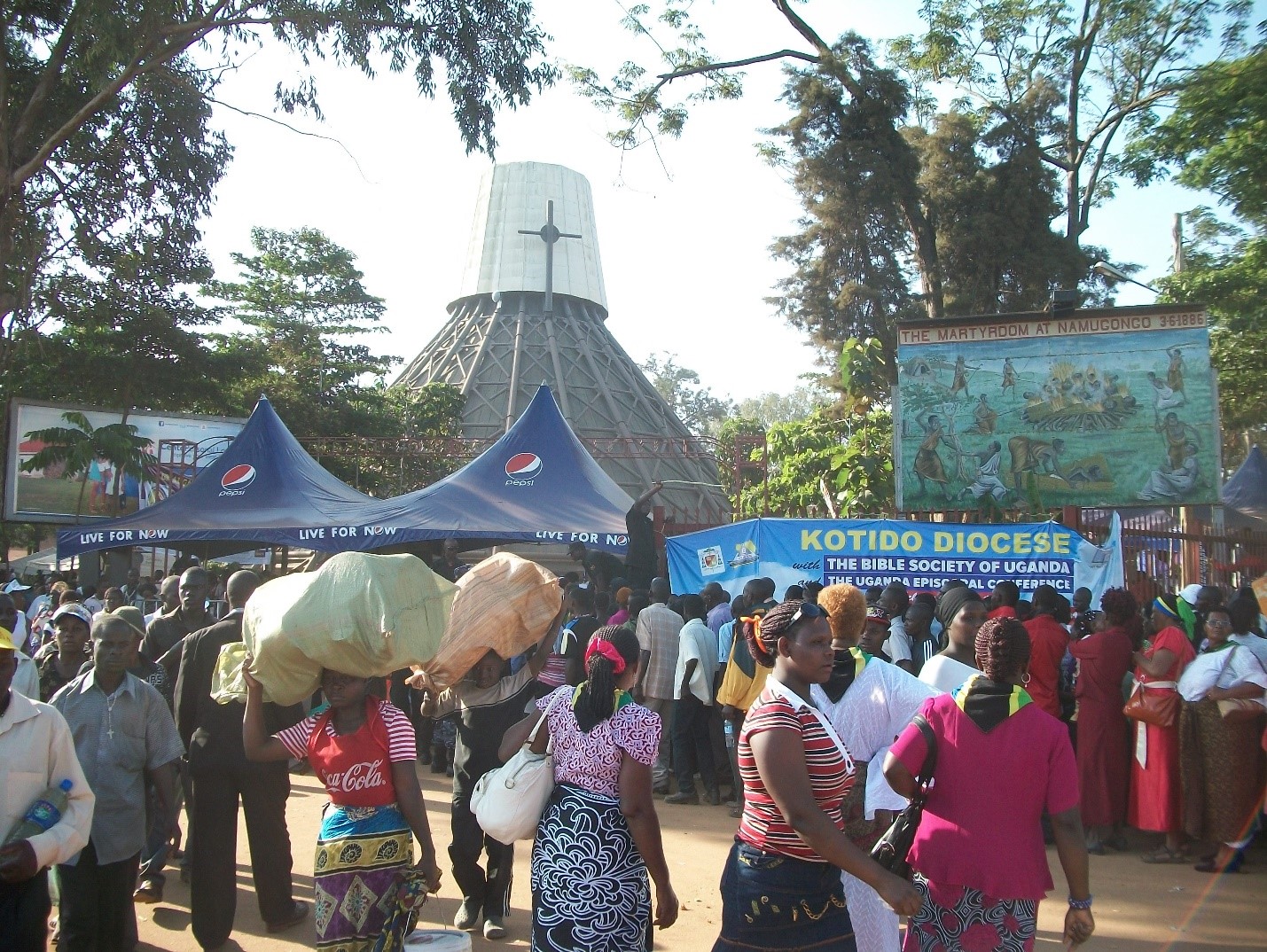
I could not have staged, or really even imagined, a scene that so succinctly conveys a couple of Uganda’s most ironic and regrettable aspects. And the fantastic thing is that this scene, minus the police brutality, was pasted on the front of a national newspaper.
Please observe the following:
1) Shameless ad placement and rampant commercialism. As I mentioned on 5-30-14, advertisement is ubiquitous in Uganda; the country is a marketing feeding frenzy. Where money is tight, global corporations like Pepsi have can have their way with the people. Everyone has a price, and I wouldn’t be surprised if the temple guardians went pretty cheap. Once inside the gates, a pilgrim is bombarded by further commercial assaults in the form of endless stalls selling holy paraphernalia like Rosaries, medals, cards, etc.. Fortunately for me, there weren’t any whips of cords lying around; the whole thing put me in a mood for some cleansing.
2) Tragico-ironic ad content. Please reflect for a moment on the significance of the Pepsi slogan in the context of a Feast celebrating martyrdom.
3) Police reluctance to spare the rod (center of photo). It would not be unfair to say that the government is heavy-handed with its people. As I mentioned in my conversation about the Catholic Worker in Uganda, human rights are rather suggestive than substantial over here. What really just tops the whole thing off is the image of the martyrdom, bottom left (see 5.17.14 for an enlarged version). Can you believe it?! Same pose, same government officials, same victims a century and a half later—and at the very event that is meant to commemorate the oppression!
I would like to be able to put all of the pieces together somehow and explore what goes on in Ugandan society to make this sort of thing possible, but I’m really at a loss. Either the people see the irony and reluctantly go with it because they must. Or they are insensible to the problematic nature of these phenomena, perhaps because it’s just the way things are, they can’t imagine the alternative, and it’s just easier anyway to not think too much and go with the flow. It is certainly one of the great burdens of poverty to have advertisements screaming at everyone all the time, and to be constantly reminded by unfettered police jurisdiction just how narrow are the limits of free action and expression. The overall effect of both the advertisements and the police is surely to preclude the sort of interior dispositions of mind and heart that allow people to be truly free—free to consider desirable alternatives, free to imagine what resistance would even look like, free in the highest sense of the word, namely to pursue the Good. The influence of the ubiquitous billboards, blaring radios and loudspeakers, and pervasive company logos, compounded by a lack of education (in Literature, History, Philosophy, Math, the Liberal Arts, the subjects intended to make citizens free), ensure a noisy and cluttered interior life, while police violence ensures a constrained and restricted exterior life. What the marketing fails to accomplish in the mind, the police accomplish in the body through violence, and in the heart through fear.
6.5.14
We went into the slums again for Bible Study tonight. The structure was much the same as last time. We palled around for a bit for starters. I was greeted by tickle attacks from all sides, full-scale, highly-coordinated, 14-handed retribution for my previous tickle offensives. In the wake of the carnage (their tickle thresholds being a good deal lower than mine) I became aware of one guy’s quietly imploring presence in particular; Peter was very keen that I should hear him recite from his lesson book, which I gladly did for a half an hour or so. The lessons: The National Parks of Uganda and Plant Classification. Please see below:
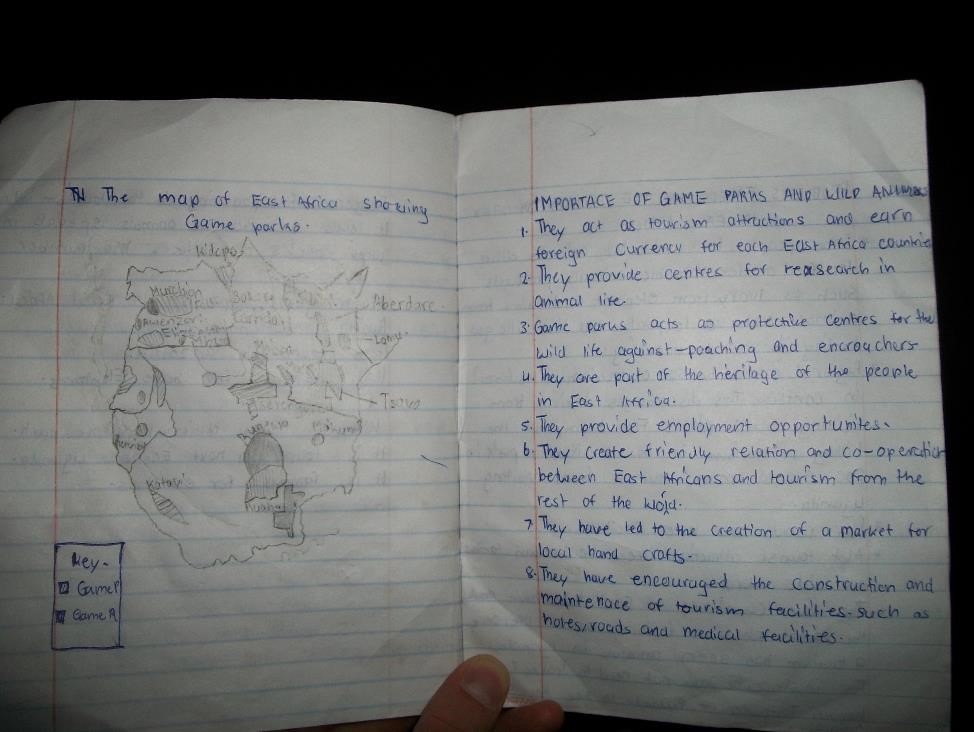
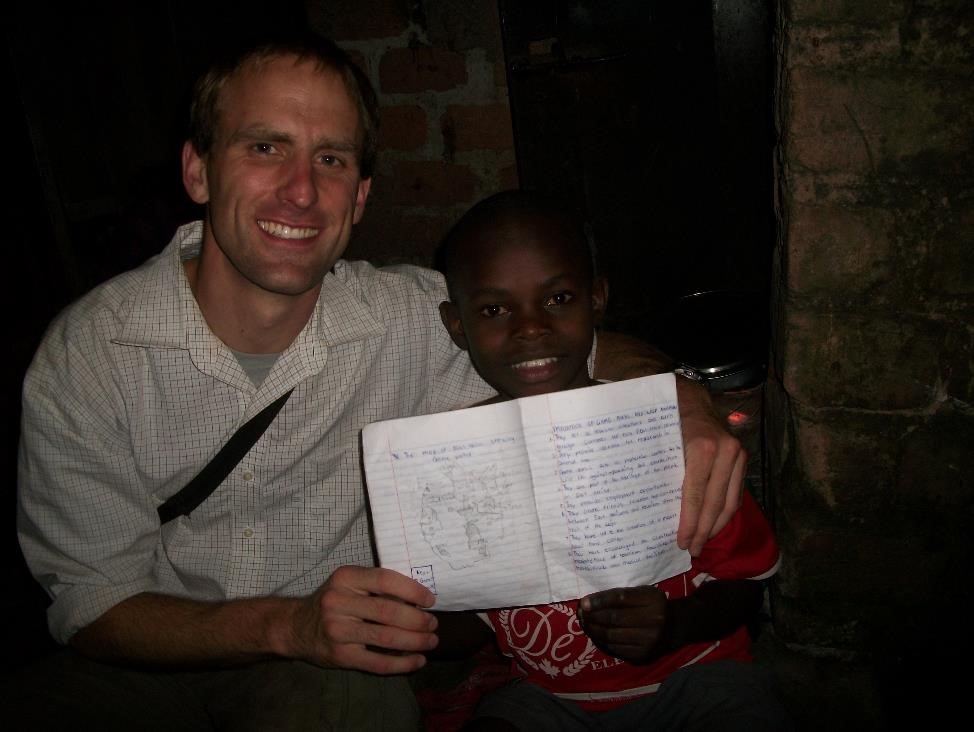
The dude just needed some encouragement. Without words, without vehemence or imposition, he pleaded for attention and care with his eyes and from his heart to mine. YES, Peter. This is so good. WOW, Peter, you are very smart and a very good student! Peter is, as a matter of fact, quite precocious. At age 12, he is reading in English, a second language, almost perfectly; “Dicotyledenous” rolled off without so much as a bump. Peter is capable of this without even having been in school; the lessons are a sporadic part of David’s and his friends’ ministry. Without a home, and without much by way of personalized classroom attention, Peter’s need for a listening ear, warm encouragement, and words of affirmation is a great, wide, glaring hole in the universe, and he quietly revealed his need to me in his sweet and guileless and heartbreaking eleven-year-old way.
After receiving Peter’s lessons, we were called into the small room to sit down for Bible Study, whereupon the back massage requests flooded in. I was thus happily employed for the rest of the evening. Amidst the kneeding, pressing, de-knotting, and re-posturing, though, I was able to join the crew in some intensely personal and soul-filled worship. They belted their hearts out, as before, and the most precious offering on earth that night went straight up to God. Their leader David honored me greatly by asking if I would share how my day was and give them a word of encouragement. I reached into my 3rd Grade Sunday School tool-belt and pulled out my very favorite act-outable analogy, about how much God loves us and just wants to be with us and give us so much happiness and joy and every good thing, and how sin is turning away from Him and walking away from the light and choosing loneliness, darkness, sadness, and pain.
It sounds like a pretty clear-cut, slam-dunk lesson, right? I mean how much more basic can you get with the whole God thing? On the contrary, though, the situation re-poses for me one of the most intensely difficult problems that I have ever encountered in my life. In question form, it would go like this: How can we tell people about God’s love for them if they have never or only rarely experienced human love? And specifically, What possible good can it do a kid to talk to him about God’s fatherly love if he has never had a dad? From start to finish, Christianity employs the language and analogy of family; how can one communicate about the faith outside of that context? This question first stared me in the face on a short-term mission trip to Peru when I was in Middle School, about 20 years ago. I vividly remember the specific street boy about whom I had the thought, a boy of about ten or eleven who was non-communicative, closed in on himself; I realize in retrospect that he was probably the victim of some terrible abuse. The rest of the boys would at least chum around with us, play soccer, etc., and by that relationship we hoped, in our generous yet naïve and short-sighted way, to witness Christ’s love to them. This one boy, however, was distant and unreachable by us. When I saw him sidle up alongside our host, a long-term ex-pat missionary in his 60’s who had dedicated decades of his life to the place and to the kiddos, I realized what it takes to really preach the Gospel to these kids, or anyone else I suppose. The question has haunted me ever since, about words and language and relating the faith to people who don’t have much love, and who even lack families. What can the words “God loves you like a Father” mean to a street boy? It seems that the harsh and dreadful answer is that conveying love to kids in words and in images, preaching the Gospel to them, is nothing without love in action, and the labor and the fortitude and the complete science that Zossima talks about. A clanging gong, a resounding cymbal. Parents surely know this labor; I have only seen it from a comfortable distance. I suppose that all acts of parenting are acts of hospitality to otherwise homeless children. God bless parents! And God bless the kiddos who live without parents. The question of what is to be done for them baffles me endlessly, and going into the slums feels like wafting one small droplet of water into a Grand Canyon of need, almost like a joke or a parody or something. If there is any value in my hanging out with the boys, it will probably accrue by my imagining how to actually be of long-term help in the future. Until then, though, my words about God’s love will continue to feel hollow and baseless. Or maybe, by some miracle, God will fill in the gap between word and meaning somehow. I will pray for it, but I will also keep trying to figure out how to go about it myself, God helping me.
The night ended with some weeping. One of the boys had tripped and fallen on his front teeth a couple of weeks ago. They were almost completely chipped off, the nerves were exposed, and he was in a lot of pain. What was to be done? Dental work was out of the question, and we didn’t have any pain meds besides some Tylenol. We gave it to him and said some prayers over him.
One of my dear-souled sister-friends wrote the following penetrating words, after reading my entry about the guys on 5.31:
“I love, and hate, that they so desperately needed to be near you. It's clear, just through the window of your words, that they need the very first things - touch, warmth, embrace...unconditional love from the start. Shelter. Father. Mother. Food. Tickling, playing, praying. I love to imagine their praying! The light of the candle. The way you were sitting there in the middle of it all….
…Your kiddos remind me of our guys here at home. At OLR [Our Lady of the Road, the Catholic Worker’s Drop-In Center] this morning, so many high, stupidly angry, wasting-away men. Drugs and knives in their pockets. Eyes glazed over. Desperate for those very first things. And now, after lives lived lacking, your boys are all grown up, wandering around, with no where to go and nothing to do and no one to go home to, just trying to beat heartache to the finish with chemicals and hate clotting their veins.
Oh oh oh... how precious, this life. How short and sweet and painful. Such responsibility! Such profound invitation. Every soul. Eternal.
Sun and rain, bless the Lord.”
What is there to say?
Come, Lord Jesus.
Some more pics of the kiddos (please note that they were way into the snapping; I thus did not violate my policy of photographic voluntarism, in case you were wondering):
Regan and Swaib:
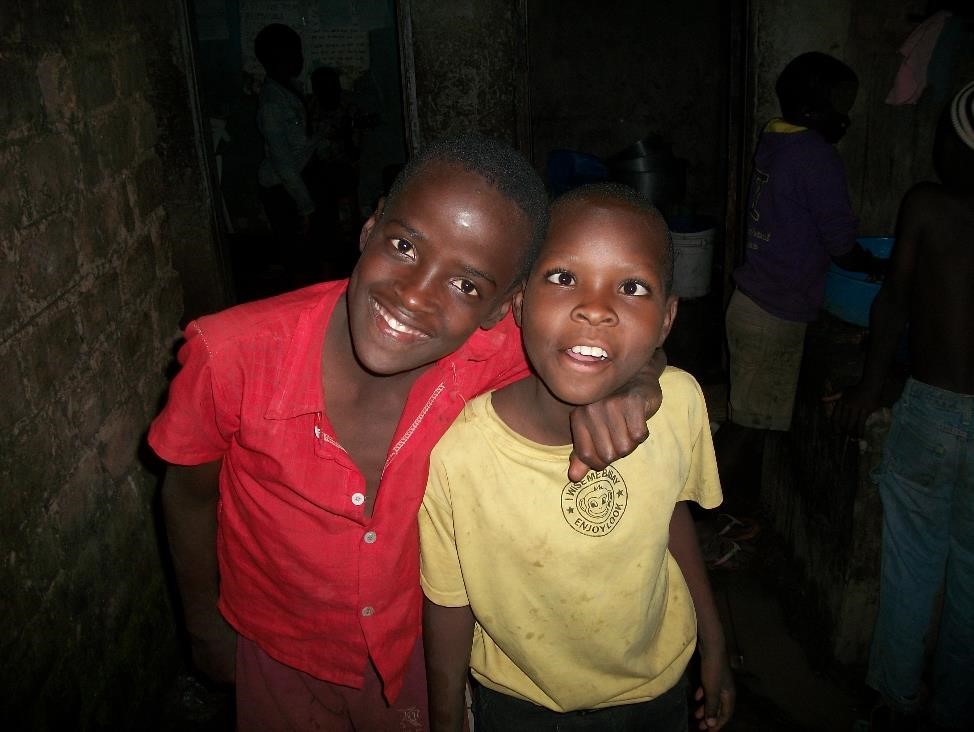
(“Oh, look at the poor cross-eyed street kid,” you might be thinking to yourself. Well stop. That is so prejudicial. He’s just making a face.)
Peter, Regan, and Swaib:
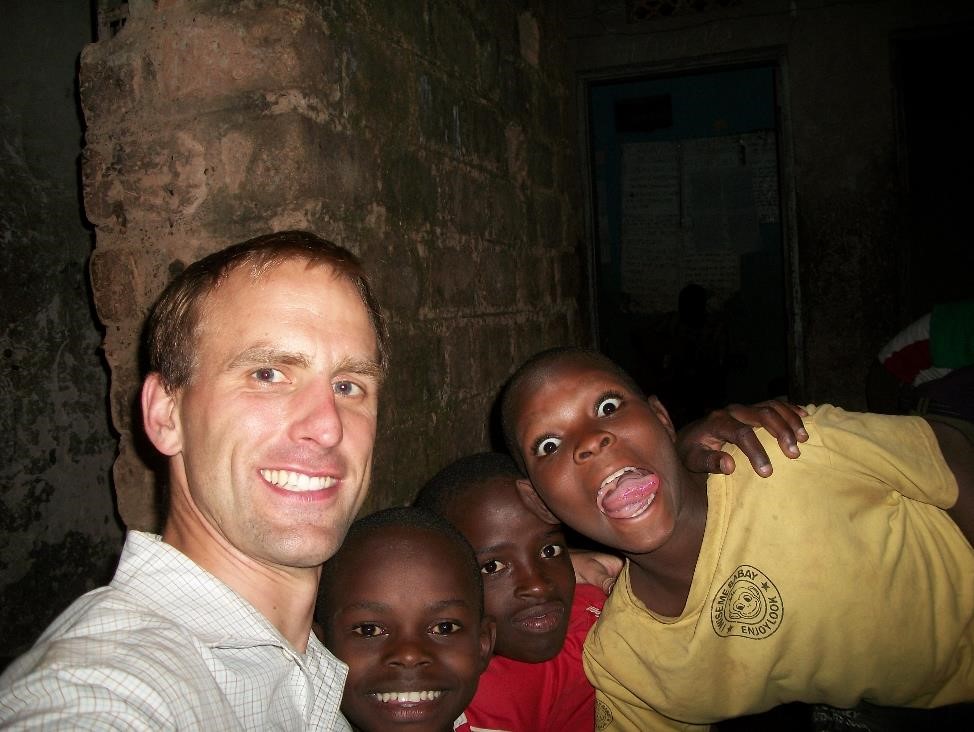
Brittani, my friend from ND who introduced me to the boys, and who has been hanging out with them over the last year:
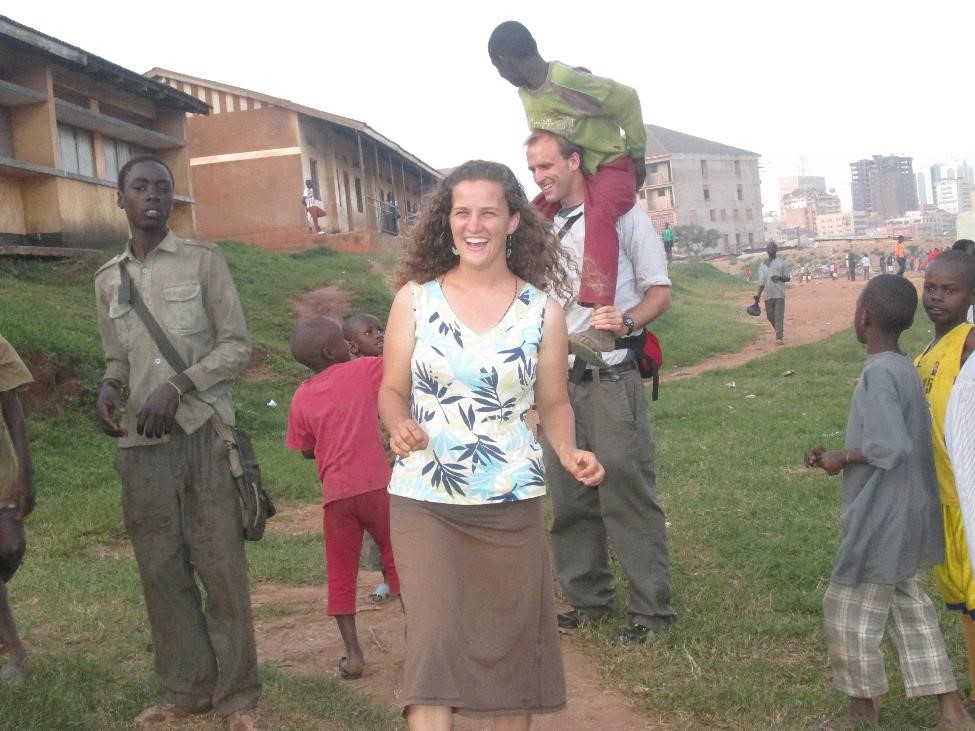
A street along which homeless folks sleep every night:
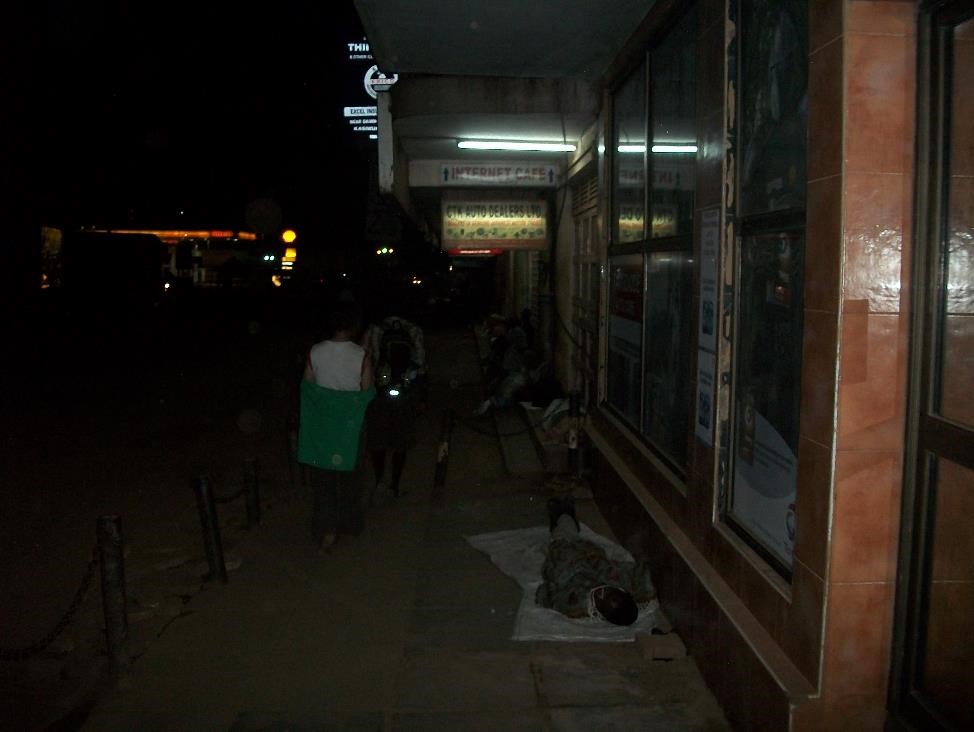
And here is a list, from Brittani, of the regulars:
John
Shafik
Brian
Moses
Kalahanga
Raymond
Mark
Rashid Waswa
Patrick
Edward
Derick
Brian
Peter
Amos
Umal
Enock aka Master
Swaib
Ivan
Godfrey
Sam
Amiina - the neighbor girl
Please pray for them!
One more thing: you might have noticed that street girls are not part of the picture. It’s not because I’m ignoring them or something; the street girl is just not a phenomenon. There are no girls running around with the guys. I imagine that there are some important reasons for this. I need to figure them out. Perhaps I will ask Brittani and David soon.
6.10.14
Sorry to go AWOL for a bit; for the past couple of days, I’ve been giving my limited daily journal time to the out-of-control exposition back on 5.30.14.
For the sake of doing my daily duty by getting something written here, I will relate one of the more charming and annoying aspects of Ugandan culture. They have this totally pedantic way of speaking, especially in groups. The structure of the habit is quite simple. They make the last part of a sentence into a quiz. For example, if someone is presenting a patient at a case conference, he (it’s usually a he) might say: “When I went to see the patient who was complaining of chills, I checked his what? [Pause] His temperature.” This sounds fine, right? Like he’s just trying to be educational. But the person might make a quiz out of every single sentence in a series. Or, what is actually quite amazing to hear, he will make a quiz out of facts that the audience could not possibly be able to guess. “You will go right at the stoplight, and then after two blocks you will go what?” [Pause, during which the Western listener thinks to himself, “I asked you for directions, not for a brow-beating, -------.”] “left.” But the thing is that everyone does it, not just jerks. I think that it probably has a lot to do with the teaching style around here; I haven’t been in any classrooms, but I imagine that they are just brimming over with pedantry. This is an authoritarian culture, and the syntax shows it. I wonder what our American syntax reveals about us.
6.11.14
Travelled by bus from Kampala to Mbarara. See map here. Not much to report. Oh, except that the guy next to whom I was sitting offered me some roasted cricket snacks that he bought at a road-side pit stop. I was hungry, and they weren’t that bad. Heavily salted nuggets of protein are pretty much a universal crowd-pleaser, like peanuts I suppose. And another atypical encounter: I bought the book Rich Dad, Poor Dad, by Robert T. Kiyosaki, from a bus station hawker before boarding, and read most of it on the trip. It really made me want to be rich; I am an easy sell these days, surrounded as I am by the trappings of grinding poverty. But then I realized what the author’s real message was. It reads as follows: get at the other guy before he can get at you. Money is power, and when you take enough of it for yourself, then you don’t have to worry about other people taking it from you. Even though the bulk of his words are about the money-making process, the core sentiments are fear and greed. The author’s own fear of powerlessness and vulnerability is written all over the book, and his greed is revealed by the fact that almost all of the schemes that he recommends capitalize on other people’s ignorance. For example, in the realm of real-estate, he extolls the virtues of buying properties at low prices and selling them at high ones (one of the most fundamental principles of business, but also one of the most deceptive), he delights in real-estate foreclosures because they allow the owner to resell at a higher market value (even though they mean disaster for families), and he encourages people to gain a position in which they collect as much rent as possible and talks about what a rotten position it is to be a tenant (he doesn’t highlight the fact that the position of a rich owner requires a multitude of hapless and vulnerable saps on the tenant end). I suppose that Kiyosaki’s defense would sound something like this: “It’s not like I was trying to hide the secrets of my position. I wrote a freaking book about them. If people don’t read it, then, well, that’s their choice. I’ve done my best to educate them.” Good point. Still, though, it seems that virtuous ownership and salesmanship would require more than just the buy low, sell high approach. Shouldn’t somebody attempting to exercise the “Do unto others…” principle interest himself with finding the fairest selling prices instead of merely the most advantageous ones, in helping families avoid foreclosure, and in charging manageable, generous rental rates? I wonder if the basic business principle of “buy low, sell high” is compatible with Christianity. I wonder if Kiyosaki’s book isn’t something like the Gospel According to Mammon rather than good, sound advice. He does get across the difference between an asset and a liability, which I do think is helpful, but again, needs a lot of re-interpretation in order to be implemented in a Christian fashion.
The reason that I am so interested in all of this is because the opportunistic ethos is tearing this country to shreds. More about this on 6.13.14, and all of the other posts where I talk about marketing, corporate greed, state corruption, and the like.
I guess that’s the whole problem with free market capitalism, isn’t it. It creates the illusion of market agency so that people can excuse themselves from personal responsibility for their neighbor. It hides and complexifies all of the relational ties between people in a black-box market entity so that the perpetrators never have to deal with the personal ramifications of their decisions, and the victims never know who to blame. I thought the movie Avatar was all spectacle and no substance, except for that one point. It really drove home how the corporate executive was beholden unto the interests of the hundreds of thousands of shareholders who owned stock in his company; he had to pillage the natural resources of the alien planet because the stockholders demanded profit and they didn’t care how it came about. Plumber Joe owns a share of a mutual fund, and he wants a return on his investment. He doesn’t know or care what the companies that are part of his fund are doing to get their money, so the companies don’t have any reason to make generous or humane decisions. In the movie Avatar, if the corporate exec didn’t make the profitable decision, he would be fired and somebody else would do the job instead. The machine rolls on. Again, Wendell Berry’s essay, “The Idea of a Local Economy” (click to access), gets this better than anything I’ve ever read. Here’s a pertinent quote:
“The folly at the root of this foolish economy began with the idea that a corporation should be regarded, legally, as ‘a person.’ But the limitless destructiveness of this economy comes about precisely because a corporation is not a person. A corporation, essentially, is a pile of money to which a number of persons have sold their moral allegiance. As such, unlike a person, a corporation does not age. It does not arrive, as most persons finally do, at a realization of the shortness and smallness of human lives; it does not come to see the future as the lifetime of the children and grandchildren of anybody in particular. It can experience no personal hope or remorse, no change of heart. It cannot humble itself. It goes about its business as if it were immortal, with the single purpose of becoming a bigger pile of money. The stockholders essentially are usurers, people who "let their money work for them," expecting high pay in return for causing others to work for low pay. The World Trade Organization enlarges the old idea of the corporation-as-person by giving the global corporate economy the status of a super government with the power to overrule nations. I don't mean to say, of course, that all corporate executives and stockholders are bad people. I am only saying that all of them are very seriously implicated in a bad economy” (p. 5).
Oh, and Chesterton wrote presciently about this Rich Dad, Poor Dad sort of book, as he did about almost everything else. You are most welcome to read the passage here.
[Note from 6-21-14: I gave a guest lecture at an all-girls’ Catholic school last week (see 6.18.14). One of my get-to-know-the-crowd questions was “What is your favorite book?” Only about 15 people answered. One of them said Rich Dad, Poor Dad (the rest, except one, said The Bible). I think that this unrestrained capitalistic greed doctrine is becoming the new religion, even among the poor. It adds up, I guess. A “get at the other guy before he gets you” policy makes a lot of sense when you feel like everyone is out to get you. I think that the poor are cluing into the game of the rich, and now they want some of the action instead of just getting used all of the time.]
6.12.14
Met the folks at Mobile Hospice Mbarara, with whom I will be working for the next few days. I felt under the weather (an idiom that my German host Fr. John thought remarkable) and went home for a feverish afternoon and evening of sleeping off the flu. It is surely not grave, so please do not worry about me, in case you are so inclined.
6.13.14
I felt better today, although still not topped-up (a common Ugandan phrase; as in, be sure to top-up your mobile minutes before you go on your bus trip). Thanks for wondering.
I had a great conversation with my two White Father housemates this evening. One, a German named Fr. John, is the (sole) man of the Mbarara house. The other, Fr. Rudy, also a German, is the head honcho for the White Fathers throughout all of Uganda. Both have been in Africa for 50 or 60 years each, Fr. John all around the continent and Fr. Rudy specifically in Uganda. They’ve seen a lot and they know the score (the fact that I’m watching World Cup soccer with the Fathers while writing this is surely affecting my word choice). Our conversation towards the end of the meal turned to the topic of greed and corruption. I knew that it was bad, but I didn’t guess how absolutely pervasive it is. According to Fr. Rudy, the 60-year Uganda veteran, absolutely anybody who succeeds has been corrupted. It is the sine qua non (latin for “without which no;” “the thing that is absolutely necessary”) for promotion. The politicians especially, but also the lawyers, and (according to a national opinion poll) the judges most of all, learn to speak the language of justice and democracy for political purposes, and then do absolutely everything in their power to grab as much money as possible for themselves and their people. And the most heartbreaking part of the conversation, the part that I had rather hoped wasn’t the case, but could have predicted if I thought about it much, is that the Ugandan Bishops are all in on it. “Everyone, Fr. Rudy?” “Yes, all of them. Except for maybe one.” Dang it.
I suppose that this is the dark side of the tribal picture; I fear that I have been idealizing the tribe a bit, so that my treatment deserves this nuance. While the tribal system does seem to give the folks a strong sense of “us,” and “my people,” it also is just about the least egalitarian setup in the universe. The power structures are steep pyramids, and all of the wealth and power is at the top. You can hardly imagine what kind of pain and suffering this means for an already resource-strapped economy. I rode in the car the other day with a really great 12-year-old kiddo who has asthma, but no access to inhalers. “Abooya, do you have an attack sometimes?” “Yes.” “Do you have an inhaler?” “No.” What do you do when you have an attack?” “I go into my bed and go to sleep.” [Read: “I lay in my bed and go through the experience of drowning for about an hour, fearing all the while, with good reason, that I might die this time.”] No State coverage for pediatric inhalers. These politicians, by their immense greed, are essentially allowing kids to experience the equivalent of waterboarding thousands of time a day all over their country. And that’s just like one itty bitty pixel of the entire picture of suffering that goes on at the hands of these bastards. I’ve never been very sympathetic to revolutionary means, perhaps because I identify so closely with the oppressors in most instances, but the more time I spend here, the less averse I am to the idea of a few heads rolling around here and there.
On the other hand, it’s really hard to figure out which heads could replace them. According to Fr. Rudy, the corruption goes all the way down, like even to people taking bribes for voting a certain way (in America this sort of bribery goes under the names of “welfare” and/or “tax cuts”). When I was in Haiti, I asked around in order to gauge people’s attitudes towards government corruption. The really surprising thing is that they rarely resented it very much. The general attitude was something along the lines of “Good for them. I would do the same thing if I could.” I get the sense that the same attitude pertains here. Almost everyone is striving to be in a position where they can get as much as possible for them and their families, and taking bribes and other forms of illegal benefit is just how things work around here. I guess it makes some sense when employment is so meager, and survival might demand operating outside of the rules.
I think that the American power structure is similarly corrupt, but I do not think that the rot is so pervasive, that the government enriches itself in the same ways, or that the mass of humanity suffers for it nearly as much in America. I think that most people in America play by the rules and expect others to do the same, mostly because we can afford it. We can toe the line and support a family comfortably; this is rarely the case in Uganda. At the top, however, I think that the American government is mostly corrupt; I do not think, however, that they have to go very far outside of the letter of the law to get rich. So corruption takes on a much different tenor here. I think that many politicians violate the spirit of the law by talking about justice and equality, but then acting so as to enrich themselves by whatever means possible, of which there are many. The American government is effectively a plutocracy (rule by the wealthy), and the most powerful people are ever consolidating and increasing their wealth and power. Campaign finance, defense contracts, tax legislation, corporate dealings, etc. are legal yet often hidden and corrupted means of exchanging wealth and power. The occasional oversight is a joke; only enough people are caught out to create the illusion of accountability. The gap between the rich and poor is ever widening; by comparison, though, the most impoverished situation in America is middle class in Uganda, and the ground floor in Uganda is a pit by comparison. It would be appalling and unimaginable for Americans to find that children were suffocating for lack of an inhaler. In Uganda, that sort of thing is the norm.
[An addendum from 6.25.14, whilst waiting for medical attention at Kampala’s big State hospital, called Mulago. See 6.25.14 ] My tendency towards going on about corruption and power structures is probably provoked by having spent most of the day at the local hospital. Please see the journal entry on 6.25.14 for a discussion that touches on this experience.
6.14.14
This morning, I attended Mass at the all-boys Catholic boarding school that is adjacent to my House, and that is the pastoral charge of my host, Fr. John. It was good.
After Mass, Fr. John and I went to deliver clothes to a very precious little girl, named Shaddia. Shaddia lives at a boarding school for kids with disabilities. Her foster mother, Prudence, sends Shaddia to this school with Fr. John’s support. Shaddia was abandoned at her foster mother’s doorstep at a very young age; she was rejected by her own parents because of her mental disability coupled with deformed legs and feet. Shaddia will never be able to walk, but it is Fr. John’s hope that with a lot of work at the school, she will eventually be able to speak and read.
Fr. John is an excessively kind and generous fellow to all manner of people who appear on doorsteps, present company included.
It was a real gift to be able to tag along to Shaddia’s boarding school for the clothing drop. Our first stop was to the house of the foster mother, where we picked her up along with her son Abooya (See yesterday’s entry. I actually wrote part of yesterday’s entry tomorrow. Sorry to mess with your head like this, but I can’t always write down everything on the exact day that it happens, and I do a good bit of going back and forth. I guess not forth; I haven’t written about the future yet). Abooya was really cool; he got my number and wants to become a lawyer and visit America. He’s got a real uphill battle in front of him, though. For one thing, there’s the inhaler-less asthma situation (see yesterday). Asthma attacks don’t help with schoolwork. The other thing, besides, well, all of the other aspects of poverty that pervade his little life, is that he goes to a school whose motto is, are you ready for this?, “Sweat for Thy Bread.” I would not joke about this. Wait, you don’t believe me? Fine. Check this out:
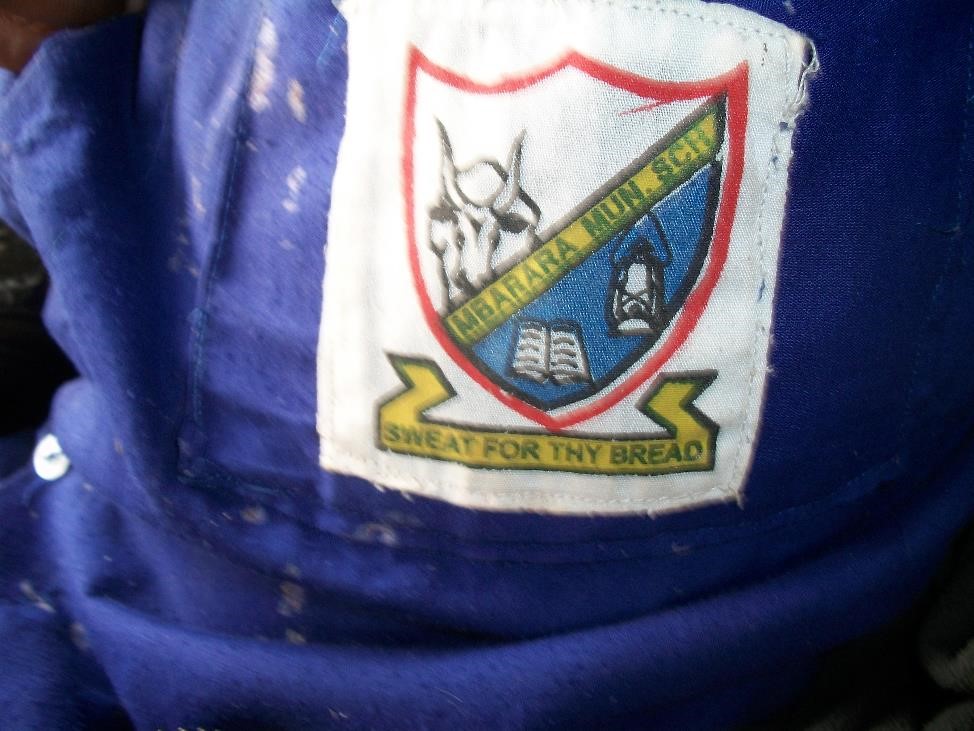
A shot wide enough to include the man himself:
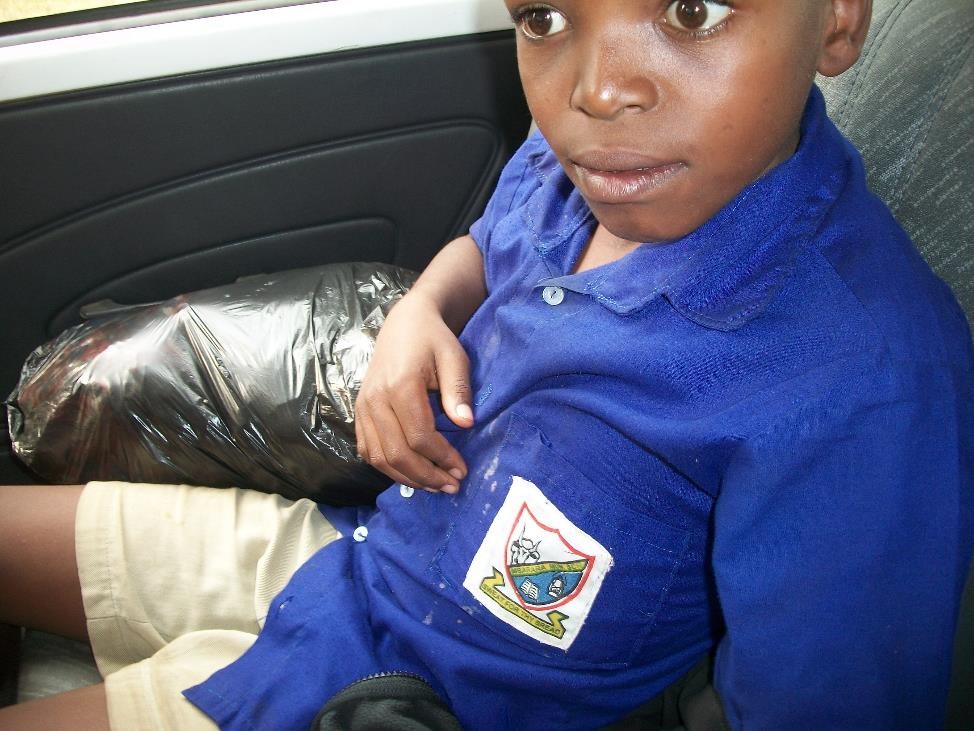
And one with Prudence, his mother:
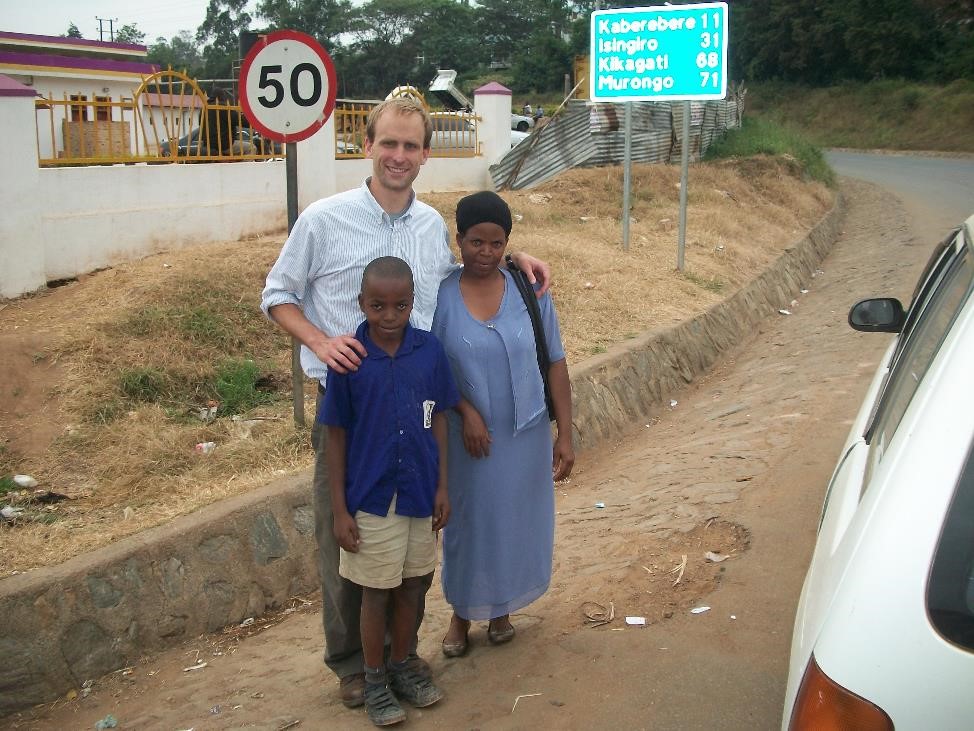
Please note the following aspects of the Mbarara Municipal School crest:
1) The featured animal is the ox, a beast of burden. This fact, taken together with the school motto, might lead one to surmise that old MMS perhaps sets the bar rather low for her dear pupils, and as a result, maybe for her dear teachers and administrators as well.
2) The inferior portion of the crest portrays a nighttime study session by lantern-light. While it might seem scandalous to us that students should be expected to do a good bit of manual labor around the house and farm both before and after school, here it is the norm. For conscientious students like our budding lawyer, the hours after sunset probably present a constant battle between the desire for much-needed sleep and the desire to study during the only free time possible; such is probably the conundrum facing Abooya and everybody else who aspires for something beyond what the government, economy, and educational system have in store for their chattel--I mean cattle--I mean charges.
3) The school motto is “Sweat for Thy Bread.”
4) The school motto is “Sweat for Thy Bread.”
5) The school motto is… Please compare with the following motto from my alma mater, Cistercian Prep, from whom only one student in its entire 60 year history did not go college, and who, during the year that my family became interested in sending me there, got 7 (20%) of its 35 graduates into Princeton: Ardere et Lucere (to enkindle and enlighten). Mumbara Municipal should actually be congratulated for their straighforwardness. So many schools, at least in the US, convey vastly overblown pretensions by their choice of school motto. Not so at MMS. They are apparently in the business of producing brute laborers, and they probably do a fantastic job of it. Truth in advertising. One wonders, though, if they might at least try to do a bit of enkindling and enlightening along the way, and if they might convey the sense of the higher things to the kiddos through the emblem design.
When we arrived at Shaddia’s boarding school, we were greeted by a splendid host of God’s favorite and most beloved children of all. Say hello to the crew:
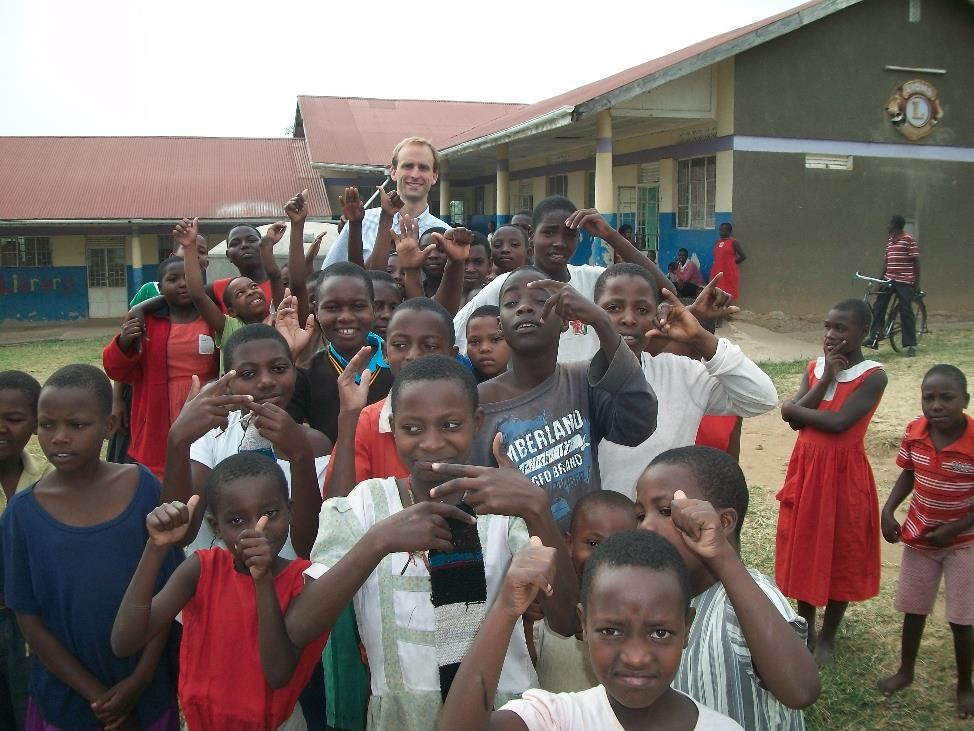
Whereas the more racist among you might be thinking that the black youth are definitely flashing gang signs, on the contrary, a lot of these kids are deaf, so they are like screaming their names and maybe other stuff to you. Pretty cool, huh?
I only had about five minutes with them because Fr. John had an agenda to keep, but in that brief amount of time we communicated the following:
1) Knitting is a big deal among the ladies. They use ink pens as the knitting spike things.
2) The dudes prefer soccer.
3) I showed them a picture of my family and introduced everyone to everyone.
4) The word for mother in African sign language is pronounced by tapping both breasts with one’s fist.
5) They get a lot less excited about reading than about knitting and soccer.
6) They like school.
7) When I showed them the Christmas card picture of my family, one of the 13-or-so-years-old girls said, “In that picture you are dark (my face was in shadow), but now you are beautiful.” Apparently, black is not beautiful in Africa. This confirms what Fr. Emanuel Katongole, a Notre Dame professor from Uganda, said in response to my question, “How do Ugandan’s feel about Westerners in general, and Americans in particular?” “Too much love,” he said. He explained that they want to be like us in every way; the pervasive philosophy holds that to be like the West is progressive and good, whereas the local culture is backwards and bad. This girl’s comment revealed that the sense of inferiority even pervades these kids’ physical self-image. That’s bad news.
After my brief and lovely encounter with the ambulatory kiddos (I think that there were many more who were crippled and confined), I met Shaddia, but only for the minute or so that Fr. John’s schedule permitted. We didn’t get to bond as much as I would have liked because she was struggling with her crutches, but she seemed decently satisfied with life. Fr. John has a lot of faith in her caregivers; I remain skeptical. Too much Dickens in my diet lately, and, as you might have noticed, a lack of faith in Ugandan systems of accountability.
Oh, and here’s the fam, as advertised. The pic is a bit tattered after 8 countries and 100k or so miles, but I think that it still might convey how lovely my dear sisters are, and where they get their devastatingly good looks and winsome personalities. Yep, my parents and me, respectively.
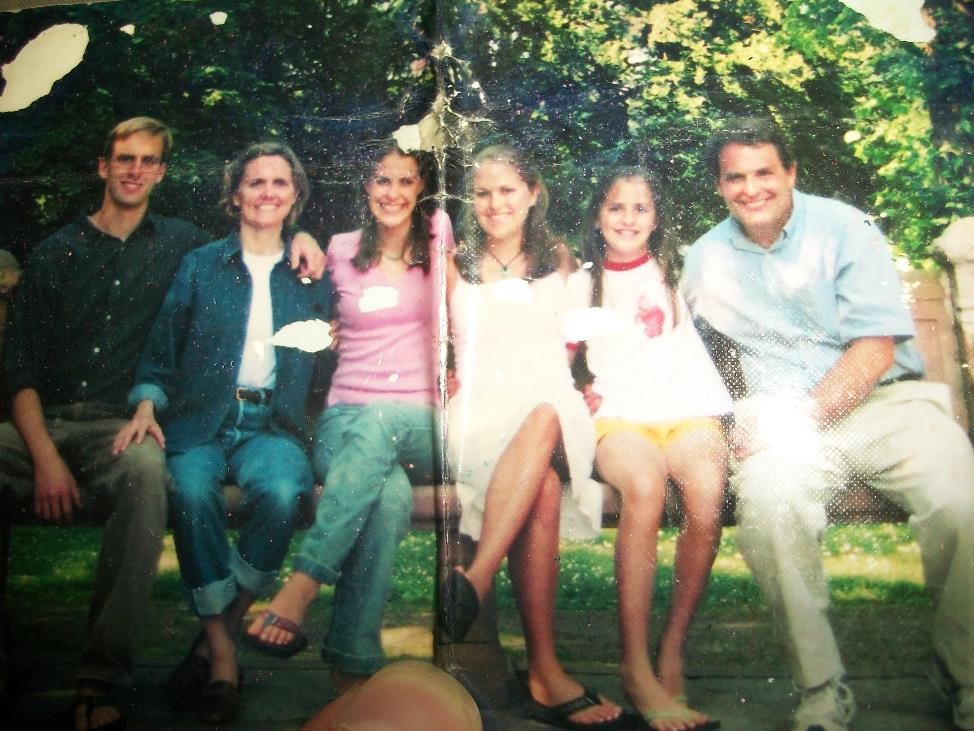
6.15.14
I went to Mass in the local language at the Cathedral and then spent most of the day around the House catching up on emails, this journal, and stuff. I love the local Masses for the singing—it’s totally joyful and lightful and uplifting and really hard to describe. It feels like how worship should be, and the experience reveals that Western music is constrained and dull and dampened by comparison. Here’s a similar problem: how do you describe Heaven? All we can say is that it shares certain aspects of our current existence, but that it is a life in comparison with which our current life is a privation. There’s something more, but it’s really hard to describe exactly what it is. And my experience so far is that when they try to sing Western songs in English, things get dull and confused. Our medium constricts them, and the joy can’t translate. The best recordings I’ve heard, although a recording is such a sad shadow of the Cathedral experience with the people and all, are songs by Ladysmith Black Mambazo (from South Africa) and by Ayub Ogada (a Kenyan). The former band, Ladysmith, was the accompaniment for much of Paul Simon’s Graceland, or rather I should say that Paul accompanied them. This album has long been one of my favorites, and now I know why. A few of these guys’ videos are on Youtube, but again, it’s all shadows on the cave wall. An album by either band might be a bit better, but you still need to come over here to get the complete earful and soulful of it all.
6.16.14
Not much to report. After work, I went into the centreville of Mbarara and walked around a bit. I get a real kick out of seeing how people do their thing in a totally foreign culture. My putative goal was to buy some tweezers. But then I stopped at a second-hand clothes store. Most of the t-shirts are from America, but on any rack, there are usually about 2 or 3 really cool finds. Yesterday, I got a shirt from the equator in Ecuador. And one from a Cambodian monastery. A couple of weeks ago, I got one with a map of Tibet and another with some Dutch emblazoned across the front. I plan on making gifts out of them.
6.17.14
I just got an email from the coordinator of a mental health organization in Kampala. His title in the tagline reads like this: “Enchanting Professional Private Master of Ceremony.” Awesome. And he’s not joking around or anything either.
I come across stuff like this all the time. Unfortunately, though, they are usually glances too fleeting for photos, and too perfect to convey by verbal description. I will try to stop the boda bodas (motorcycle taxis) more often, though, in order to snap some pictures and share the wealth.
6.18.14
This evening, I had the great honor of addressing Ms. Betty’s A-Level (like Senior year in High School) Biology class at Mary Hill High School in Mbarara. About 40 students piled into a room to hear me blather on about the road to becoming a physician. The Headmistress, Sr. Anastasia, invited me after Mass last week. I mentioned to her that I would be glad to address her students about any topic that she saw fit, and this was the assignment I got. You can download the PowerPoint here. It includes a few of the biggest lessons I’ve learned about how to figure out if a profession fits, how to live a balanced life in med school, how to study, etc., sprinkled with not-so-subtle encouragements to always turn to Jesus. The basic schpeil. Nothing too fancy. Totally predictable.
Interesting thought at dinner tonight with Fr. John and Fr. George, two German White Father missionary priests: Ugandans and other Africans intentionally disregard English grammar and usage rules as a form of defiance. Ugandan newspapers are filled with awful English; front page articles often include glaring mistakes, even in the first or second sentence. Even huge painted signs on the sides of buildings often include simple spelling errors, as if they were indeed intentional. I’ve attributed the gaffs to ignorance and sloth, but maybe Fr. John is right and there is an element of swagger involved here as well. I just hope that the attitude doesn’t apply to Western scientific knowledge and medical technique, although, on various levels, the phenomenon is surely operative everywhere.
Here is a pic of the White Fathers’ house, at which I am staying:
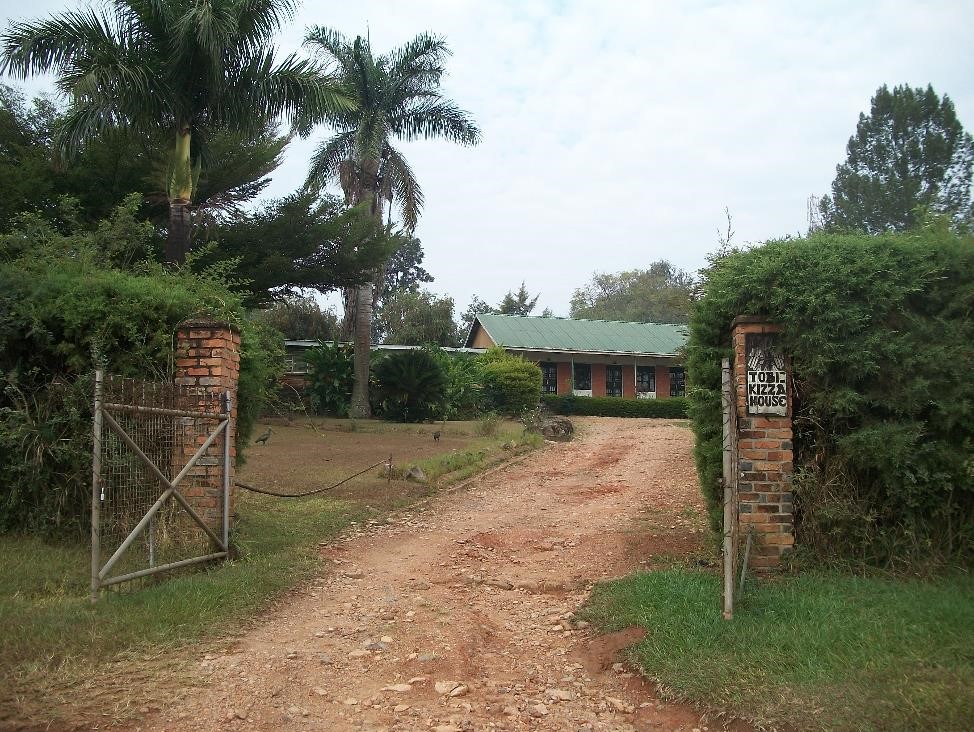
And a panorama of the courtyard:
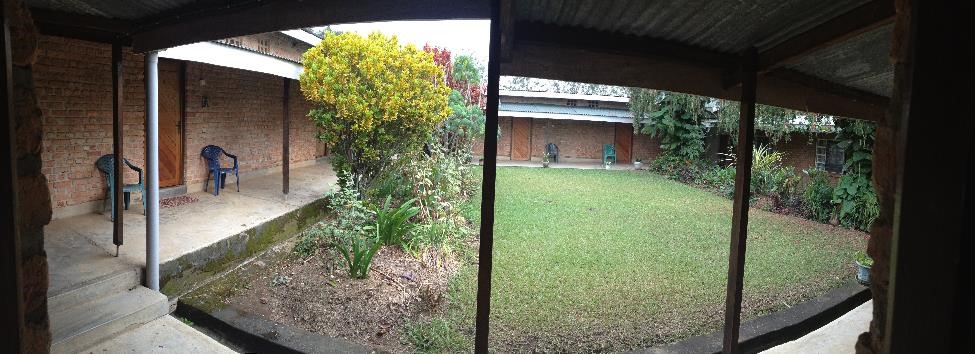
6.19.14
I went for a run and got caught in my first African rainstorm. It was epic, as the kids say.
6.20.14
An African sunrise from the front porch of the White Fathers’ residence (an ugly shadow if its original, obviously):
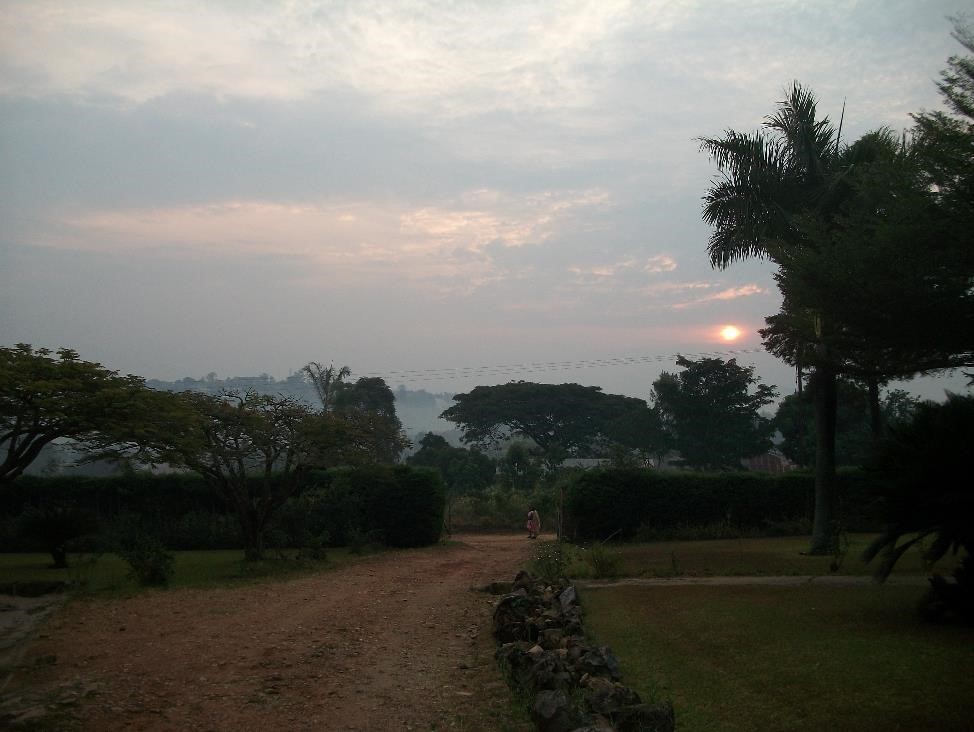
You might remember that I held forth a bit on 6.15.14 about singing in the local language. To listen to an audio file of some daily Mass singing in Nkole, the language of Mbarara, please follow these steps: 1) right-click here, 2) choose “Save link as…”, save it to your desktop, 3) double click on the icon on your desktop to listen to it from there. The recording is terrible compared to the real thing, but it might give a vague taste of the lightness and joy of it all.
And a pic of the choral scene:
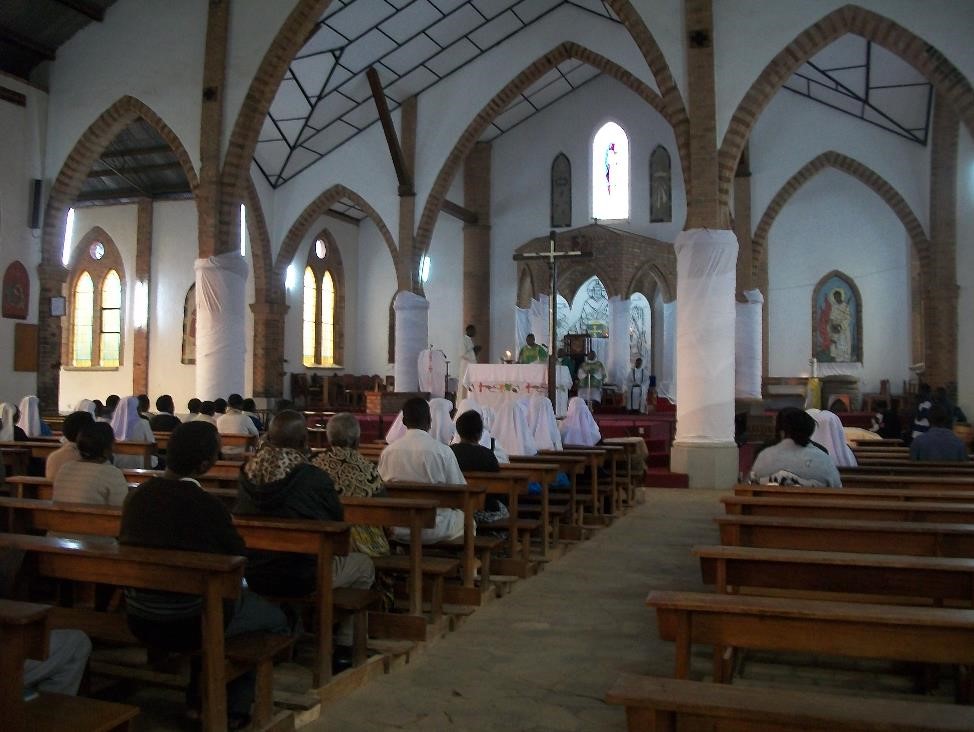
Do the same clicking and saving rigamarole here to hear a couple of minutes of singing in English, which, as I argued above, doesn’t seem to work very well for the people of Uganda. It’s as if their souls can’t speak the colonial language, even if their bodies have been compelled to attempt it.
[Added on 7.4.14:] The singing thing makes me wonder how much I can possibly understand about the people here as a member of the foreign imperial tribe. I think that the same disconnect happens in everyday speech as it does in singing. While I don’t know what they are saying in their local language, I can tell that they connect with each other with a lot more lightness, freedom, humor, and joy than they do with me in English. It makes so much sense too. These people learned how to express their deepest selves in the home and in the village, in their tribal languages, and not in school. English, by contrast, got shoved down their throats in the classroom.
Some thoughts about language: Through language, people communicate so much more than mere thoughts. Something really profound happens when people chat. Some people say that prayer is like talking to God in the way that we talk to other people. I would say that the converse is true; talking is like praying to another person in the way that we pray to God. In a conversation, souls reach out to each other and make some kind of mysterious and inexplicable contact. I think that when the locals speak English, they are constrained by the foreign mode of expression. It is as if their souls have various ways of expressing themselves, and those ways are diminished and constricted within the narrow confines of a foreign tongue. Without knowing the language, I only have access to one small patch of the picture; I can only see people with tunnel vision. My interactions are like the caged version of the real thing, like going to a zoo. What can you possibly know of an animal outside of its environment? An animal and its environment are co-extensive; going to a zoo is like going to a severed limb exhibition. How can I know the people here apart from their linguistic milieu? Even though our mouths might be saying words that we both perceive, our souls can’t speak to each other in English.
It would probably be a truly glorious, splendid, and even beatific thing to be able to know people on their own terms around here. I suppose that that is what Heaven will be all about. I suppose that that is why it was such a big deal that the apostles got the gift of tongues and why the Tower of Babel was such a thing. Our souls are separated by differences in language now, but we will not always be. In Heaven, I suppose, our communion will be even more profound than that I enjoy with people of my own tongue. I will probably look back on my relationships on Earth as I now look at my relationships with the Ugandans; we will see that we only knew each other in small part, that we only saw each other, even our closest friends, as through a glass darkly. For what could possibly compare to knowing each other in God, to be in His heart and know each other as He knows us?
The singing at Mass, at the Eucharistic Feast, was a small taste of that. I am realizing now that that is what grabbed me about the whole thing. I knew that something huge was happening there, but I am just now putting my finger on it. I was somehow able to enter into communion with the people through singing in a way that has been impossible in all of my other experiences here. Our souls can communicate through singing in a way that they can’t communicate through language alone. That’s it. Of course. That’s the beatific vision, isn’t it? Singing with each other for eternity at the Wedding Feast of the Lamb. Our souls are with each other most closely when we are worshipping Jesus in song, even across differences of language, culture, and class, even across prejudice, imperialism, self-centeredness, and pride. The great Communion. The eternal Feast.
This is also why bad music is such a rotten deal. I have commented briefly about it here.
[end addition]
You might remember Abooya, our asthma patient who bears on his chest words of constant encouragement to Sweat for His Bread. Well, Fr. John mentioned the possibility a couple of nights ago of actually helping the little guy with his pulmonary predicament. Honestly, it hadn’t really even occurred to me that I might be able to step in and make a difference here. The reasons for this are many, but chief among them is probably that I have been lulled into bureaucratic complacency by my internship with PCAU.
Shucks. I didn’t want to have to launch into it here, and I will try to withhold the full rant until a later time, but a couple of words would perhaps be appropriate since, well, I haven’t talked one little bit recently about the main formal reason for my being here. More about the much more important topic of Abooya after I clear the air a bit. In fact, feel so free to skip ahead to the important stuff about the little guy; the next couple of paragraphs are fairly self-centered and whiny.
So, yeah. I go to work during the day at various Hospice care providers. In Jinja, the organization was called Hospice Jinja. In Kampala, the organizations were a department at Mulago Hospital and an outfit called Hospice Africa Unganda. And at my most recent post, in Mbarara, the organization was called Mobile Hospice Mbarara. The drill was very similar at each place. I would accompany a nurse or a doctor into their visits with patients. The professional would review the patient’s case, ask a few questions about the medications, field concerns, adjust the meds and dosages, and on to the next patient. The patients usually had AIDS or some form of cancer. The whole process is usually terribly boring in some ways, and really important in others. Here are the boring aspects: 1) I am always in the passenger seat. I don’t make decisions and I don’t drive the bus. I think that everyone likes doing cool stuff way more than they like watching other people do it. But I think that for me, this is especially exaggerated. I can’t stand watching sports on TV; it just makes me want to go outside and play instead of watching other people do it. I get terribly antsy at meetings where I do not have a lead role; I suppose that a few years of teaching have given me a taste for running the show instead of acting in it. And I don’t learn nearly as much by watching people do things as I do by doing them myself. 2) The work is palliative, not curative. The distinction escaped me completely when I was investigating the opportunity; I knew that the difference existed, but I didn’t know what it meant in practice. It turns out that the hospice professionals do not work towards curing their patients, but rather help them deal with their pain. This goes against all of my hard-wired inclinations. Medical school has drilled my mind in the practice of fixing people; all of the tens of thousands of multiple choice questions so far (which are a form of bureaucratic mind-formation, by the way; more about this perhaps later) have been geared towards diagnosing illness and treating it. Palliative care is a whole different ballgame, and it’s not a game that I know well or that I enjoy playing. In fact, in the words of the executive director of the main Hospice provider in Uganda, Hospice is a nurse’s profession. The nurses I’ve witnessed have been really good at it, and I think that their work is utterly important. It’s just not my thing. 3) Most of the patient interviews are in the local language. It’s pretty lame to sit around for most of a 30 minute session and have no idea what is going on. Even if the nurses explain everything to me with the utmost patience, which they almost always do, it is still impossible to really understand much about the patient through translation (for a lengthy commentary on this phenomenon, click here). The language barrier also makes it impossible that I can become proficient, in these short couple of months, at doing patient care on my own, which takes away my motivation to try.
That being said, my accompanying the nurses has given me some incredible opportunities to gain truly intimate and precious insights into the lives of the patients. I will try to relate some specific episodes soon in order to illustrate, and maybe even pass on, the gift of encountering these folks through their hospice care. Some of the images and stories are forever emblazoned in my memory, so it won’t be difficult to describe them.
But for now, permit me to relate the case of Abooya. As I mentioned here on 6.13, here on 6.14, and at the beginning of today’s post, Abooya has a pretty serious case of asthma that lays him flat every once in a while, keeps him home from school a good bit, and actually, it turns out, causes him to be ostracized by his classmates. When Fr. John mentioned the possibility of helping him out with it, as I mentioned above, I was surprised that I hadn’t thought of the option before. Another thing about the Hospice organizations that I’ve been working with is that they are intensely bureaucratic (shoot, sorry for the detour again; I guess I should have been getting this stuff off my chest earlier), and as a result the employees can’t imaging dealing with folks outside of the context of institutional protocol. For example, when we went out to care for patients in the villages one day, a stander-by asked if we could take a look at his mother. When I started to accompany him, my hospice nurse-guide told me, no, we can only see patients who have filled out the paperwork and who come to the Hospice center first. I almost went anyways, in an act of charitable defiance, but the guy brought his ailing mother over to us instead, against the wishes of my nurse friend. In one of my first solo diagnoses, I told the guy that the puffy, slowly-creeping mass on his mother’s skin was a keloid, and that there was nothing he could do about it. The point of all of this for the present conversation is that somewhere along the way, I absorbed the Hospice mindset that patient care is the thing that you do at work, and only in the context of institutional protocol, paperwork, meetings, oversight, fee schedules, and the like. Totally distant was the idea that I could encounter a patient outside of the system and do my best to help him, person to person. The bureaucratic machine was demanding my attention and submission so often, and compelling me to toe the line so closely, that I couldn’t hear the still, small voice of basic human compassion. There is a way in which the voice loses strength and our ability to hear it gets attenuated when we neglect responding to it for any sustained period of time. Kind of like exercising a muscle or a skill or tending to a relationship. In a terrifying way, I think that my encounter with Abooya proved that I was becoming bureaucratically assimilated.
So, Abooya. Yes, Fr. John. I think that I will see what I can do to help. It was very simple and easy for me, although it took some time. First, I talked to a physician at Hospice to ascertain which questions to ask. Then I had get in touch with someone who knew about the frequency and severity of his attacks. Not an easy prospect when a cell phone is shared between four or five people. I got the info and ran it by the doc, who suggested the appropriate medication and treatment regimen. Then I got the stuff at a pharmacy, with Abooya, his mother, and Fr. John accompanying. Then I spent a lunchtime café session explaining to them how to use it. It requires a three week taper process, so it wasn’t very easy to communicate across the language and education barrier. Fr. John, who speaks the language and has an ongoing relationship with the family, was a great help. In the end, Abooya, is now on the road to easy breathing and an attack-free existence.
A few observations along the way: It was truly a delight to see the faces of the café patrons when they heard that Fr. John speaks their language. I had been around him a good bit over the last few days, but for some reason or another, the significance of his literacy hit me there. What does it mean to the people that somebody speaks a local Ugandan dialect? It means that he’s spent at least a few years living with the people, talking to them, befriending them, sharing their lives, and understanding their culture. In short, it means that this guy has followed the way of his Master, and practiced what He preached. The Incarnation showed us that love demands specificity. God could have come to the world in the form of an eternal mist, enveloped the earth, and communicated to us over an ethereal loudspeaker. If I were God, that’s probably what I would have done. Loads less vulnerable and immensely more efficient. Instead, He chose to come to earth at a specific time, to a specific place, to a specific little tribe, and to befriend and live with a very specific set of people. Jesus showed us that love demands specificity. (I realized this when I was struggling to make the transition from my ethereal, limitless, campus-haunting, non-specific college existence to the experience of showing up for 30 specific sixth-graders in one particular classroom and teaching the same subjects every day. This kind of love, this specific love, felt like a harsh and dreadful thing in a lot of ways, but in the end, I realized that it is the only thing worth doing in life, and the only way to really follow Christ. This is what marriage and family life entails, big-time, and what religious life is all about too. The word “religious” even comes from the Latin word for tying, or binding.) Every time Fr. John opens his mouth to speak the local dialect of this (by the world’s standards) obscure backwater people, he is also saying, “You matter. I am here for you. And God is here for you too.” When I remarked to Fr. John what an amazing thing this was, he simply replied, “I think that it is part of what we do.” As if to say, this is nothing remarkable, I am only a lowly servant, and this is simply another part of being a missionary priest.
Here is a pic of Fr. John, beside a sign that he thought remarkable for the fact that the environmentally-minded stick figure in the lower left is doing his part not only against litter, but against Nazism as well:
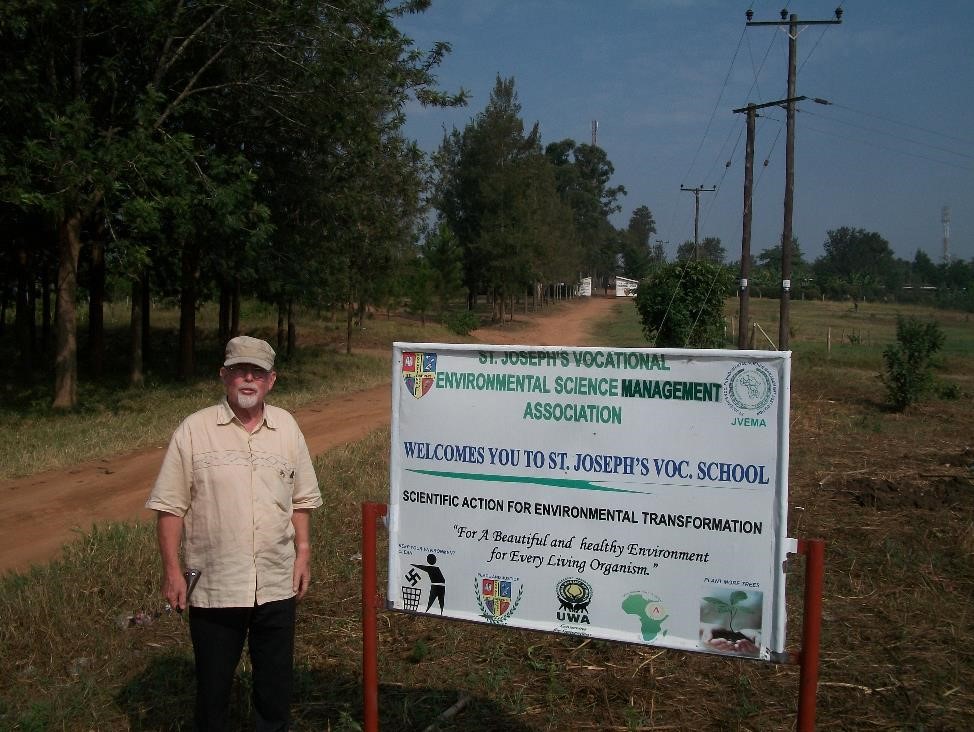
A second set of observations: when we picked Abooya and his mother up from their house, Fr. John was eager that I should notice a few things about their way of life. He had been reading my blog, and thought that a few observations here would make a suitable addition. Here’s a pic of Abooya, his mom and I in front of their house. You can’t see much of the premesis because the clothes are in the way:
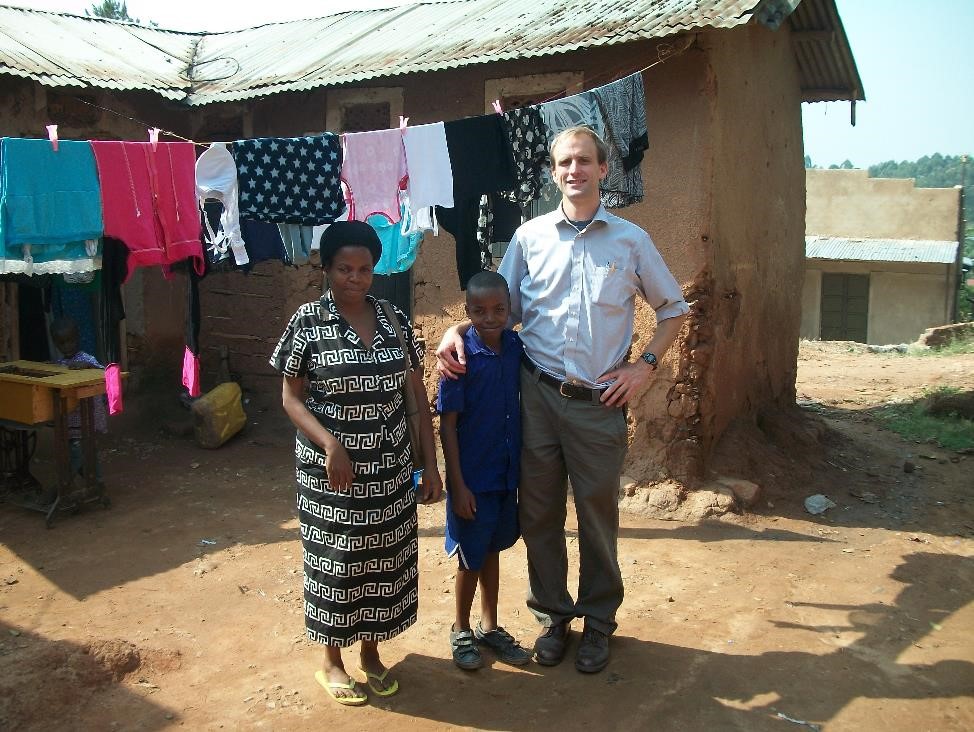
Their home consisted of three rooms, each simple concrete cubes 10’x10’x10’ without windows, electric lighting, or even doors (just doorways; it’s was about to sound like the setup to a riddle, wasn’t it?). The rooms were all depressing, stuffy, and confining by western standards, but totally quotidian by the lights of our hosts. One of the rooms served as a sitting room, and was populated by a couple of worn-out couches. This room led into a half-storage, half-bed room strewn about with clothes. One could fault them for being messy, but then one would have to quickly repent after realizing that they did not have a closet or chest of drawers in which to organize their stuff. You try to keep an orderly room when you only have 30 square feet for everything. The third room was sort of an all-purpose work room/kitchen where Prudence (Abooya’s mother) carried on a small sewing business along with her daily cooking tasks. I got the sense that spending time in these rooms would be a dreary and drab proposition, and that, as a result, their residents spent their days elsewhere, Abooya at school and around the neighborhood, and Prudence going about her sewing business. The most important part of the whole setup was the fact that it was part a little commune of about four or five other similar arrangements. Apparently, the owner of the whole thing is an Anglican pastor. He charges Prudence 30,000 Ugandan Shillings, which equals $12, per month. And the four or so families share some manner of life together. For example, when I called the communal cell phone to get Abooya’s medical history, a guy named James picked up (it turns out that he is the Anglican pastor). He spoke fairly good English, so I inquired about Abooya’s asthma, and he knew every last detail. Apparently, they are all up in each others’ business, as the kids say. The exact details of the arrangement are really difficult to tease out (Fr. John admitted as much when he tried to describe the relationships), but they were all there for each other in a way that would probably be difficult to imagine in America. I could go on about community and how we in America are all so individualistic and all that, but I’ve already done so elsewhere, maybe to a cliché’d and nauseating extent.
One more little piece of the story. When I asked Abooya about friends at school, he said that didn’t have any because of his asthma. And then these huge, gigantic tears welled up and started plopping out of his eyes, right onto the table. No weeping, no crying, just tear-bombs. Dear goodness. So I guess these things that we tend to think about in purely medical terms have massive, world-shaking social and political ramifications. What could be more important on the international political scene than the news that a little boy in Mbarara, Africa gets ostracized for not being able to breathe so well? And what could be more important than getting him some easily-obtainable medication to solve the problem entirely?
Do bureaucratic institutions accomplish a lot of good in the world? Probably. Are they more efficient than a more personalistic, communitarian approach, like the Catholic Worker. Maybe (this whole process took me about 4 hours, whereas it would have taken the machine about one hour; on the other hand, though, there’s a whole lot of time and effort and money that go into maintaining the machine, so the total amount of time might be close to parity, or even tipped in favor of personalism). Did Abooya and his mom experience way more love, care, understanding, and friendship through Fr. John and I than they would have experienced in the system? Absolutely. By a factor of at least 500,000. In sum, the aspects of the experience that are discernable by bureaucratic analysis (such as health outcome, cost, time spent by the patient, time spent by the healthcare professional and staff [you cannot imagine how much time these functionaries waste in meetings, paper-pushing, filling out useless forms, pointless communications, etc. unless you have actually worked in a bureaucracy before]) were probably comparable across the two possible ways of addressing Abooya’s problem. But if someone were to pull their head out of their cubicle for a second and actually think for a bit about what kind of human benefit is accrued by the direct, personalist approach, then the comparison loses all significance. I have a new friend in Mbarara who likes English class and soccer and loves his mom and wants to be a lawyer. And Abooya knows that somewhere off in the big world, there is a tall white dude who thinks he’s a really cool guy and is praying for him, and is really interested in whether his bronchiolar tissue is inflamed or not and whether he can breathe. So stick that in your balance sheet, boss. Oh no wait, you can’t because there’s no column for it, and there never can be. It won’t compute. The world is probably more impoverished by well-meaning bureaucrats who can’t comprehend compassion, than by all the “backward” practices of “developing” nations combined.
Here’s a pic of Abooya with his new regimen and a puffy new inhaler:
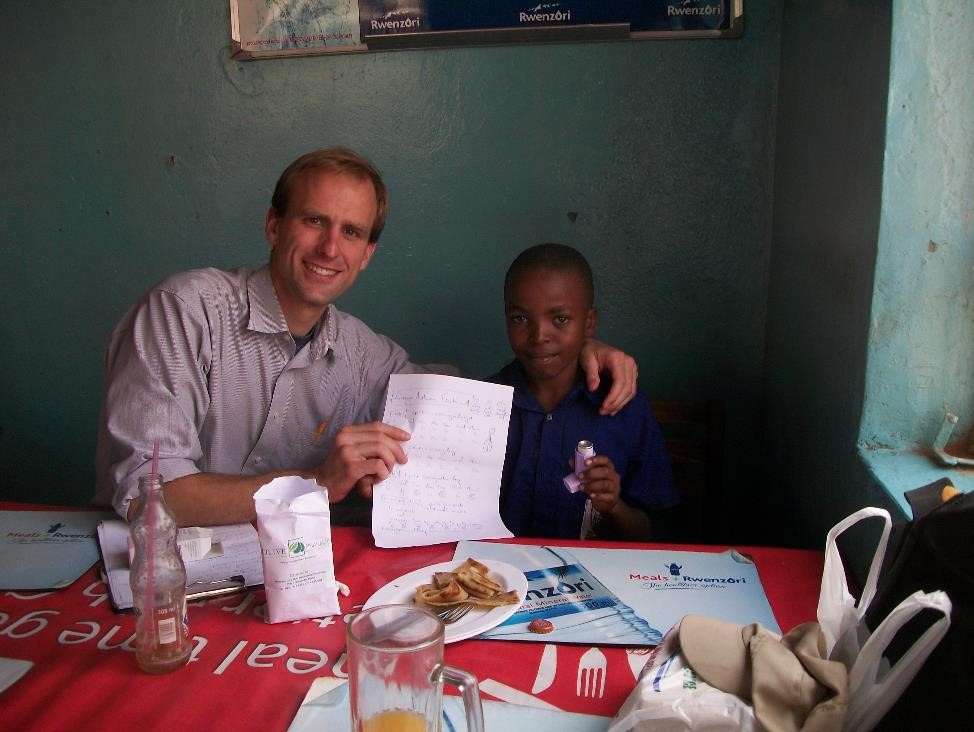
I spent the afternoon and evening travelling from Mbarara to Fort Portal. Here are some some pics that I took along the way. I hope that you will forgive me if the journal takes a turn for the touristic at points; I want to be sure to gratify the more visually interested constituencies.
A typical storefront mobile service provider ad. These facades pervade entire village-scapes; there might be a series of eight or ten stores in a row, all advertising a different type of mobile company or soft drink. Marketing and manipulation as far as the eye can see…

Tea plantation hills:
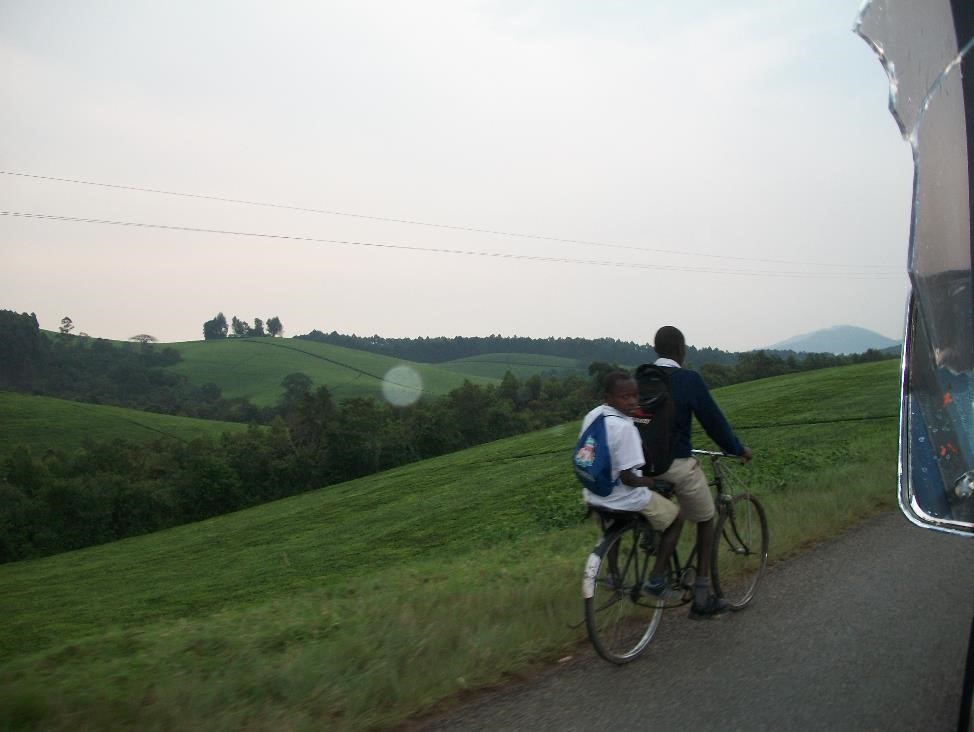
Tea and mountains:
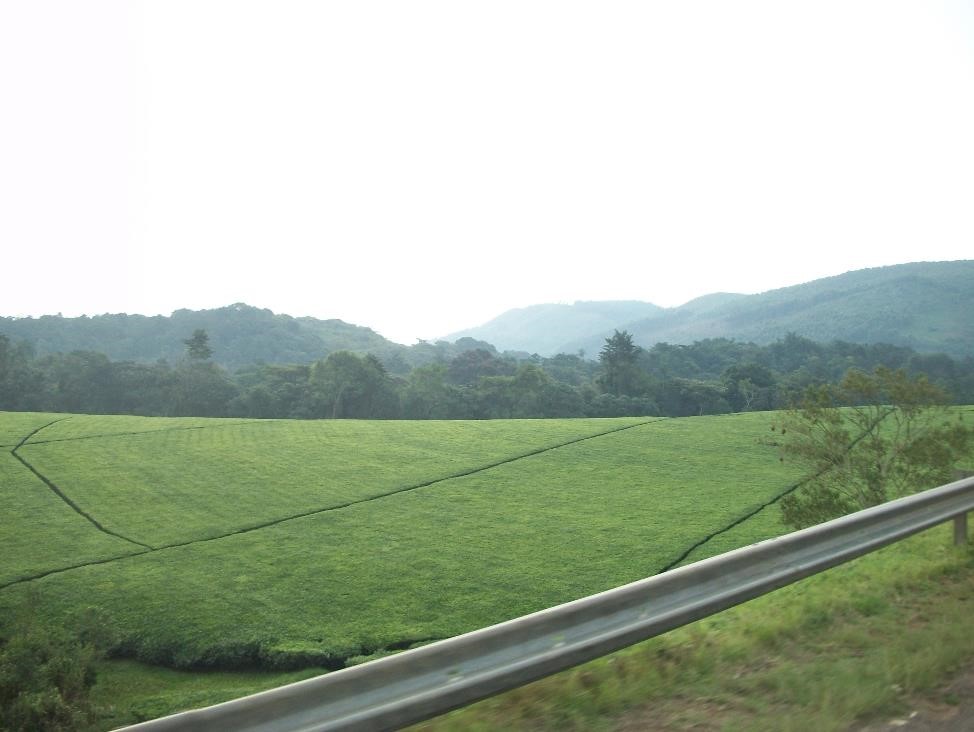
Eucalyptus groves:

A pretty classic-looking Africa plain. Just add lions and elephants and zebras and stuff with your mind:

What the heck? What are those little furry dwarf-looking things just hanging out there on the side of the road?
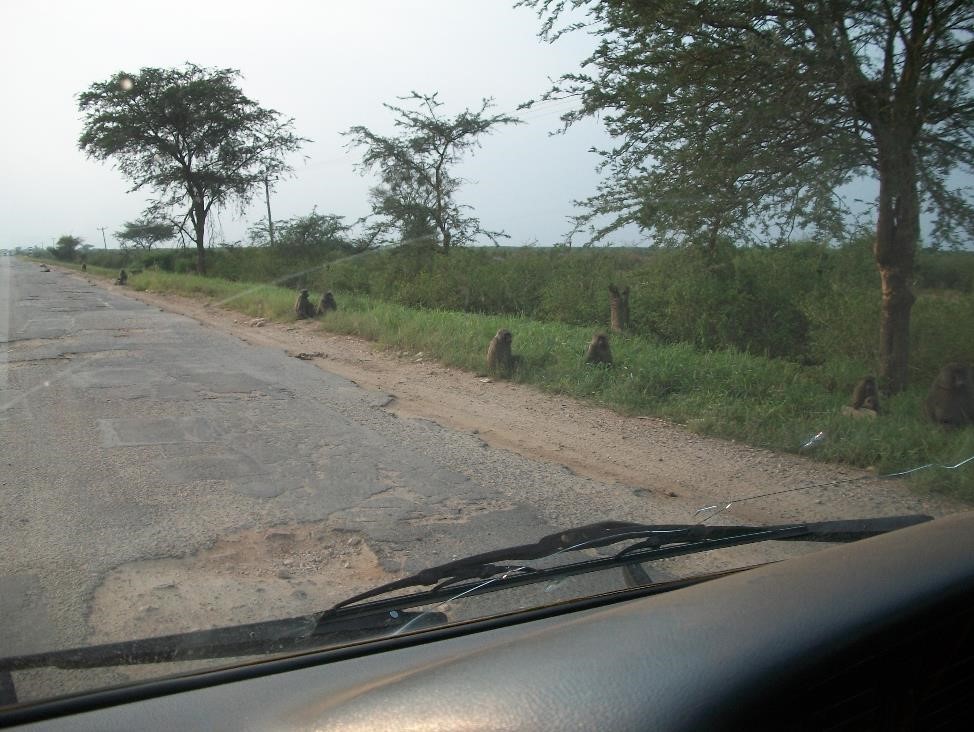
Monkeys!

Crossing into the North:
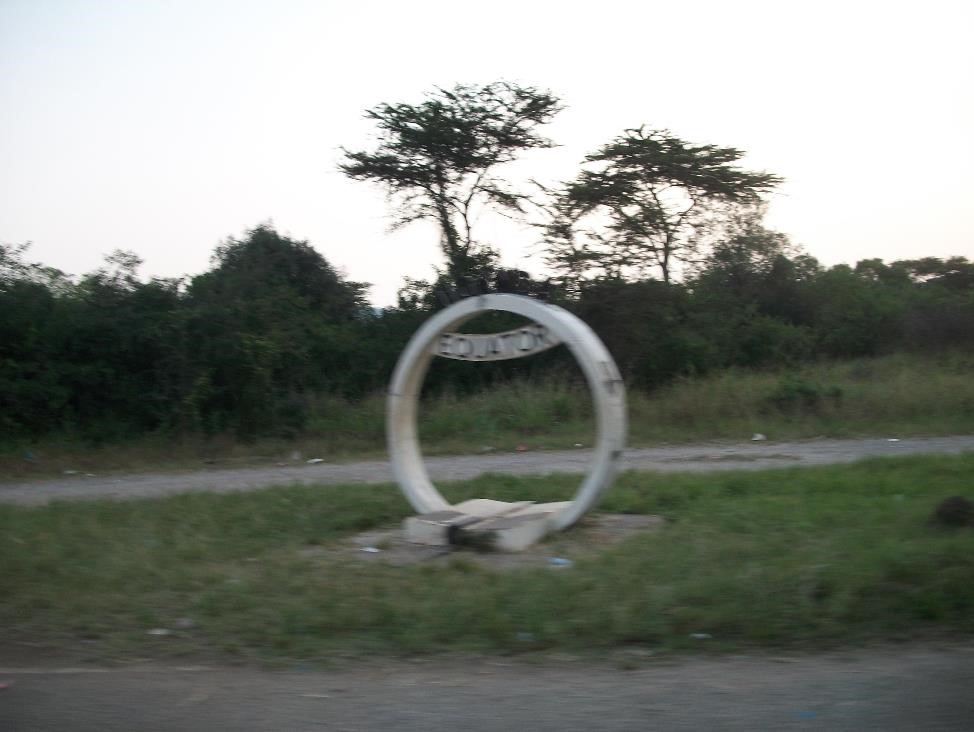
A pretty great sunset (a mere shadow of the real thing, of course):
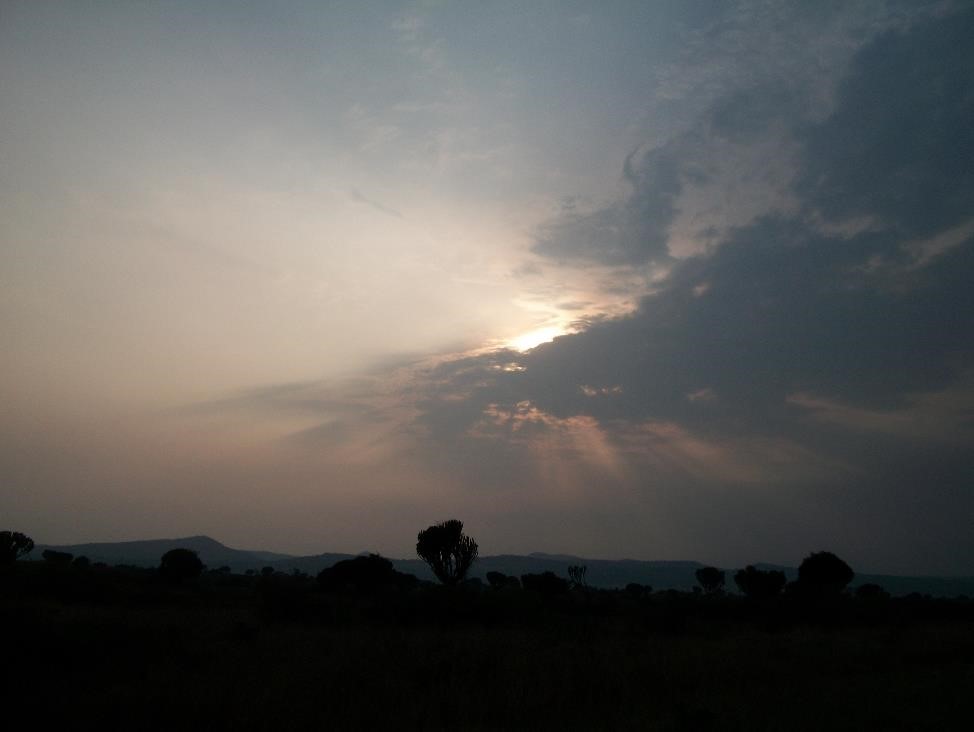
6.21.14
I settled in at Fort Portal and spent most of the day on this journal. To be quite honest, most of yesterday’s thoughts were actually written today. I hope that this does not warp your space-time continuum or anything cosmic and disastrous like that.
6.22.14
Fort Portal is known for its tourist attractions. Or rather, I should say traps. I fell into a couple of them today. Hard. My first odyssey entailed getting mauled by a couple of gigantic guard dogs while looking for signs of life at Holy Cross’s novitiate house on a beautiful property at scenic Lake Saka. While I didn’t succeed in finding anyone after poking around a bit, I received a really important lesson in canine psychology. I didn’t know this before, but when dogs are thinking about really attacking you, they start by nibbling at your hands first, as if to test your willingness to fight back. I took it for play, though, and kept about my wandering around the premises. Then they start pawing and even jumping up on you and barking really loud. By this time I realized that indeed the place was vacated and it was just me and the two gigantic Doberman pincers, with nobody around to call them off. Then they start nipping and biting and it starts to actually hurt. But the worst part is the visceral, primal fear that takes hold because you realize that, whoa, how did I get here, and yeah, there’s nobody here to call them off, and, oh my gosh, they might actually kill me. And you are afraid and they know it, and they can smell the fear, and they start going crazy. Luckily, though, by this point I had done enough terrified, fast-but-not-too-fast walking while getting nipped pretty hard that I was almost to my motorcycle driver, whom I had, thank God, asked to stick around while I checked out the property. I think that he was a bit concerned too, because he didn’t just gun it out of there right away; dogs can run faster than motorcycles while the motorcycles are still accelerating. As we gingerly made our way out, the bigger dog was still taking nips at my leg, definitely hard enough to get my attention and freak me out. At one point, though, my Vergil gunned it. Right into a ditch. We tipped the motorcycle and slid, and luckily were OK, but not yet safe from our pursuers. The driver saved us by letting out a primal growl, and the dogs responded by backing off. I think that they understood that we were in a corner now, and might actually put up a fight. It wasn’t so much a game anymore. Additionally, we were close enough to the novitiate entrance that they could probably satisfy themselves that they had chased us off with all due courage and propriety. We got on the bike and took off, and it took my nervous system an hour or so to really get back to baseline.
The second trap was just a regular old tourist attraction scam job. There is this extensively-vaunted waterfall and cave area around Fort Portal called the Ambere Caves. I took the 20 minute motorcycle ride out, haggled the entrance price down to from $10 to $6, which is still a lot of money around here, and was escorted through a forest to an unimpressive waterfall and some 5-foot indentations that somehow passed for caves. Pretty lame. Such is the lot of the tourist. It was actually a positive experience in that it made me really grateful for all of the really rich experiences and relationships that I’ve fallen into so far, and really thankful that I am only spending one weekend and not the entire two months in tourist mode.
The much-celebrated waterfall:

6.23.14
I had a couple of really formative and great meetings this morning. I don’t have time to describe them right now, but I will try to relate something of them soon.
I spent the afternoon travelling from Fort Portal to Kampala.
Pics:
Moustache ahoy! (Keep your doors locked and your children inside the vehicle!):
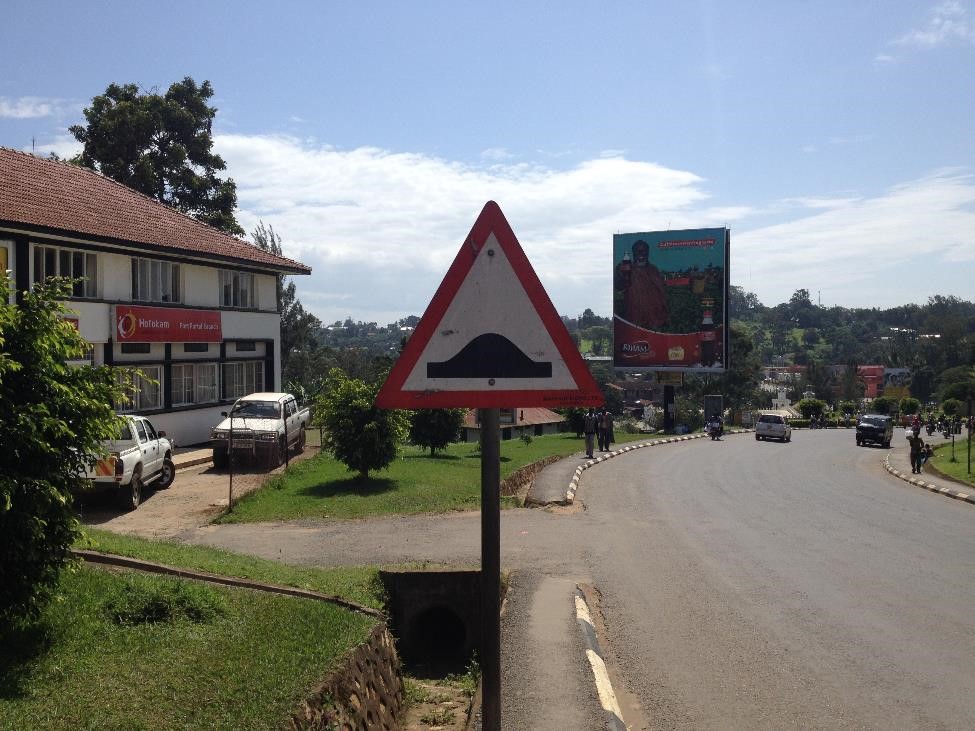
How many Ugandans does it take to change a tire? Exactly 31; one to crank the bolts, and thirty to sit around and hang out.
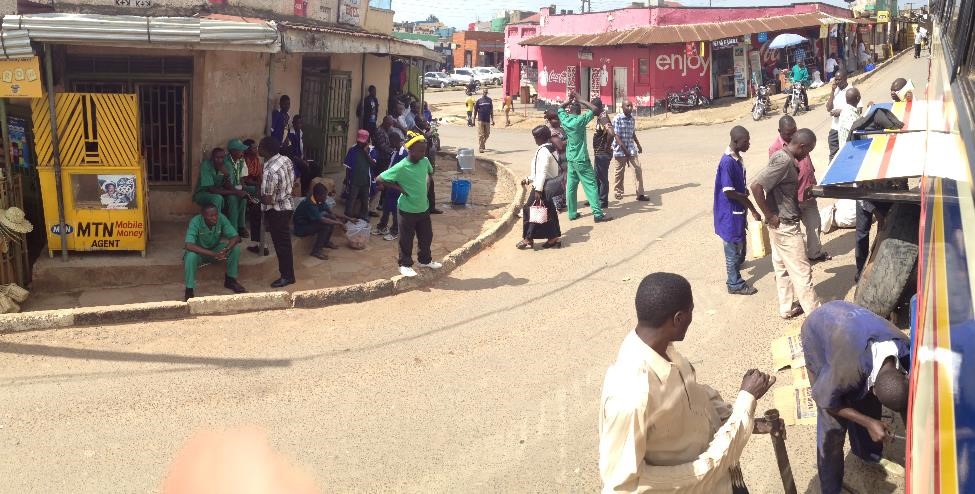
There’s a lot of hanging out that gets done around here. As I mentioned, Uganda has a ridiculous unemployment rate. And on top of that, the country is not exactly chock-full of go-getters. And why should it be if there is not really much to go get?
Your friendly neighborhood mosque, a common sight in Uganda:
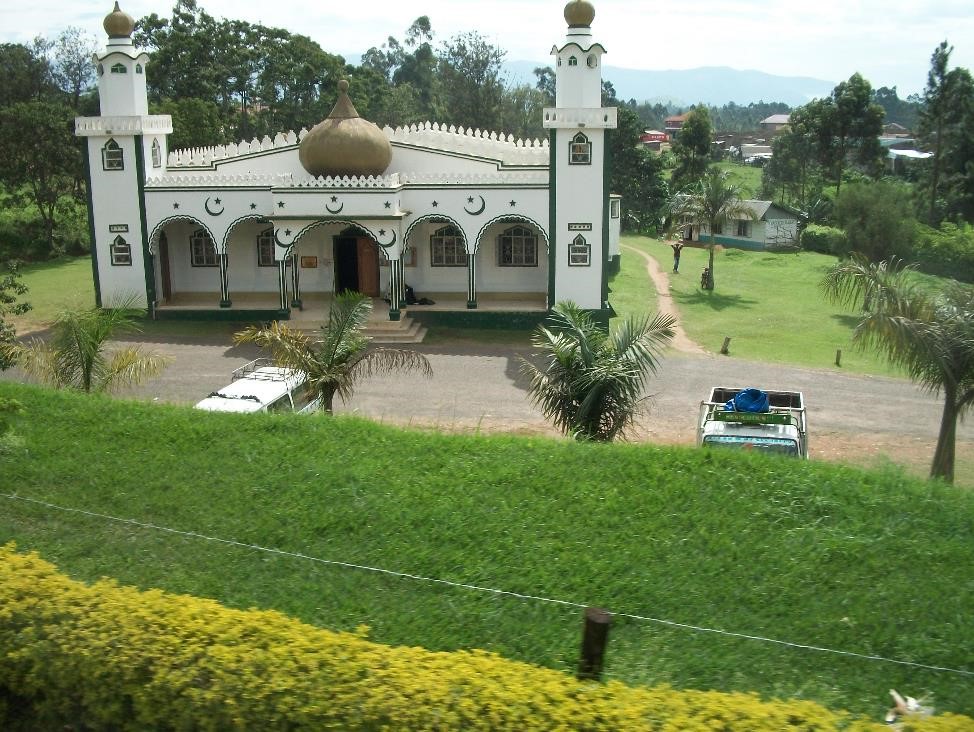
The typical throng of street vendors that attacked the bus at every stop:
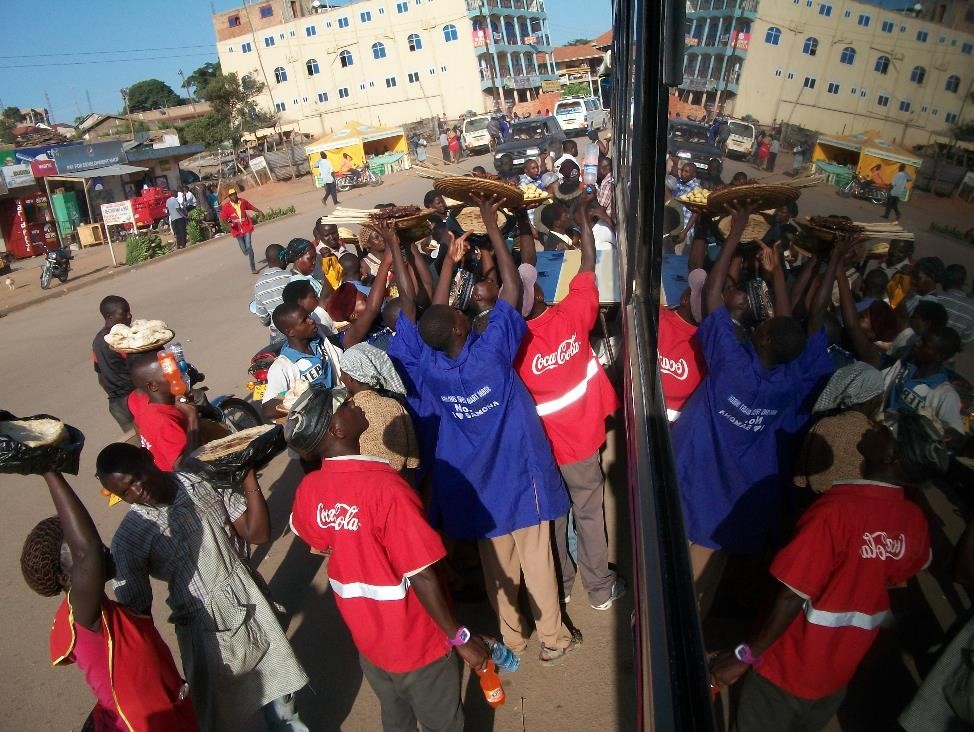
The competition (JK. Sort of.):
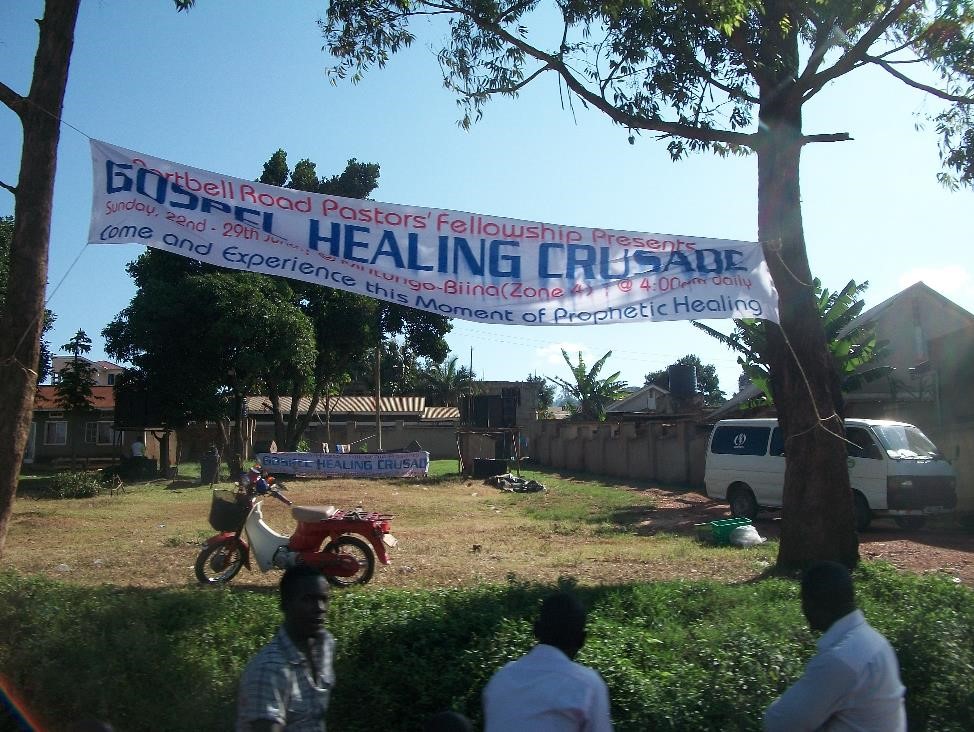
I landed on my feet at a great hostel in a suburb of Kampala called Butabika, right across from the hospital in which I hope to hang out over the next couple of weeks. Stayed up pretty late talking to an Australian and a Canadian about all manner of interesting things. It was one of my first extended conversations with international tourist types. Again, it made me realize how fortunate I’ve been so far to get into the culture quickly and not linger on the tourist scene periphery, which has been my not-totally-unpleasant, but also not very culturally-engaged lot on trips to other countries in the past.
6.24.14
Found my way back to the street boy slums with a medically-minded organization that I learned about just before I left Kampala a couple of weeks ago. I describe the experience below, so I will not be redundant by describing it here. It was really good to see some of the old buddies, and they were really and inexplicably happy to see me.
6.25.14
Over the next four days, I will take a picture of the sunrise on my way out of the hostel for morning Mass. Enjoy.
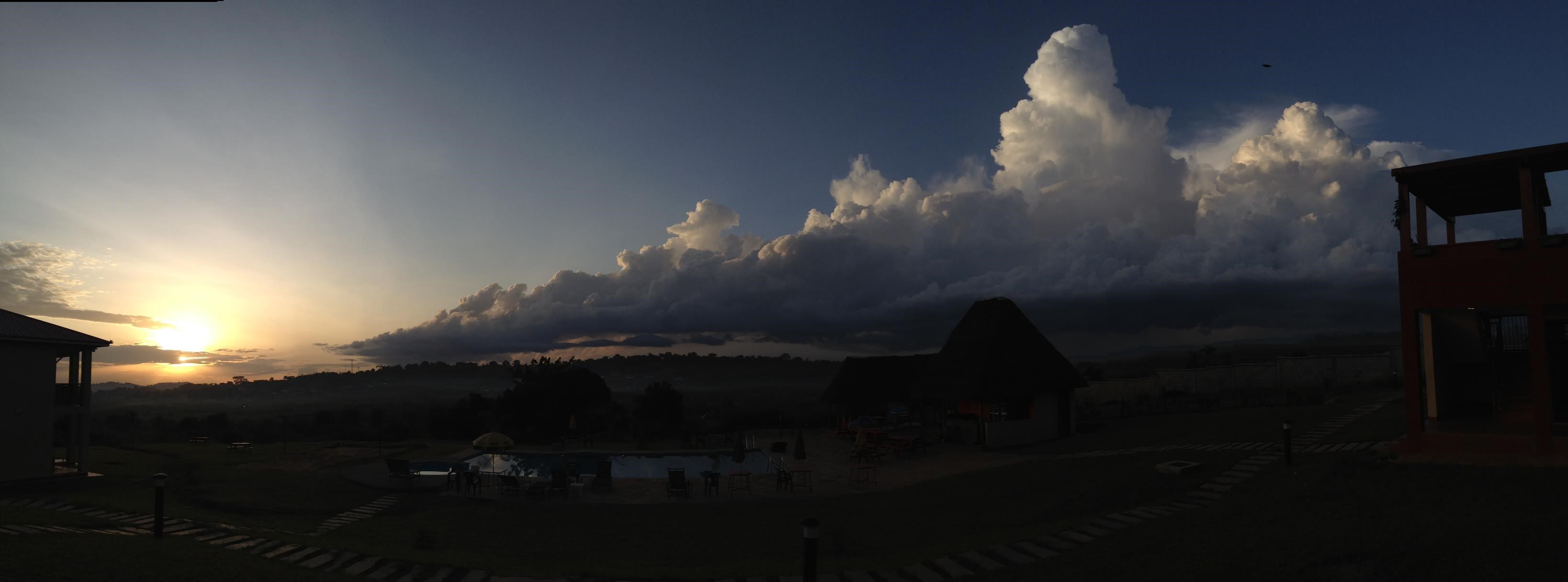
I write this from Mulago Hospital, the main public hospital in Kampala. I came here to accompany a 34-year old dude that I met last night at a slap-dash wound clinic in the slums. By slap-dash, I mean that I was the only one among the three providers with any medical training, our facilities consisted of a 5’x5’ plot of grass in a school soccer field, and our medical supplies fit in a grocery bag. Most of our patients were street boys with superficial skin wounds. A couple of more gravely afflicted patients found their way into my grassy little office in a 3’x3’ swath adjacent to the 5’x5’ main ward. One of these dudes, Mousa, had been hit by a motorcycle taxi three weeks ago, and had knee pain and swelling. I did a few diagnostic tests and found that upon flexion, an abnormal bony knob protruded from the anterior aspect of the dude’s knee and he experienced a lot of pain. Also, please appreciate the caplessness of the left knee:
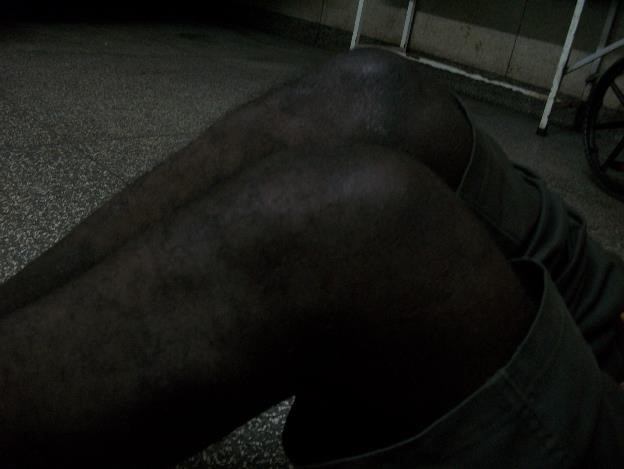
A patellar fracture seemed like a prime candidate for a diagnosis. So we decided to meet up the next day in order to head over to Mulago Hospital, the main State hospital in Kampala. This morning, Mousa was accompanied by one of his fellow slumsman; we met in the emergency room, or rather, the Casualty department, as it is called in this country.
Please notice the patient names on the marquee; HIPPA hasn’t made it over to Sub-Saharan Africa quite yet.
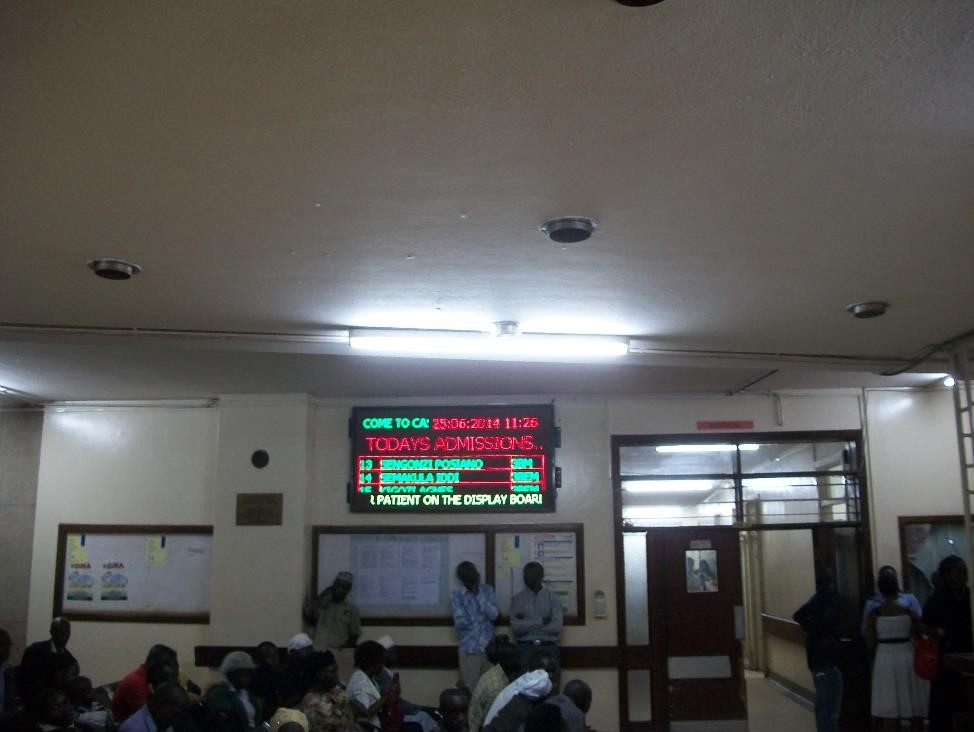
It took us only about 30 minutes to see the nurse practitioner (a surprise given the number of people around and the fact that we hadn’t yet sunk to bribing anyone), who referred us to the x-ray people, and who told us to come back x-ray in hand. At that point, I took off to see the medical school about a shadowing gig, with the assurance of the slumsman that he would wait with our patient. I returned from my business an hour or so later, only to find Mousa exiting the building; literally ten seconds later I would have missed him. He reported that his accompaniment had left, and that he was leaving too. I looked at the x-ray and saw this:
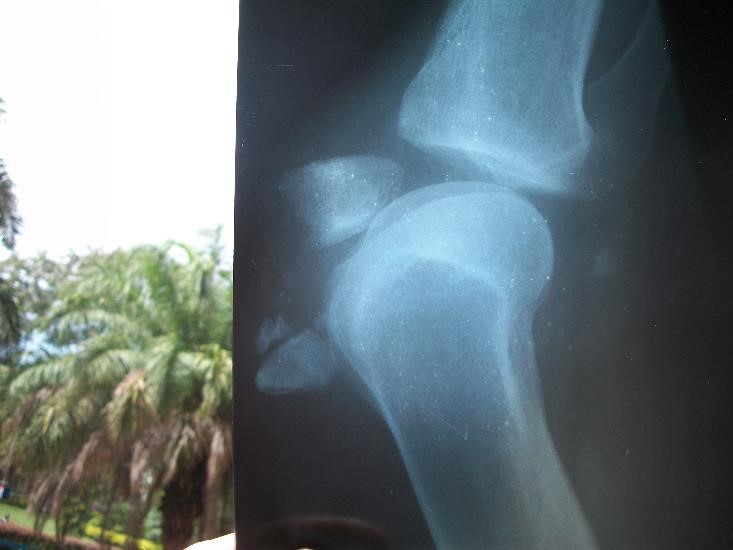
The bone at the top of the pic is the femur (the thigh bone), and the one below it is the tibia (the lower leg bone). It doesn’t take much anatomy expertise to see that this guy’s kneecap was busted right in half. So I counselled Mousa to follow up with the nurse as we had been previously instructed to do. She confirmed the patellar fracture and then admitted Mousa to the Surgical ward. Mousa was to remain there for three days while the docs assessed the case, and while he progressed to the front of the long line of surgical candidates in front of him. We went on up to the surgical ward (I should note that Mousa had been ambulatory this whole time), and found that they were cleaning the place. This meant that all of the patients were exiled to the waiting area temporarily, and that we had to wait until the sweeping and squeegeeing were completed before settling in. At this point, I left him to find a blanket and some food (please refer to 5.16.14 for a word about the limits of hospital provision). I returned about 45 minutes later to find that Mousa was gone from the ward. I waited around for a bit, and then made my way to the café, from which I write presently. Now I will go up and see if I can find the guy. Stay tuned…
I looked for Mousa for a while, couldn’t find him, and decided that he took off. My thoughts turned to past experiences of recalcitrance. I lumped Mousa in with other failed aid attempts at helping homeless folks, and started philosophizing about why it is so difficult to help them. You can’t help those who won’t help themselves…no good deed goes unpunished…you can lead a horse to water, and all that self-pitying, self-excusing, defeatist internal rhetoric. I eventually gave up and returned the blanket to the vendor. On my way back through the hospital, however, I decided to do one last pass-through. No Mousa on the ward. On my way out the ward door, I passed Mousa coming in. Boom. Second totally fortuitous last-chance encounter. He got settled in a bed, I rebought the blanket, and now we wait.
A lot. I re-found found Mousa around 4:45pm, and now it’s 7:15. The time on the ward has been good, though. It’s probably really important for med students to go through some experiences of waiting for the doc. In fact, it should probably be part of the curriculum. I’ve heard the stories and seen the x-rays of about four other patients around us, a few of which I will relate below.
The doc just came to see to guy in the bed next to ours (I say “ours” because, as you might remember, we caretakers and patients are all in the same boat here. Or on the same bed rather. I’m chilling on the foot, facing the head, and Mousa vice versa. We’re in a section with 13 other beds right together, no curtains or anything. There are three sections in the big ward room, each separated by a wall that goes only half way up to the 13’ ceiling.). Our next-door neighbor got hit by a trailer this morning. It fractured his femur like this (maybe not for the squeamish):
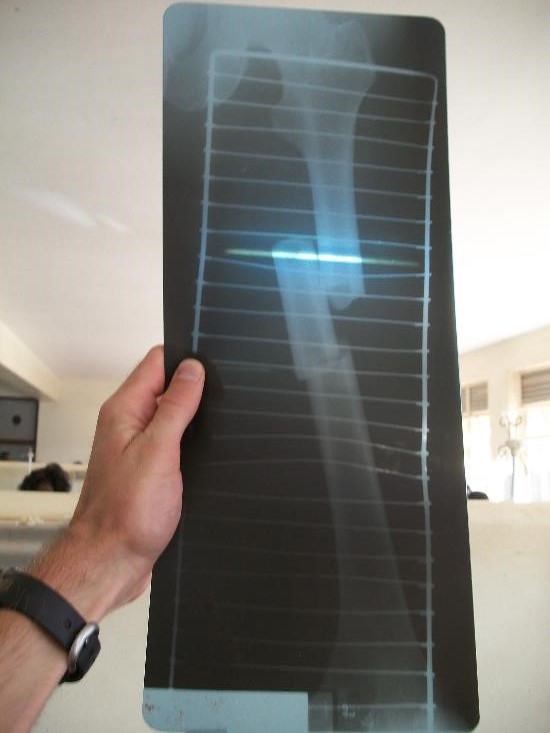
And his tibia like this:
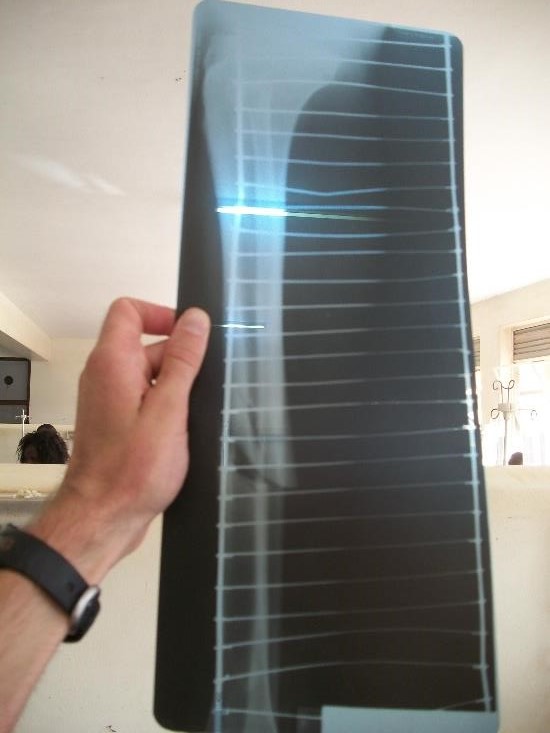
(Is this getting to be too much with the x-rays? I hope that you will please indulge me for a bit. It’s a big deal for medical types to know what the fractures look like.)
The fractured tibia point actually popped right on out of the dude’s skin (please don’t look if you are squeamish about this kind of thing):
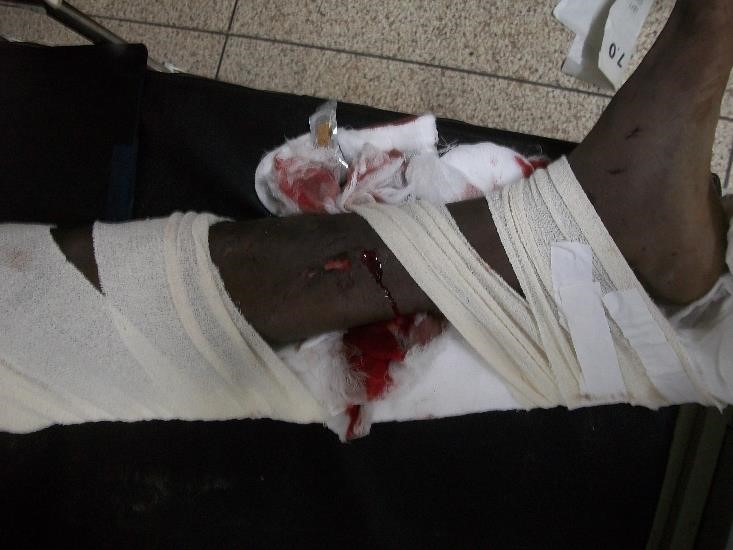
The doc felt around a bit, pulled here and poked there, and decided that the guy needs surgery. Here’s the thing, though: there are two options for somebody in this position. The first is to get in line behind about 90 other orthopedic injur-ees, and wait at least 2 weeks for surgery. In that amount of time, according to the doc with whom I was working, the bones will form callouses, they will heal worse, and there will be a lot more bleeding during surgery, which means higher risk of dying on the table. The other option is to get into surgery tomorrow. For 2 million Uganda shillings (US$800). Which is an unimaginable sum of money for these folks; the national average per capita income is US$506, so the surgery would cost almost two years’ wages.
Please allow me to pan out a bit. Here is a picture that I took at Mbarara Hospital of a sign posted at multiple points throughout the place (notice the line after “NOTICE”):

And another from Mulago (my current gig):
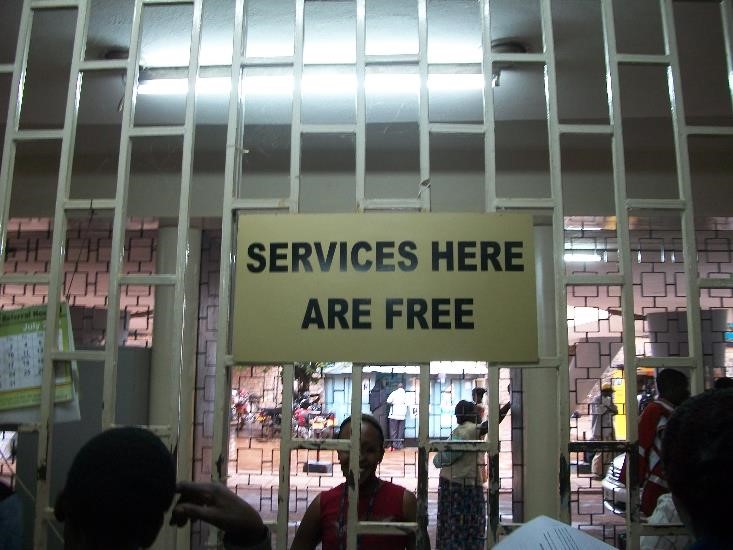
Please notice the systematic irony here. “Services in this hospital are free”…except for when they aren’t. Bribes are illegal, but it is at the same time legal to pay more for better services. Isn’t that the definition of a bribe? Especially in the context of purportedly free healthcare? Here is the appeal to the Market again, rearing its sly, furtive little head. If people have an interest in perpetuating the bribery scheme, and everyone with any power here does, it only remains for them to institutionalize it according to free market principles. The two-tier arrangement is a formalized proposition here in Uganda. The arrangement is especially egregious in Uganda because the free services are of a tragically low quality, and all of the talent and effort in physicians goes to the clients who can pay.
But it is also the arrangement in America too. And I suspect that it will become more and more so as the Obamacare grip tightens up. When physicians are compelled to submit themselves to Medicare and Medicaid payment schemes, and to subsequently cede treatment decisions over to the desk-jockeys, I predict that they will simply opt out of the system and seek freedom to price and treat how they please on the private market. This move need not necessarily be motivated by greedy motives, although it probably often is. In fact, it is a move to which I am quite sympathetic. The government and corporate insurers and I are on totally different pages about what health entails and how to properly pursue it. I do not plan to march by their tune. The private market is the way out.
In Uganda, though, the situation is much more stark than in America because, as I’ve mentioned before, it’s a long way down to the bottom of the pit. And most people live there perpetually. Whereas in America everyone can get high-quality healthcare, in Uganda it is only available to the rich. Some readers might be surprised when I say that everyone can get high-quality healthcare in America. Didn’t you just lead a course called “Healthcare: Policy and Poverty” at Notre Dame last semester? Haven’t you been paying attention to all of the hype about what a disaster the American healthcare system is? Yes, I’ve been paying attention to the hype. And I think that it is all a matter of perspective and media spin. Does the American healthcare system waste more resources than other systems? Maybe. You should have heard the great conversation that I had with an Australian pediatric surgeon at my hostel a couple of nights ago. He feels like so much of his efforts are wasted on people who don’t understand the value of healthcare. When you live in a country where healthcare is a “right,” and services are provided by the government, people take it all for granted and adopt overblown expectations for care, and irresponsible habits regarding their own participation in their health. That leads to plenty of waste. Does America have worse access for the poorest members in society than for the richest. Sure. But the lowest level of care is still of extremely high quality by any standards, but especially from the perspective of any of my fellow ward-dwellers at Kampala’s finest. Anyone in America, and I mean anyone, can walk in to their friendly neighborhood Emergency Room and get the best quality urgent care in the entire world. That’s nothing to sniff at, even though it is a really wasteful way to go about primary care medicine. And is the delivery of primary care medicine less than ideal in America, and do we need more family docs dedicated to taking a pay cut in order to serve poor folks? Sure. That would be nice for any society. All of this hoopla about training more primary care docs is basically a scam to get highly skilled people to do more work for less money. That’s one way to balance the books, I suppose. Don’t get me wrong, I think that primary care is important, and I might end up going into it, but there should be less salesmanship and more straightforward reimbursement involved. If the powers want more PC docs, they should figure out a way to remunerate them more appropriately. If they think that the work is so important, then the payment and power structures should reflect that. (And now the last in my little series of rhetorical flourishes) Does America offer far-and-away the most superb diagnostic and treatment options known to man? You bet. Many aspects of American medicine are nothing short of miraculous if you think about it. And despite all of the hubbub, these options are widely available to broad swaths of the population. My little sister got her face bashed in by an oncoming bicyclist last year. The guy broke her nose and her orbital bone (the bone that surrounds the eyeball). In Uganda, she would probably have ended up with debilitating eye-alignment, a deformed nose, and prominent surgical scars, no matter how rich she was. In Dallas, Texas, she was able to receive surgery from an immensely talented and experienced doc, it was covered by insurance, and she emerged with no long-term repercussions. That’s amazing. Some people criticize the system for excluding folks who can’t afford insurance. This relates to the, in my opinion absurd, notion of a “right” to healthcare, which I hope to write more about soon. But for now, let it suffice to convince the reader that my sister’s excellent plastic surgeon is warranted in his desire to be reasonably remunerated for his tremendously helpful services, that he is therefore warranted in expecting that his patients will be covered by insurance, and that it is therefore just to expect people to pay for their superb healthcare. Talking about a right to healthcare is like talking about a right to a Mercedes or a right to a steak dinner (I realize that this point deserves a lot more discussion; I plan on undertaking it soon). This surely, though, does not mean that the doc is absolved of his Christian duty to charitably serve the poor. In fact, the particular plastic surgeon in question happens to be a family friend, and we happen to know that he spends months out of his year doing cleft-palate surgeries and the like in South America on his own dime. The question of whether these people have a right to healthcare is an issue, as I mention above, that deserves more treatment later. My main point here is that the American healthcare system is actually pretty fabulous, even if a lot of non-paying people have to settle for really good healthcare while the paying folks get ridiculously amazing healthcare. The problems in our system are minor inconveniences compared to the absolute crises that people constantly face here. It takes a trip to Sub-Saharan Africa to put things in proper perspective, I suppose.
So what’s to be done for our next-bed neighbor with the shattered led? Not much, apparently. At least not by the system and not right now. It leads one to wonder, What is the use of keeping the waiting list for surgery so long? Theoretically, couldn’t the powers just catch up with the case load and start being prompt again. But that assumes that the numbers would be the same whether or not the patients get the surgeries now or two weeks later. And I suspect that the trick here is that the numbers end up being quite different. As time goes on, the line dwindles. Most of the crowd probably can’t afford to wait in the hospital that long; you might remember that hospital stays are really time-, money- and energy-consuming for patients and their families (see 5.15.14). A lot of the cohort probably comes up against prohibitive hidden fees; for example, additional x-rays are charged to the patients, and patients without any money cannot afford any treatment, no matter how cheap it is. And some of the cohort probably don’t survive. Overall, the delay tactic makes sense because it thins the herd. TIA, brew. I could be totally wrong about this; maybe people wait because the more emergent cases get priority, and maybe the system prioritizes people based on their ability to withstand the delay. But I don’t think that the system is actually so circumspect and organized.
The night ended on a fascinating note. This doctor turned out to be a tremendously friendly and generous guy. He invited me along on the rest of his rounds, and taught me some great orthopedic diagnosis. During the course of rounds, he let me reduce the trailer victim’s leg. Reduction involved basically pulling firmly on the guy’s foot and keeping the leg in alignment while the doc wrapped the leg in plaster of paris. I was essentially working against the patient’s own leg muscles; whereas they had contracted and forced the bone fragments into the jacked up alignment observable on the x-ray, I was stretching them and straightening things out. The bones went back in line and the guy’s pain disappeared immediately. Pretty cool, huh? The surgeon will operate in a couple of weeks to put rods in the bones to get them in line for proper healing. Pretty intense. I will join the doc tomorrow for some surgeries. Which is nice.
6.26.14
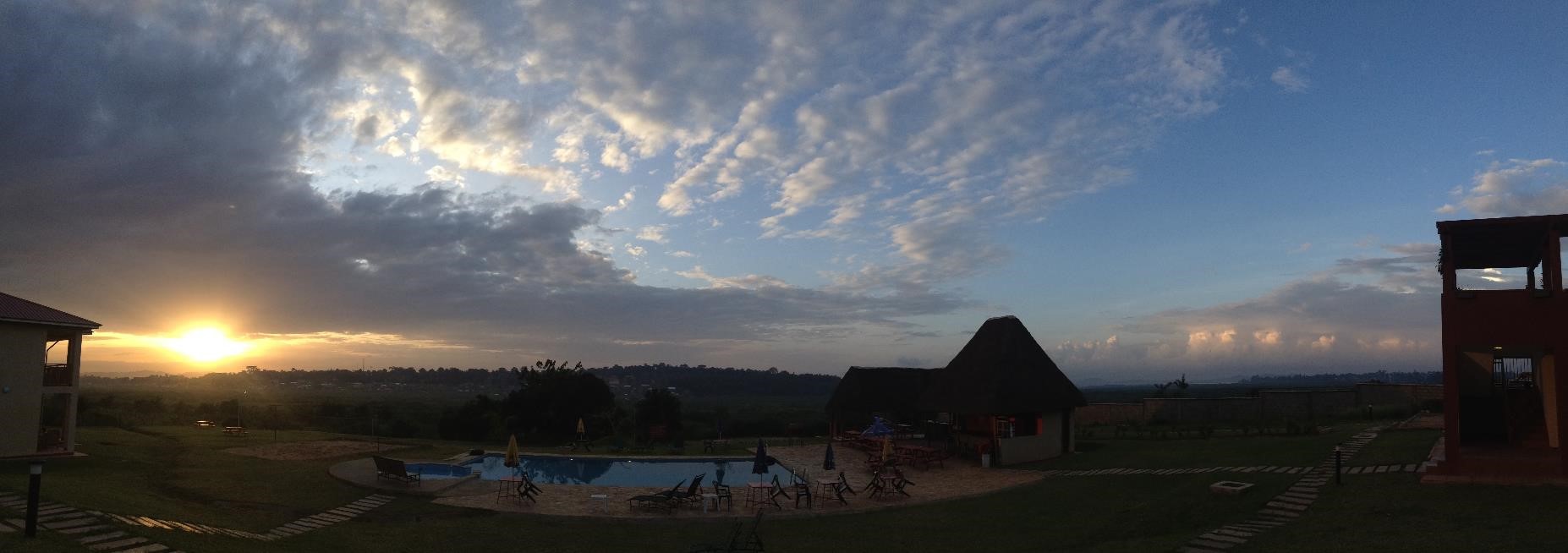
Big day. A lot happened. Need time to process it. I will try to add to this post soon.
6.27.14
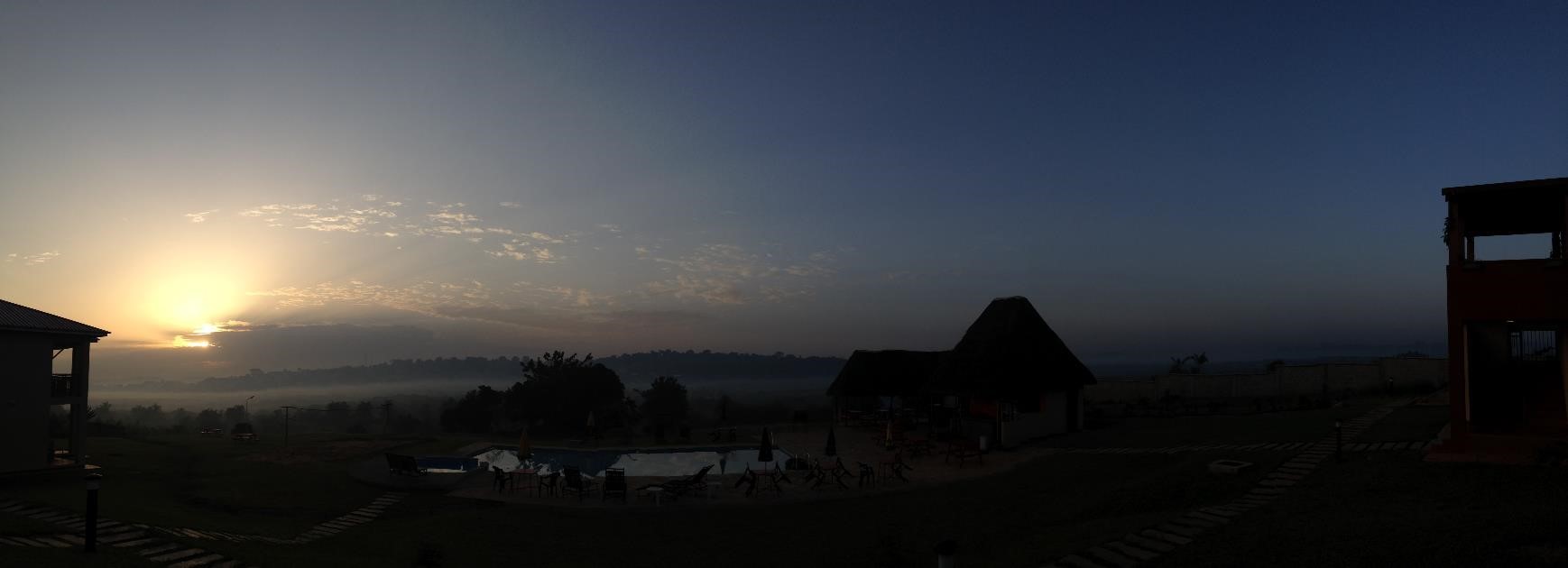
I spent the morning acquiring a brace for one of the patients that the doc and I saw a couple of nights ago. I will try to introduce the patient soon. The doc introduced me to his superiors who invited me to spend next week with the residents. Sweet.
Lunch with Julia Fitzpatrick, a friend from ND who is here for a week doing consultancy work. It was great to see her and catch up.
6.28.14
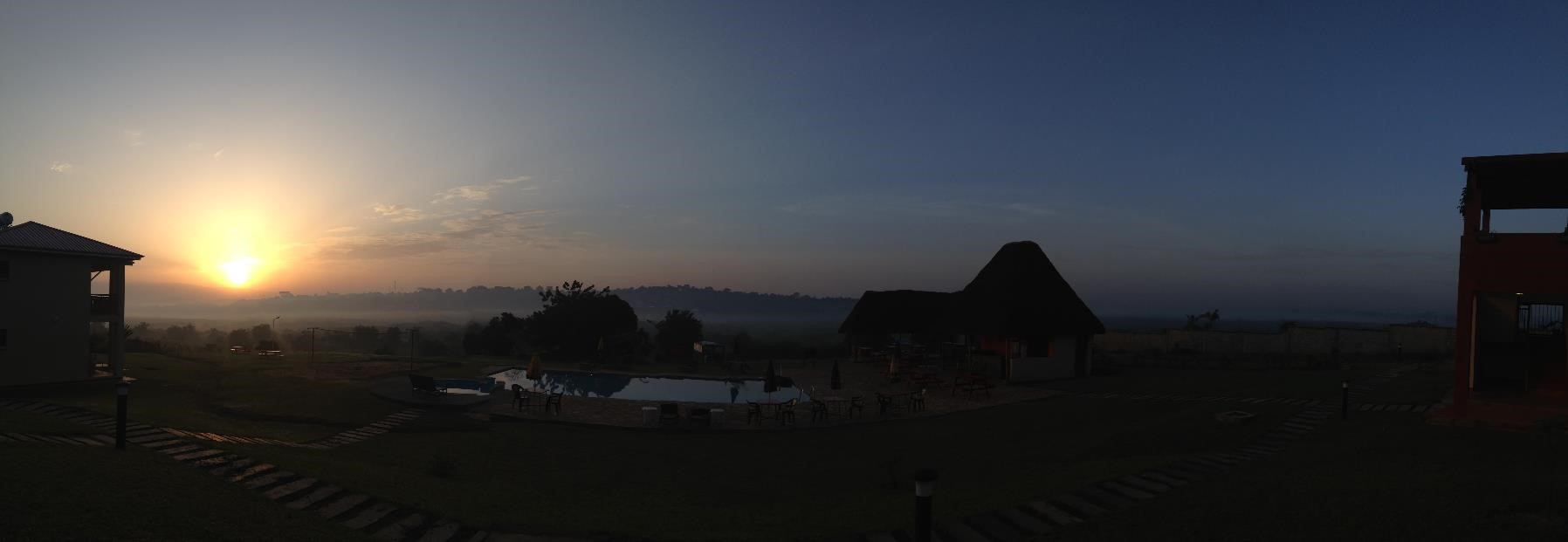
This trip has been tremendously clarifying in many ways. I will name a few of them here.
A couple of personal clarifications first. One: Throughout this trip, I have come to see the prospect of my pursuing a Ph.D. (in the History and Philosophy of Science, History, Philosophy, or Theology) as a waste rather than a challenge. Before this trip, I looked at a Ph.D. process like a marathon or a mountain climb, both of which bring out the bravado in me and actually tempt me by their difficulty. Now, as a result of meeting the folks I’ve mentioned here and knowing a bit of their situations, I realize that spending five years reading a bunch of mostly boring books, writing a bunch of mostly boring papers, writing a tremendously boring dissertation, and trying to pretend that I was really interested in all of it would not only be foolish, but it would be selfish and wasteful as well. Especially considering that I am already on track to get a credential that will allow me to fill the rest of my working life with plenty of helpful activity. This trip has helped me to realize what an astounding amount of need there is in the world, and that there is an urgent imperative for folks in my position of power and privilege to get to work. (Some of you might not have even known that I was tempted to pursue to Ph.D., and to others, what I’m saying might be totally obvious. I just thought that I would mention it here in case it helps anybody else facing a similar deliberation. And please do not take me to be saying that all Ph.D. work is useless, irresponsible, and/or boring. On the contrary, I think that getting a profession is one of the most important things that a young person can do, that pursuing a Ph.D. is a good way to go about it, and that some people do genuinely interesting work. It’s just that I am already on track to get my D. elsewhere. And neither am I saying that pursuing an M.D. is any less boring at times; entrance into any profession involves a lot of hazing ritual, it seems.)
A second personal clarification related to the first: It’s really important for docs to know their stuff. I will say more about this soon. This revelation pertains to something that happened a couple of days ago in the hospital. The experience is still processing, but I will hopefully be able to describe it soon.
A general clarification: If you want to show up in Uganda and try to help people, you’d better bring lots of money. Your own money, somebody else’s money, your University’s money, it doesn’t matter. For starters, you need a bunch of cash just to live on; this m’zungu needs about $25 a day to sleep in a tolerably peaceful and refreshing place, to buy healthy food and water, and to do a bit of travelling. That comes out to $750 per month. Throw in a plane ticket and the number doubles. Keep in mind that the average Ugandan lives on $506 a year. In these two months, I will have gone through as much money as 40 Ugandans. The other part of the picture is that money is just about the only thing that makes me useful around here. It’s my superpower. And it doesn’t take much of it, by our standards, to make a splash. My most important work over the past few weeks has been buying things for people in as judicious a manner as possible. Inhalers, school fees, a paralysis-preventing back brace, food for folks in the hospital, stuff like that. I think that my efforts have borne some fruit, and it is gratifying to throw my weight around a bit. (I’m not being ironic here. I’m just trying to tell it how it is in my own little imperfect experience. I understand the critiques, but I’m not worried about toeing the line at the moment. Please understand that I am also not in the least bit trying to say that I am doing any good here either. I’m mainly spending money that Notre Dame gave me. And I’m not doing the stuff out of particularly virtuous or generous motives; I’m doing it because it’s fun.) I might include a series of the Magnificent M’zungu and his Magical Money episodes soon, just to illustrate what I mean. The point is that the best, and maybe only, way to really be of assistance over a two month trip to Uganda is to bring as much money as possible and buy a bunch of stuff for people, hopefully in a way that doesn’t foster dependence. Over a longer period, one might be able to comprehend enough of the language, culture, and tribal code to actually connect with the locals like the White Fathers do, but otherwise it behooves one to pony up.
More clarifications soon, I hope.
I had a great little revelation whilst on a run just now (and in order to serve it up fresh for you, dear reader, I have risked jeopardizing my impressive screen count by sweating all over my computer). This usually happens to me on runs. Many of the ideas blow my mind, but I often wonder if they would blow anyone else’s, and whether perhaps I am just particularly impressionable whilst high on endorphins. I will take a gamble by sharing this insight in hope that somebody else’s mind might get blown too.
Both the Left and the Right maintain a double standard with respect to legislating morality. The Left proposes legislating economic morality, while the Right proposes legislating sexual morality. The Left uses the Right’s predisposition as an accusation, but the Right doesn’t seem to have clued in to using the same argument against the Left, or at least it’s not an argument that I’ve heard before. The Left accuses the right of legislating morality with respect to abortion and same-sex marriage (viz. the Ugandan Anti-Homosexuality Bill, the arguments surrounding Roe v. Wade, same-sex marriage laws in America), but then they go on to complain about the Market and the 1% and they push to have the government regulate everything. The economic issue is just as much a moral item as the sexual one. In fact, Economics was traditionally considered a branch of Moral Philosophy; Adam Smith, for example, was a moral philosopher by trade. I think that the Right could do a better job catching the Lefties out on this inconsistency. If the Left wants to legally compel people to pay for the poor in the form of higher taxes and the welfare state, then they should probably be more willing to entertain the idea that fetuses and the institution of marriage should be protected under the law as well. As a case in point, last semester I had an ultra-liberal ideologue professor tell me that she thinks abortions are reprehensible, but that she doesn’t want people to be oppressed for their convictions about getting them; this woman is, at the same time, one of our country’s foremost voices in promoting environmental regulation, and she is a stanch champion of welfare. But at the same time, the Right should attempt to be more consistent by compelling the wealthy to share the loot.
I do think that there should be different standards for different kinds of immorality, that the far more grave sin of directly killing totally innocent people is more deserving of harsher legislation, and that economic policy should not be quite as stringent; in sum, I think that the Right’s double standard is more defensible than the Left’s. But at the same time, the Right would do well to cede some ground here to the Left, at least for the sake of consistency, and at best for the sake of their Christian duty to serve, support, and protect the poor. They should put some sincere effort into implementing creative and maybe even legislative ways to curb the outrageous pilfering that passes under the auspices of investment banking and corporate profiteering and the like in our country.
And whatever strides the Right is able to make in our country should be desperately encouraged in its brothers and sisters in the power structure of Uganda. The masses of humanity here depend on such a conversion for their very lives. In this setting, as compared with America, the laws regarding abortion and the laws regarding economic policy and corruption are more similarly important since here poverty is much more often a matter of life and death than it is in America.
I hope that it worked. If this is not very impressive to you, then you probably need to go for a run.
I spent the evening with the streetboys in the slums again. My friend David, their informal pastor, wanted me to give a talk about God’s love. It was a different audience, so I brought out the same schtick that I used last time. It keeps getting better and better. After I delivered, David had me pray for the guys individually. They got in line for it, and one by one we spent some time together praying for each other. It was good. I got some solid prayers out of the deal, and God might even have deigned, inexplicably, to listen to a couple of mine.
A not untypical scene of Kampala traffic, with a few choice specimens of corporate domination in the background. I guess one could make a profound comment about the clash of civilizations or something like that, but I will pass. It would feel too facile.
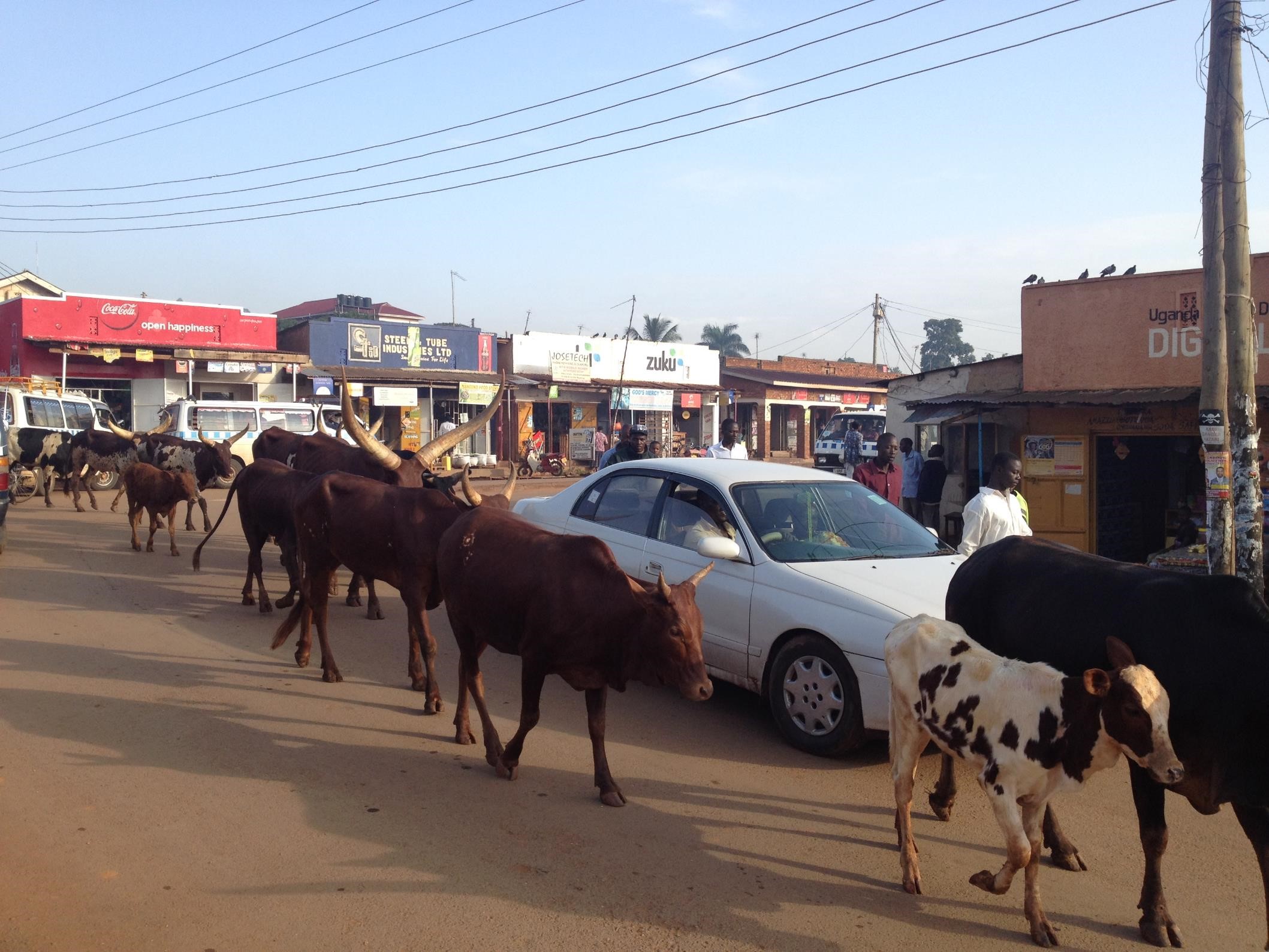
6.29.14
I spent the (Sun)day going to Mass, catching up with emails, doing stuff with this journal, and chilling out and watching a couple of movies. Dinner with an ND friend after Mass. Not much to report.
Oh, except this. There are tons of schools here for all of the tons of children. Naturally. A lot of the nurseries try to copy the images of American children’s entertainment figures onto their walls. Rarely do they turn out similar to their originals, and sometimes the results are actually quite horrific.

Ahhhhhhh! What the?!
6.30.14
Went to Mulago Hospital to spend time with the ortho doc and his colleagues for surgery. Saw a pretty gnarly and rad rod placement. The patient got his femur (the thigh bone) shattered in a motorcycle accident. Here is a pic of the x-ray:
Femur x-ray pic forthcoming.
In order to help the bone heal properly, the surgeons pounded a metal rod right down through the core of the bone. The shattered fragments now have a structure around which to rally for their big healing effort. Pretty good, huh?
Surgery pic forthcoming.
If I chose to be a surgeon, I think that I would opt for orthopedics. Things are quite straight-forward (the root “ortho” means “straight,” in fact). Someone comes in with a broken bone. You fix it. End of story. There is not much else in Medicine that is like that, and the prospect is really attractive to me. It’s more like being a carpenter than it is like being most other kinds of doc. I don’t think, though, that I will choose to be a surgeon. While doing a couple of surgeries a week would be cool--you know, putting people’s bodies back together after car wrecks and stuff--I just can’t imagine spending most of the rest of my life thinking about bones. I’m really glad, of course, that there is a stellar cadre of really skilled people who have undertaken that immensely valuable task. My personal interests and abilities would go way underused, though, and I think that I would be frustrated.
I’m sorry about using these airwaves for a bit of navel gazing recently. It’s just really good to be able to put stuff into words, to formulate ideas that would otherwise remain vague and incoherent. It would be different if I were just writing this to myself. There is something really liberating and encouraging about knowing that there are people on the other end of this who get me and care about what I have to say. It gets the words out when someone is listening. So thanks a lot for that, dear reader. I guess we all sort of live into the room that we find in each other’s hearts, that we are all loving each other into being somehow, that we see and understand ourselves most deeply in the gaze of other people. So to those of you dear friends reading this, thanks for the birthing. And to those of you with whom I am not so tight, well, I hope that you can find your way into the lovingest and most freeing hearts out there, and that you can join me in striving to be one of them for your people.
7.1.14
Editor’s Note: I added lots of pics today, starting at 6.18.14. It might be worth going back and perusing a bit, especially for the sunrise panoramas.
Thought: Medicine has become too much like a laser and not enough like a flashlight. Great for cutting, but not for illumination.
Here is a poem that I got in an email from a dear friend today. I think that it just gets a lot of what everything in the universe is all about.
The True Love, by David Whyte
There is a faith in loving fiercely the one who is rightfully yours, especially if you have waited years and especially if part of you never believed you could deserve this loved and beckoning hand held out to you this way.
I am thinking of faith now and the testaments of loneliness and what we feel we are worthy of in this world.
Years ago in the Hebrides I remember an old man who walked every morning on the grey stones to the shore of baying seals,
who would press his hat to his chest in the blustering salt wind and say his prayer to the turbulent Jesus hidden in the water,
and I think of the story of the storm and everyone waking and seeing the distant yet familiar figure far across the water calling to them,
and how we are all preparing for that abrupt waking, and that calling, and that moment we have to say yes, except it will not come so grandly, so Biblically, but more subtly and intimately in the face of the one you know you have to love,
so that when we finally step out of the boat toward them, we find everything holds us, and everything confirms our courage, and if you wanted to drown you could, but you don’t
because finally after all this struggle and all these years, you don’t want to anymore, you’ve simply had enough of drowning, and you want to live and you want to love and you will walk across any territory and any darkness, however fluid and however dangerous, to take the one hand you know belongs in yours.
7.2.14
I watched a hip replacement.
After surgery, I want to check on Jesus. I met Him on my first rounds with my sponsoring doc last week. He was curled up in a bed and assuming the distressing disguise of an under-nourished, petite woman of about 30 years. She had been crippled by a traumatic vertebra compression that caused a glaring mid-spine deformity and lots of pain. The striking thing about her (I had been inured to all manner of exotic injury by this point) was that she was totally alone and unable to communicate with anyone in the hospital; nobody understood her language. She was conscious and responsive and in a stable medical condition, but totally isolated. And, as you might remember, it is almost impossible to even survive at “free” Ugandan hospitals without a lot of support from one’s people. This woman was truly in one of the most destitute conditions I have ever seen.
During the doc’s examination, it became clear that the woman desperately needed a back brace lest her spine continue to collapse and eventually sever her spinal cord and cause paralysis below her abdomen. Wow. So we were just going to order the brace and spend a few bucks to keep her from getting paralyzed while she awaited surgery, right? Nope. No free lunch here, and no free braces either. So we passed on to the next patient, just like that. Out of sight, out of mind.
Not completely, though. Her condition bothered me a lot, and the next day I mentioned her to the doc. I asked how much the brace would cost and how I could get it to her. The doc was really impressed and cooperative. Throughout the process of acquiring the brace, he kept mentioning how generous Americans are and how selfish people are here in Africa; how Africans only care about their own bellies and are content to turn away while their compatriots suffer and die. I tried to broaden the picture a bit and relate that this kind of charity is easy for Americans because we have enough resources to spare a few dollars here and there, how it is actually quite gratifying for us, etc.. But he persisted. And I actually think that there is something to what he was saying. People here are indeed much more willing to turn a blind eye and a cold shoulder to the poorest of the poor.
There are two aspects of life here, though, that render such a response understandable, even if still inexcusable. If Americans were faced directly with these aspects of life, then I suspect that our response would be similar. The first differing aspect of life here is that the circumstances of the poorest of the poor are much more desperate here than in America. And the second is that most people here lack the resources to do anything significant to help. I suppose that the greater the gap between need on the one hand and ability to help on the other hand, the greater is the temptation to despair. Nobody wants to throw energy and resources into a bottomless pit, especially when their resources are so meager to begin with. In the case of our spinal patient, the pit was a very shallow one and my resources were plentiful; I could exert maximum efficacy (save a woman from paralysis) with minimal cost ($24). No brainer, right? But this is not the kind of problem that Ugandans face in the plight of their compatriots. The widespread lack of food, water, care, and shelter is very different from the need of a cheap and efficacious medical device. The doc was wrong to compare my small generosity with the response of his compatriots to grinding poverty.
The response is simply an effort at self-preservation. Charity is one thing when it doesn’t hurt, and another thing entirely when it threatens the health, well-being, and livelihood of oneself and one’s family. It is the easiest thing in the world for a rich white person to spend excess money, free time, and plentiful energy doing something that makes him feel good and that looks good to his friends and on his resume. But it’s another thing entirely when your kids’ school fees are in the balance, or your rent, or the time and energy that rightfully belong to your wife and kids. If the sort-of-poor Ugandans fail to assist the really-poor Ugandans, what can I possibly say?
In the bigger picture, we are just as guilty as turning our backs on the poor as any Ugandan is. The only difference in America is that third world poverty, the really grinding and destitute kind, is out of sight, out of mind. The Ugandans turn their backs to the people whom they pass every day. We not only turn our backs on them, we effectively deny their very existence. Sure we maintain some vague sense that there are folks out there who are a lot worse off than us, but we are rarely interested in knowing much more than that. And we have erected walls of insulation to keep it all as far away as possible. And in fact, we are far more culpable than the Ugandan because we have the greater ability by far to help.
Here’s the extent to which I have carried my habits of insulation with me into the fray over here. About a week ago, I hit a wall of sorts. I found this great hostel (see sunrise pics above) in a really peaceful location on the outskirts of town that doesn’t cost a whole lot of money, that serves great food, and that has a lot of interesting Westerners coming through. So I holed up here. I still go to the hospital during the day, but for the most part I stopped making any grand efforts at engaging the culture and finding adventure and cultivating relationships and stuff like that. I am still living like this. I just sort of maxed out on the culture and intensity and the meaning of it all, and started really looking forward to going home. The point is that even in Uganda, it is totally possible to insulate oneself from everything. The people are out there starving and struggling and grinding it out and dying in crappy hospitals all over the country for lack of good medical care, and I’m holed up in a touristy escape pod in a nice neighborhood on the edge of the city. So much for encountering the poor and all that. The better-off Ugandans and I are on the same page right now, at least in this regard. It feels a lot better to be healthy and chilled out and well-fed and well-rested than sick and under-slept and hungry all the time. Here, solidarity is a costly proposition. It means subjecting yourself to infection, noise, exhaustion and hunger. I’d much rather hang out in my room and write about poverty in my journal than go out and actually experience it.
OK. Enough philosophizing. Back to Jesus. When I went to check on her after surgery, I found that she’d been fitted with a shiny new back brace and was radiant and grateful as ever. Here’s the form her radiance takes: her face erupts into a huge, toothy, horsey-mouthed grin. I’ve noticed that smiles are a lot more authentic, huge, and gorgeous in children and in those parts of the world where smiles have not yet taken on a symbolic value. What I mean is that in our culture, as in many others, we use smiles as signs to communicate to each other. “I’m happy. See. I’m smiling.” If you’ve hung around kids enough, or if you’ve ever been to a place where the smile sign value hasn’t taken hold (India is amazing for this), you realize that the wild species of smile actually starts as a gush of joy welling up from within a person’s soul. Then it explodes onto their face like a firework. When it’s real, it’s like a joy sprinkler and everyone around gets a splash and it wakes them up and they get the joy and it lights up the whole room. That’s what this woman’s smile is like. It’s real and good because she’s not doing it; it’s coming from within her. Most of us, on the other hand, fake it so much that if a real smile tries to well up amidst all of the forced ones, it doesn’t really sparkle because we’ve been pumping all of the smile juice for false effect, and now there’s nothing left to gush.
I would give more biographical details about the woman, but I don’t know anything. Literally nothing. I try to talk to her in English. She just looks straight in my eyes with this totally innocent and trusting and child-like clarity and says “hmmm” with a slight nod after everything that I say. This, while laying on her side with her hands under her head. “How are you doing today?” “Hmmm.” “How is your back feeling?” “Hmmm.” “Do you want something to eat?” “Hmmm.” (I make the eating symbol by bringing my fingers to my mouth) “Hmmm.” “Do you speak English?” “Hmmm.” “Is your name Paskazia (the name in her file)?” “Hmmm.” “Paskazia.” “Hmmm.” I ask the people around her what language she is speaking, if anybody speaks her language, where she’s from. Nobody can discern anything at all about her. Not even the locals. Everyone refers to her as a “peasant,” the docs included. As in, “thank you so much for helping one of our peasants.” This must be a social category here. Maybe it means someone who is so poor, uneducated, and classless that they are kind of relegated to the status of beasts of burden--pitied, valued, and fed, but not accorded the same brand of dignity as other human beings here. That’s kind of the feeling I get. She has a few belongings tied up in plastic bags, probably clothes. But she didn’t have them the first time that I saw her, so maybe she is kind of hording anything that comes her way. Her body and her bed area smell foully, and the neighbors report that she soils her clothes. The neighbors suggest that there are various free cleaning services that she might benefit from, but when I asked the nurses, they said that she is already receiving them.
Here’s how I know that it’s actually Jesus. Really, truly Jesus in the distressing disguise of the destitute poor. The clear, sparkling eyes, the pure smile, the speechless and gentle acceptance of my fumbling attempts at reaching out, all of these should have been enough to tip me off. But this is what got the whole thing through, even into this calloused and uncomprehending and recalcitrant soul: She has only used one word in the entire time that I’ve been around her. “Sankyou.” After I bring her food, “Sankyou.” As I’m leaving, “Sankyou.” Every time what that huge, half-giggling, shy, innocent smile. Eucharisteo. Thanksgiving. Gratitude. “Sankyou.” Over and over again. “Sankyou.” What else would Jesus say if he appeared to us? How else does He appear but in the sacrament of Thanksgiving, the Eucharist. So yeah, Jesus is in Uganda on the Spinal Ward at Mulago Hospital in Kampala. In case you were wondering.
Lest we look past the woman in whom Jesus chose to reveal Himself, and miss the significance of the whole thing in our fit of leisured literary ecstasy, I should probably bring things back down to earth a little bit before I sign off. There is a profoundly alone woman here at Mulago with no one to turn to, a lot of pain, a difficult surgery ahead of her (assuming, Lord-willing, that she can survive in this treacherous hospital that long) and a tough road of recovery to travel afterwards (or, I should say, after Wards). She needs our prayers and whatever I can spare of my fragile, half-hearted, self-preserving generosity. And there are probably hundreds of people in exactly the same predicament, just in this hospital alone. That’s tough to deal with.
7.3.14
Spent the day at the hospital.
7.4.14
Happy Rwandan Liberation Day!
I added some thoughts to the post on 6.20.14 about language and the beatific vision and stuff.
7.5.14
Chilled in the morning and then went to the slums in the afternoon and evening. This time I went alone, without the accompaniment of my pastor friends, without fanfare, without a program and the spotlight and a talk to give and an agenda to push. Just to hang out. It was really good. A couple of boys from the bible study were there, and they were really glad to see me. By “there” I mean the Nabagerica primary school soccer field. That’s where the boys do a lot of their chilling. And a lot of chilling gets done. I actually think that they spend almost their entire days just kind of hangin’ out. As you can probably imagine, a whole tribe of parentless, un-supervised, drop-out ten-year-old to twenty-year-old dudes get into a lot of bad stuff. And a lot of fun too. It’s like Huck Finn, but without any parental figures at all around, not even a Jim, and some really steep downsides to self-destructive behavior. I guess more like Lord of the Flies, but with (only) a bit less violence. Almost everyone was high on fuel fumes form little bottles that they carry around stuffed with soaked rags. There were a few little flare-ups of physical aggression. But honestly, most of it was actually really good-natured fun. It was really sad to see them blitzing their neurons like that with poisonous chemicals, but there was nothing I could do about it, so I just tried to be a loving, accepting, calm and affectionate presence in their world. And I tried to pray a lot for them.
The entertainment consisted of, at various junctures, 1) a mini-motorcycle that one of the dudes owned and rented out for 20 cents a pop for a jaunt around the field. It was pretty funny to watch the guys swerving all around and tumbling off as they tried to get the hang of it. 2) A long, thin log propped up on the school porch. The goal was to walk up the log and onto the porch without falling off. It was about ten feet long and there was probably a four foot elevation. Only the strong survive. 3) An American missionary-counselor-pastor type was giving a testimony in one of the classrooms. I went by to check it out. The boys were remained in the unsettled, loud, difficult phase of the classroom management process for the entire time I was there. I doubt if they ever progressed beyond the phase, as the white dude didn’t have the most commanding presence in the entire world. Although his story (which he told me earlier) was quite (perhaps?) incredible. He apparently spent a good chunk of his childhood as a street boy in America, and was at one point sold repeatedly by a captor for terrible uses. A particularly generous woman and ended up getting him off the streets and into a fine school. He eventually became a psychologist for boys who had gone through similar stuff. Now he planned on spending the rest of his life in Uganda helping out boys like the ones I was hanging out with today. Great stuff.
So yeah, overall a splendid day.
7.6.14
Went to Mass. Hung out at the hostel. Pretty chill. As the youth say.
7.7.14
I spent some time on the Male Ward at Butabika Psychiatric Hospital, the State referral hospital for mental illness and the only dedicated psychiatric hospital in Uganda. I witnessed a series of interviews conducted by a Clinical Officer with the patients. A Clinical Officer is kind of like a Nurse Practitioner in America. The interviews were really interesting. A few of the dudes were in for alcoholic detox, a couple of them had diagnoses of schizophrenia, and others were delusional, but otherwise undiagnosed to my knowledge. One of the guys spent about ten minutes recounting the set of miracles that eventually sufficed to solidify his firm conviction that he is, in fact, at least a prophet, and maybe even the Lord himself. Hard to argue with that. Any attempts at contradiction serve to confirm the delusion; of course the establishment would try to keep him down. Another guy explained that an alcohol and valium cocktail is the only thing that allows him to sleep at night, that his behavior was more medicinal than addictive. Again, it’s tough to counter that one. People get prescriptions for those sorts of chemicals all the time. Another fellow thought that lice were causing his hip to hurt, with a fantastical limp to prove it. By fantastical, I mean that the limp looked more like a dance move; it was physiologically impossible that the altered gait accomplished any compensatory function whatsoever. But again, how do you argue with that? In short, the day consisted of one case after another of people who were totally convinced that they absolutely don’t belong there and that they just want to go home. In almost all of the instances it was really difficult to disagree. There were seemingly only one or two people that posed an obvious threat to themselves or the people around them. I am probably missing some really significant backstories here, but the whole experience definitely made me want to try to find out if there might be any discernable ulterior motives for keeping these folks locked up and maintaining the Ward at maximum capacity.
It appears that my cynicism knows no bounds.
This evening I made unprecedented decision to hang out at the hostel with a bunch of international types like myself. We played some volleyball for a while, then we sat around and drank a beer and had some pizza. It was mildly pleasant, but mostly made me really antsy and thankful for deep, substantial, long-standing friendships back home. The folks were content to talk for three hours about not much of anything at all before we parted ways and I went to bed and they went out. The experience bore two main fruits for me. First, it deepened my fondness and admiration for the home crew, and my gratitude for their miraculous presence in my life. Second, it confirmed my suspicion that I haven’t been missing much in the ex-pat scene around here, and made me wish that the whole world could experience friendships as real and solid and good as the ones that, by some totally unmerited and gratuitous twist of Providence, occupy the life back home. Some of my fellow travelers follow the same routine almost every single night—hang out, hit the bars, find a bed, repeat. My regard is simply one of puzzlement rather than judgment or condemnation; I would have the same reaction if my new friends here restricted their diet to Twinkies or watched TV for 6 hours every night—instances of senseless, self-inflicted deprivation. The insidious and disturbing thing, I suppose, is that the various traps—nightclubs, Twinkies, television, etc.—all advertise a blissful satisfaction and then completely fail to deliver. It’s the oldest trick in the Book. Everybody yearns for friends, intimacy, mutual understanding, and communion—in short, to know and be known, to love and be loved. Beery warmth, libidinous jams, the loud and disorienting dance floor—the whole scene is manufactured to lower the threshold of credulity, to foster an unthinking, arational conformity, to draw folks into the illusion of the real thing. And then it fails to deliver. Spectacularly. People rarely seem more conformist, cowed, passive, and submissive than at nightclubs, and rarely more unfulfilled by an experience. Plato’s cave is a discotheque.
Maybe I’m just exacting an introvert’s revenge on the world for having tons of fun without me. Maybe these outings make coherent sense and are actually quite human, healthy, and fulfilling for the party-natured people. But I don’t get it. If anything of true nourishment, substance, and significance does really happen around this stuff, I don’t see it. And I’m probably going to remain a grumpy old ogre about the whole thing until someone comes along and convinces me.
In light of these deliberations, I hope that you will please appreciate the following extremely rare, perhaps singular, instance of truth in advertising. Maybe the Marketing types tip their cards more often than we think. Perhaps a scattered renegade cabal of Marketing execs engage in secret sabotage by lobbing frequent volleys of Truth under the guise of mindless copy and we’re just too dull to notice. I find it difficult to explain this slogan otherwise:
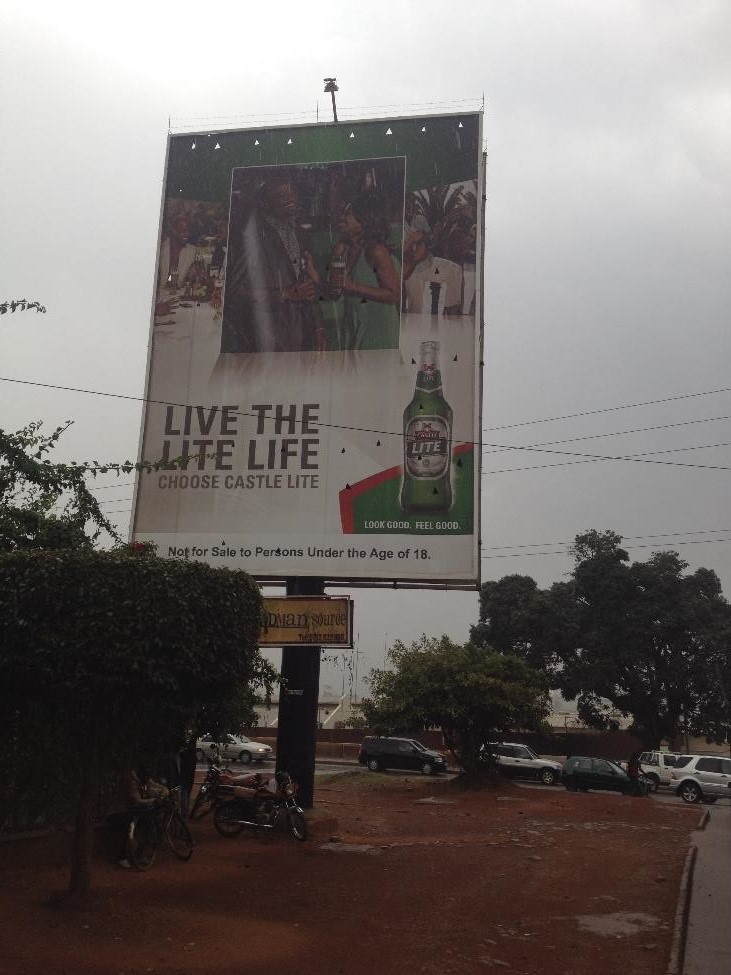
Drink this beer, and your life will be airy and insubstantial. Maybe this prospect holds some serious allure for folks who live heavy and difficult lives. Maybe going out performs a certain salutary function for folks who labor under circumstances and burdens, the weight and quality of which I will never understand. I just hope that if there is indeed meaning in the exercise for some people, that I can somehow grow to understand it.
To be fair, I must confess that I, too, fell prey to the allure of the nightlife last week when this sign crossed my path.
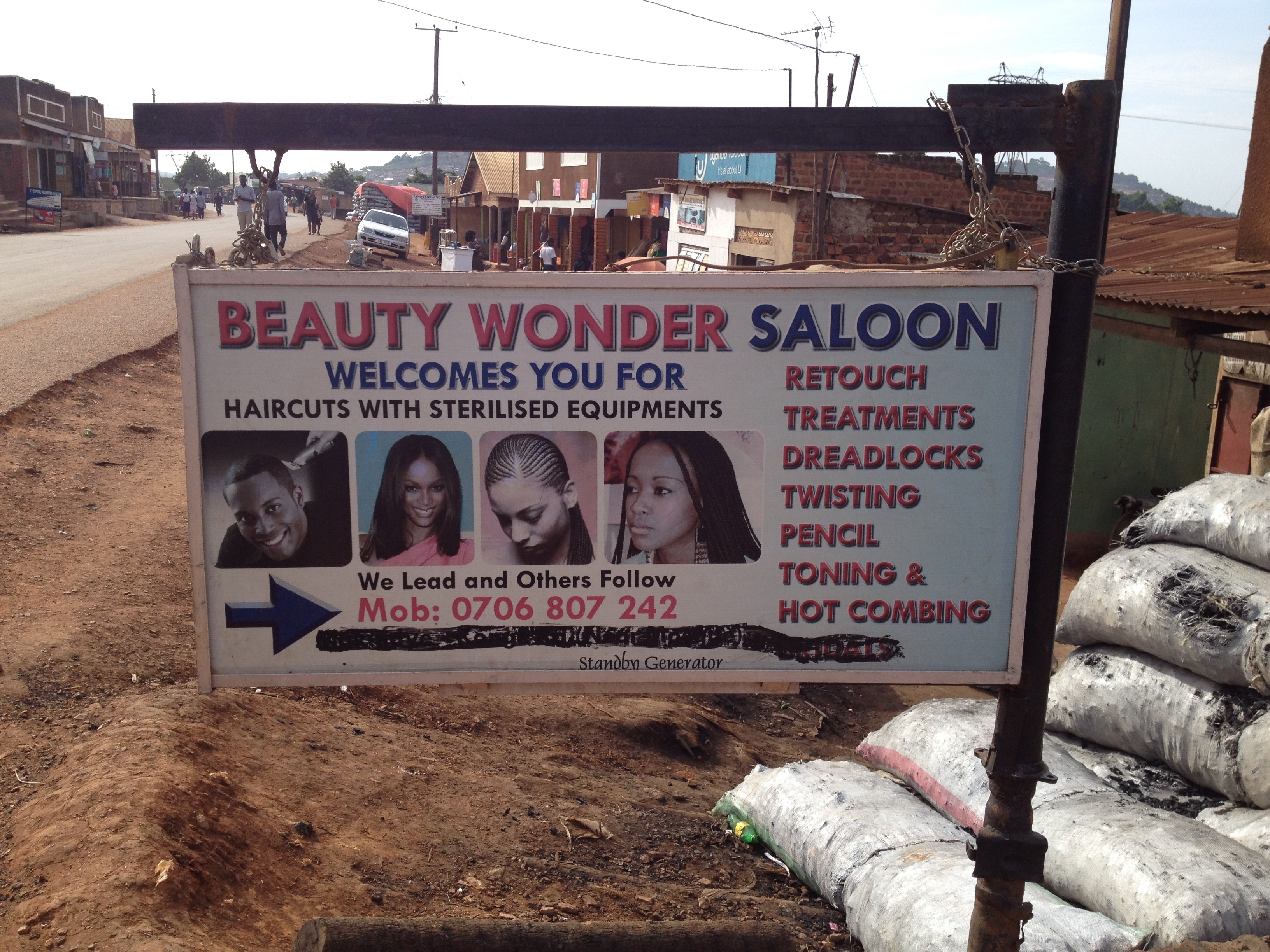
Beauty. Wonder. Saloon. Imagine my disappointment when I realized that it was advertising mere coiffure.
7.8.14
I went to the hospital today to wish my doc friend goodbye, to meet with the director of the Psychiatry department about future opportunities, and to check up on Jesus (see 7.2.14). All was well. She had moved into the Spinal Ward, which is a much better place for her; more personal and specialized care. She has a great nurse named Modesta. It turns out that my friend actually speaks Luganda, the common tribal tongue around here, but only when she feels really comfortable with people. So the great nurse won her over and they have established a rapport. Yay nurses. As a result, Paskazia (her actual name), is doing a lot better than she was doing on the general Surgical Ward. She and her bed are clean and stench-less, and she seems to have some good company in her ward-mate neighbors. Modesta suggested a list of necessities, and I fetched them. Whenever we asked Paskazia whether she could think of anything that she needed, she declined. In my limited interactions with her, she has seemed both stoic and totally zen, completely content with her fate at all times. I think that she probably has some sort of something that the establishment would call mental illness. She seems like a Saint to me.
I include the shopping list here in order to illustrate what kinds of things the hospital provides for the people and what sorts of things it don’t:
Sheets
Blanket
Water
Juice
Flip-flops
Another dress or two
Vaseline
A wash basin
A duffel bag
Toothbrush/paste
A pic of Paskazia, Modesta, and the author:
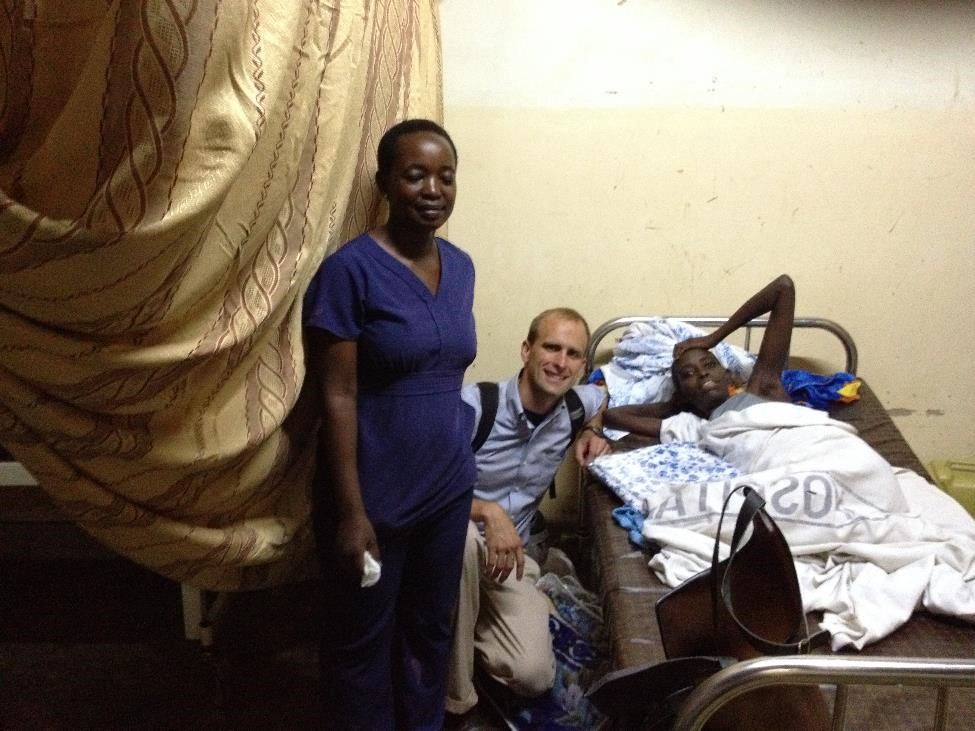
After spending the evening at the hospital, I met up with David, the street boy pastor. It was good to hang out. We are trying to put together a last-hoorah beach trip for the fellas on my last day in Uganda. Which is next Tuesday. Whoa.
I almost posted a picture here of a four-year-old begging on the streets of Kampala in heavy traffic. I thought that it would be a bit too voyeuristic, though; it would violate the principle that I announced at the beginning of the journal of only depicting people who wanted to be up here. I am afraid that I have grown lax in other instances, but this is where I will draw a firm line.
Street begging is a way complicated phenomenon, kind of like prostitution. When one gives money to a kid, one is actually giving money to his manager/manipulator. The movie Slumdog Millionaire does a great job of elucidating this phenomenon. So instead of going into it here, I will simply direct you to that flick.
7.9.14
As if the Beauty Wonder Saloon siren song weren’t enough to entice me from the Straight and Narrow, yesterday I was riding along on my motorcycle taxi, just minding my business, when this truck-full of the finest Kenyan chicks in the entire world pulled up and started making eyes at me. Click here for a picture.
Ha!
I went to the Butabika Psychiatric Hospital again for rounds, this time in the Child Ward. It was really good. The kids were sweet and really afflicted, and the caregivers all seemed to be struggling intensely and valiantly with the burden of this confusing and exacting form of illness. I enjoyed the interviews. The diagnostic process was really interesting because it involved so many different perspectives and required keeping a wide view of the human experience in mind. The psychiatric clinician must take into account—among other key voices (imagined and otherwise)—the parent’s description of the problems, the child’s account, the direct observation of the child in the interview, the accounts of the teachers as mediated through the parents, the results of past interviews, the past medical records, etc., etc.. It requires a ton of empathy and imagination to get all the angles right. The process also requires balancing a biologically reductive medical sensibility on the one hand with a holistic human understanding on the other. For example, our first patient was a 14-year-old girl who had an episodic history of (reported) fever, aggression, sleeplessness, loss of appetite, headache, hallucinations, long-standing underperformance in school, and self-isolation, all against the background of tough family and school situations and good reason to believe that she might be doing a good bit of histrionics and making stuff up. We spent a lot of the interview trying to untangle the biological from the mental from the social from the hormonal from the false. It might drive some practitioners nuts to have to keep so many balls in the air, but I quite enjoyed it; I intend to continue seeking out more experiences like this, testing the waters, getting my feet wet, and listening for more bells. And mixing more metaphors.
7.10.14
I spent the day travelling from Kampala to Gulu.
7.11.14
I spent the day seeking out a few people whose contacts I’ve been gathering over the last couple of weeks in Kampala. I eventually found two of them. I will call them M and J in order to make at least a gesture at anonymity.
I will start with J. He is the only psychiatrist in all of Northern Uganda (Whoops. There goes the anonymity. I am banking on the probability that nobody who reads this journal will ever have anything remotely to do with this fellow). He is about my age, maybe a bit older. He went to medical school, trained as a psychiatrist, and then got a Masters and Ph.D. in Psychology, which apparently is pretty common here for folks that want to teach at the Medical School level. He makes $600 a month as a teacher. He also does some clinical work, which pays about $1000/mo. So he makes about $20k/year as a double-doctored Psychiatrist with a specialist expertise in child psych and trauma, and a strong record of publications. Someone with these credentials in the US would make at least 200, maybe 300k. And he knows it. And he wants out. We spent a large part of our two hour convo talking about his discernment. It was really helpful for me to get a realistic picture of what it’s like to be highly skilled and working for peanuts. This guy doesn’t have the faith thing to motivate and sustain him to live charitably, so his thought process makes a lot of sense.
I learned a lot of other stuff from this really honest, straightforward and insightful guy. He confirmed my suspicions that Mulago Hospital (where I was working in Kampala) is a deathtrap. He added that medical education in Uganda is a joke, which is a conclusion at which I hadn’t arrived quite yet. I pressed him about standardized testing because that’s what cuts out the rot in the American system; it’s impossible to fake it in America because the national licensing examinations are really hard and students only pass them if they truly know their stuff. He explained that in Uganda there are no national board exams. Students get passed or not based solely on the judgment of the individual medical school oral examination boards, and these are stacked with folks who have no interest in failing their students. When a student fails, it is incumbent on the teacher to prove that it wasn’t due to his or her bad (or absentee) teaching. Since teachers here rarely take their pedagogical role seriously (teaching doesn’t pay), they rarely have a leg to stand on in case of scrutiny. So basically all the students get passed no matter how little they study or how awfully they perform. Terrifying, huh?
I have a first-hand story from a couple of weeks ago about lethal ignorance on the part of practitioners, but I am still in the process of sorting out the emotions, thoughts, and details surrounding the event. I will hopefully get back about it soon. Although my track record for actually following up on that kind intention has been pretty lackluster so far, hasn’t it?
The other convo today was with one of the Psychiatric Clinical Officers (PCO’s) at the Mental Health unit of the local state hospital. M was extremely kind and very forthcoming with loads of really helpful insights. She has been in the trenches here in Gulu for a couple of decades and has seen a lot. One of the most valuable pieces of wisdom was her insights into foreign aid. She (predictably) lamented the fact that foreign practitioners come onto the scene for a couple of months, go into towns to try to help people deal with the trauma of the war, and end up doing more harm than good. In the case of mental health work in particular, these practitioners start a therapeutic relationship with people, but then leave them before the patients can really heal. The analogy of a wound comes to mind; the practitioner opens the old, festering wound, but doesn’t stick around to guide the healing process. So the locals are left with lots of unfinished business to attend to, even though they are already stretched to maximum capacity with their own work. Another bane from the West is that people come in to do research, take advantage of the trust and intimacy of the people who are suffering here, and then don’t share the results of their research with the local communities. The people open themselves up to the intrusive poking, prodding, investigation and analysis of the whites, and then reap nothing by way of reward from the relationship. Surely the locals accrue a great deal of benefit from foreign aid. It was good to learn how it goes wrong, though, so that I can hopefully avoid the pitfalls and maybe help others avoid them as well.
We spent the last half of our two hours together talking mostly about the role of spirituality in mental health, specifically the phenomenon of exorcism. M and her friend K, who was also there, are very serious and gifted Christians (K is actually an ordained minister in the Anglican church), and they do not hesitate to pull out the weapons of the Spirit when the situation calls for it, namely when the madness is caused by possession. They do this stuff a lot. One of the toughest parts for them is that the establishment refuses to acknowledge the role of spiritual deliverance when it works. The physicians never include the fact of the deliverances in their reports. Science can usually only find what it is looking for; its complex and God-haunted tradition constrains it to countenance a narrow swath of the universe, and it willfully ignores the rest. I didn’t explain this to the ladies, but I think that they already get it in a less articulate but nonetheless profound way.
The spiritual dimensions of mental health work were intertwined with a discussion about the long-standing insurgency in this region, its aftermath, and the role that mental health work is playing in the recovery. Some super-brief backgrounding: the Gulu region, and other parts of Northern Uganda, were embroiled in a horrific and bloody insurgency for the 23 years leading up to 2010. You can read a solid Wikipedia article about it here. The short of it is that a demonic man named Joseph Kony has been leading a group of soldier/pirate/terrorist/murderer/sadist/thugs on a raping and pillaging rampage in the northern districts of Uganda since 1983. His band is called the Lord’s Resistance Army (LRA). They have achieved a solid reputation of intense and superlative brutality, even in the face of some stiff pan-African competition. From the Wikipedia article linked above: “The LRA is accused of widespread human rights violations, including mutilation, torture, slavery, rape, the abduction of civilians, the use of child soldiers, and a number of massacres (citation provided in article). By 2004, the LRA had abducted more than 20,000 children, while one and half million civilians had been displaced and an estimated 100,000 civilians killed” (citation provided in article). This is out of a population of about 5 million. Please read the article for a much more thorough treatment; I think that it merits learning about. As you can imagine, the trauma around here was been profound and widespread. Many boys were abducted and forced to murder even their own people sometimes. Many girls were kidnapped and abused terribly. Masses of people were killed. And almost everyone lived in constant fear of attack, murder, violence, and violation. All were touched by the conflict; the wounds are deep and the burdens are crushing (the most common psychiatric conditions, according to M and K, are PTSD, depression, and addiction). The number of workers and the resources available to them to address these problems are markedly insufficient for the job; the government seems to have deprioritized mental health as compared to other areas, and foreign aid continues to disappear as the conflict recedes into the past, and as the worldwide economic depression causes donors and countries to cut the charitable items from their budgets (I wouldn’t be surprised if they are usually the first to go). As the need for treatment continues unabated, its sources are drying up. M and K feel the crunch deeply. I think that it would be a tremendously helpful and fruitful endeavor to be able to pitch in at some point down the road in a responsible, circumspect, and savvy way.
7.12.14
It turns out the Northern Uganda was like so 2011. War is just a whole lot sexier than peace as far as the international community is concerned. This according to a Canadian woman whom I spoke with this morning, and who has been back and forth between here and home over the last few years. Thanks, Jill, for confirming some key premises behind yesterday’s thoughts, and for adding some material to the foreign aid self-critique.
I just popped into a little gathering of Peace Corps folks and their host families where the PC people made a performance that was meant to be a culmination of their lessons from the year in their language class. The performance consisted of a native tribal dance / mating ritual much like the one that I witnessed back on 5.30.14. Much as then, I found the whole thing primitive, base, and animalistic. I had a new insight, though. Whereas I realized before that this sort of exhibition does not reflect Ugandan culture, I now see that it, instead, reflects is American prejudices about Ugandan culture. Not once in my entire time here have I seen any of the locals doing any of these jungle dancing routines. If the PC folks wanted to represent actual Ugandan culture, they would do a skit of dudes getting drunk on the local gin and squandering their meager wage-slavery proceeds at a sports betting parlor to a blaring soundtrack of The Backstreet Boys. And down the street, the women would be kibitzing on the mud hut stoops with babies hanging off of them and hordes of kiddos romping all about. And if the PC types wanted to portray a high-culture angle, they should depict the people singing soul-lifting Glorias at a Catholic Mass or undergoing fits of ecstasy at a Pentecostal revival. Unfortunately, though, these scenarios will never figure prominently into the PC repertoire; they do not fulfill any particularly American agendas. I would argue that one of the agendas, at least of the Peace Corps, is the promotion of liberal attitudes towards sex, which would go part of the way to explain their choice of the most primal and libidinous cultural expressions, rather than the virtuous and restrained. The tribal dance thing seems to me a projection of American values onto the local culture rather than a reflection of the culture itself.
A related thought: One of the most significant (and perhaps obvious to you, but obscured for those of us living in the thick of endemic political and historical rhetorical posturing) and important aspects of sub-Saharan Africa is that civilization seems to be a relatively new and foreign concept around here. Pick any one of the thousands of really significant historical (cultural, political, military, scientific, etc.) developments that made any part of the West or Asia or India or Persia or the Middle East what it is today. While that world-changing, pivotal event was happening, the people in sub-Saharan Africa were either running around marauding and pillaging or, much more likely, getting marauded and pillaged. By all accounts, which are meager and mostly oral before the mid-1800’s, life throughout all of Africa was similar to life in Gulu during the terror of the LRA, except the brutes didn’t have the guns and trucks with which to murder on such a large scale and with such efficiency. Whatever traditions might have flourished didn’t get recorded, and, assuming that they existed at all, they didn’t survive until the whites came and started writing things down. I would hazard to guess, though, that the scattered masses missed the boats with regard to Philosophy, Literature, Math, Science, Religion, Art, Politics, etc.. In short, they lacked the Humanities, the highest and best fruits of civil society. I could be totally wrong here, and these assertions are no doubt extremely controversial and politically incorrect, but what little I know about African history, and the bits and pieces that I’ve been gathering about the contemporary culture, suggest that the sub-Saharan population was something of a tabula rasa culturally speaking when the whites first got here, and remains so in many ways today. Tragically, as I’ve mentioned elsewhere, that blank slate is being marred by the basest forms of foreign imperial opportunism; the people lack recourse to coherent and thoroughgoing traditions of their own from which to resist the onslaught, and, as a result, they remain tragically vulnerable to violent foreign cultural manipulation. Foreign entities’ projections of African cultural traditions seem like so many straw men fueling the conflagration of local corruption and imperial greed; it seems that these projections’ main, perhaps unintended, function is to stifle dialogue regarding what is actually going on in the culture and about how to strengthen that culture in the face of such formidable foes.
I write this while listening to hard-core, base-hammering, mind-numbing American dance music blaring outside the compound at 2:00am on a Saturday night. Youth culture around here is essentially comprised of all of the most saccharine, violent, superficial, and manipulative table scraps of the international Pop scene. The lion’s share of the vacuous and impoverished diet comes from America.
I must say, though, that even the most inane American music is sound for sore ears after enduring Ugandan pop for any extended period of time. I almost cried with relief on a long bus ride recently when, after five hours of Ugandan pop, Jay Z came on. In a million years, I never could have imagined the conditions under which Jay Z could be a relief to me. Thank you, Africa.
I spent the day trying to soak in the town of Gulu and its environs. I went to a big market, walked around town, hung out with some High School volunteer dudes in the Mental Health ward of the big State Hospital in town, found my way to Lacor Hospital outside of Gulu (more about this impressive operation soon, I hope), dropped by an orphanage, chilled out at a village billiards shack, got randomly escorted to a deaconate ordination party, and finished the day dining with my fellow residents here at the Diocese Catechist Training Center and catching up with you, my dear readers.
Some pics from my saunterings:
Here is a typical road in Gulu, just so you can get a sense for the landscape, road quality, etc.. Before I went, I was under the misguided impression that the landscape was arid and deserty. It’s actually pretty lush.
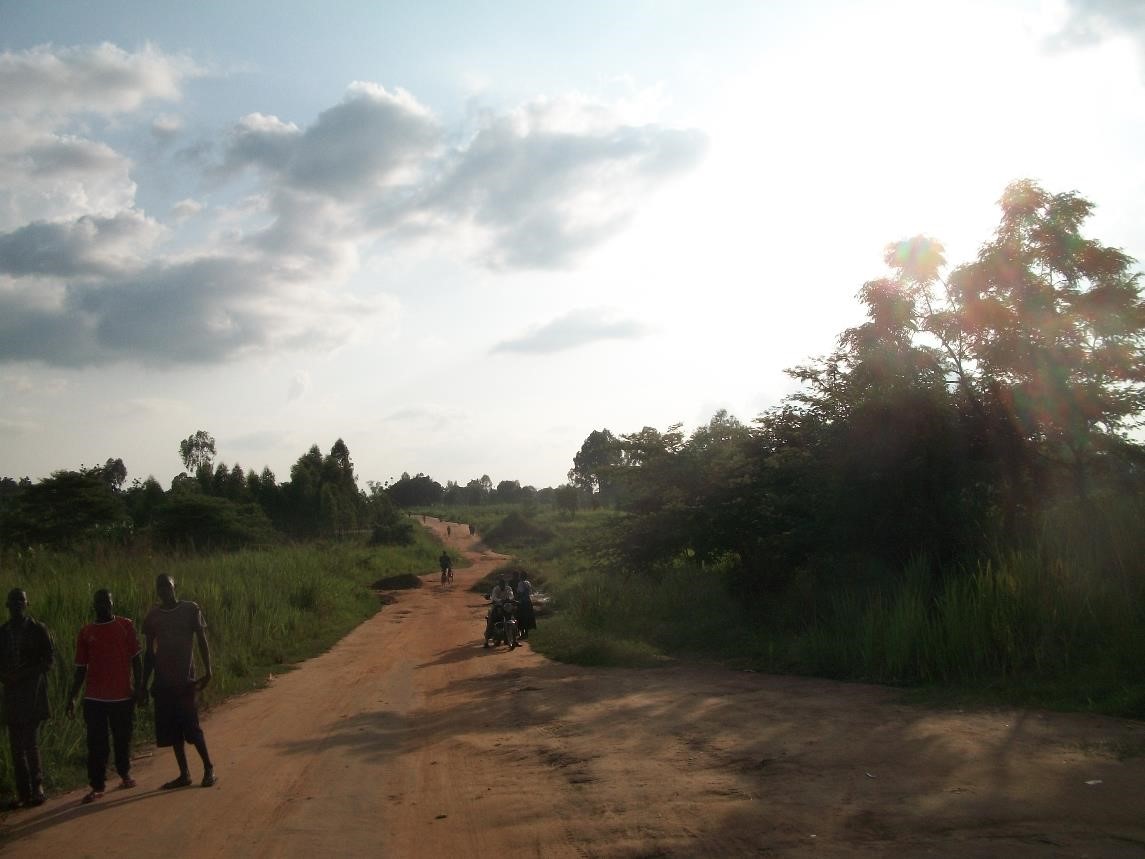
Some huts, to get a sense for how the people live:
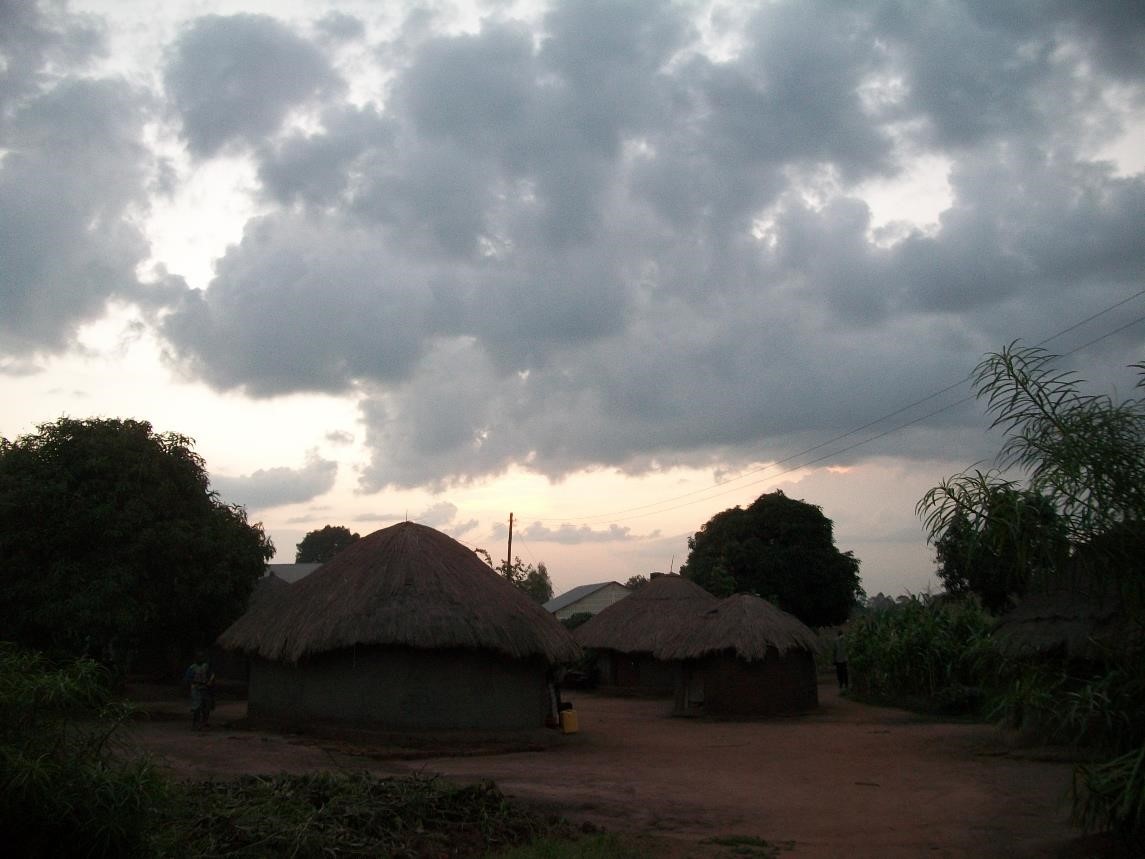
Here is what my field of vision actually looked like for most of my time on the road in Uganda:
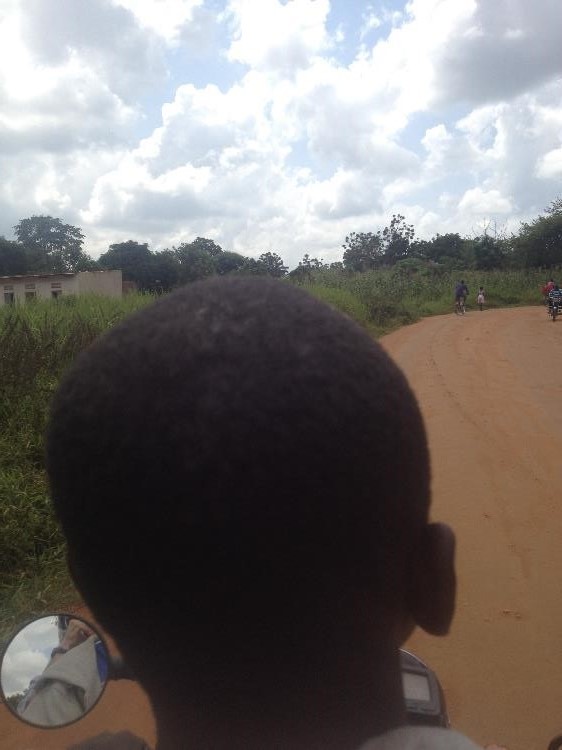
And this is how the author was represented to a broad swath of the population throughout his time abroad:
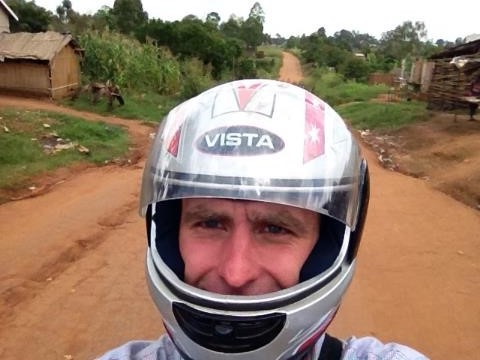
The alien spaceship analogy has occurred to me multiple times in my efforts to imagine what it must have been like for the locals to encounter the Western arrivals. My appearance probably accomplished a great deal by way of confirming the analogy in the locals’ minds as well.
A couple of shots from Lacor hospital, a really impressive operation a couple of miles outside of town:
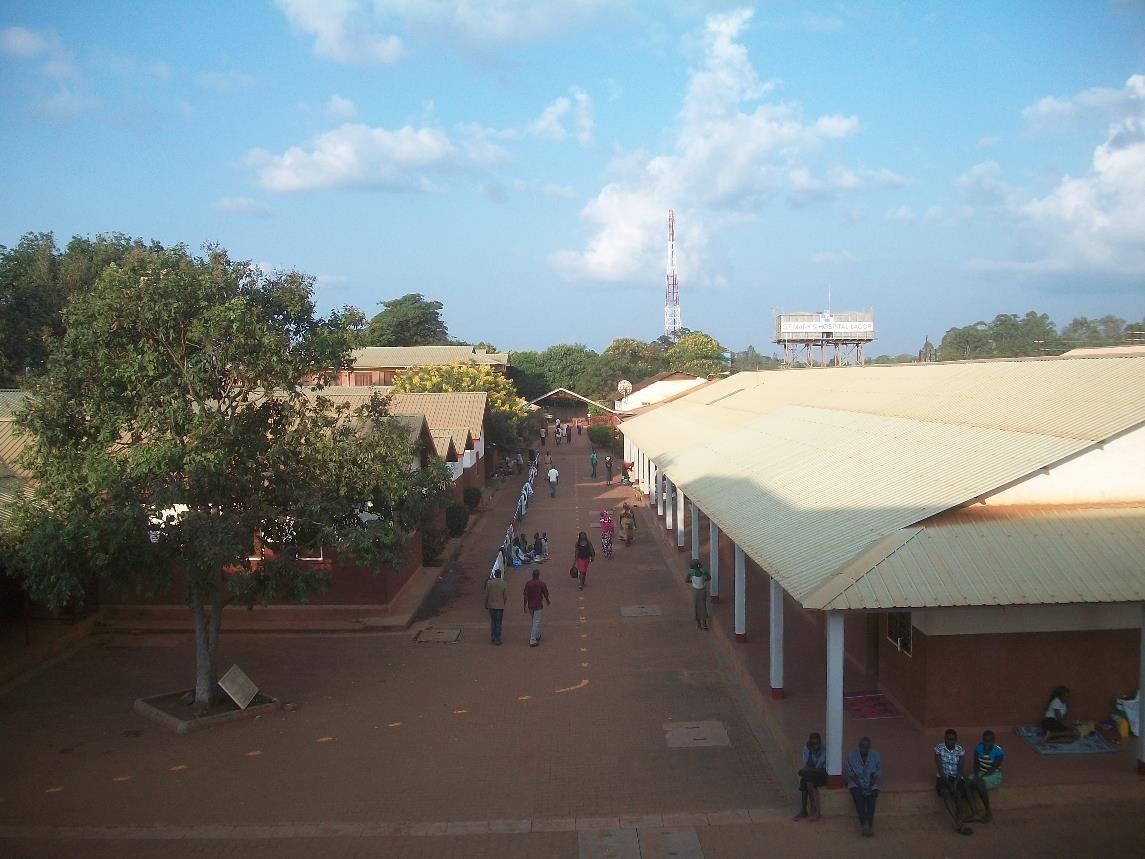
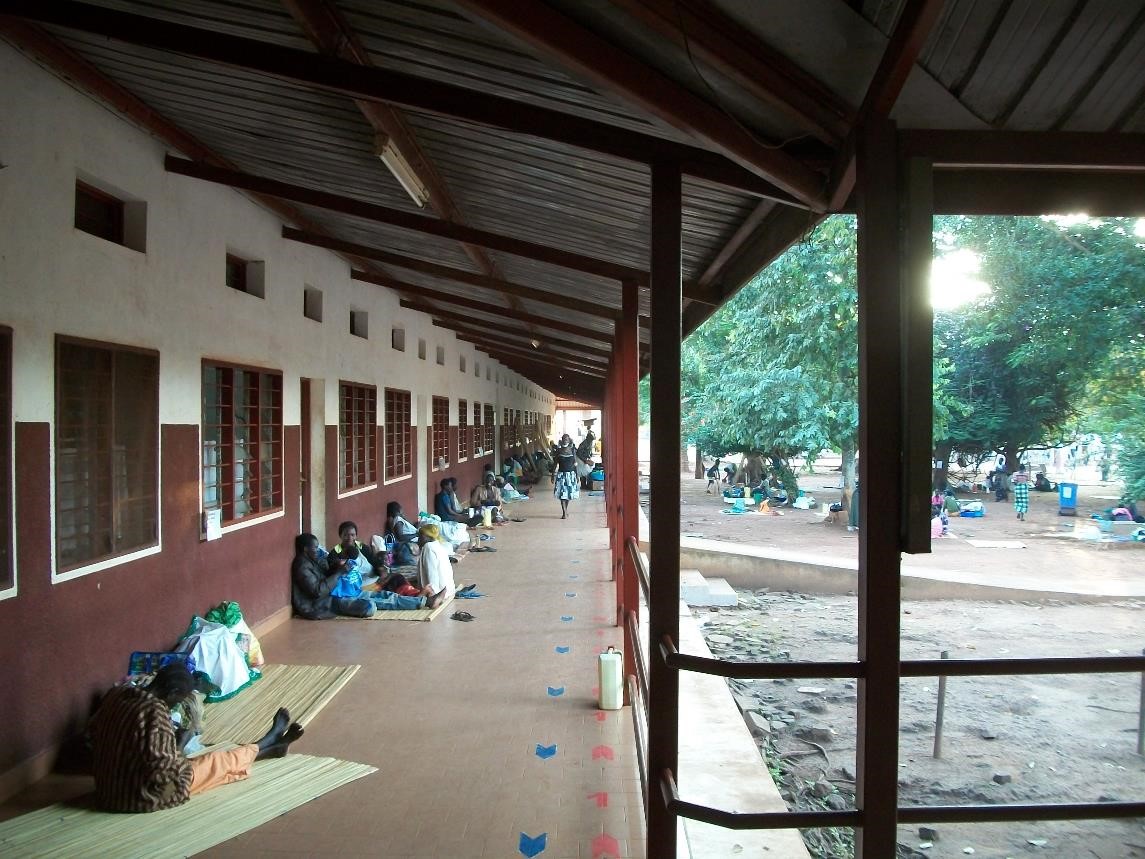
This hospital was founded by some very dedicated and generous Italianos back in the sixties. The folks who started it lived here on the hospital premises and saw the place through many tumultuous years of Ugandan turmoil, including an Ebola outbreak in 2001 that claimed the lives of a few of the founders. Pretty heroic stuff. Here is a poster that charts 40 years of growth until 2005:
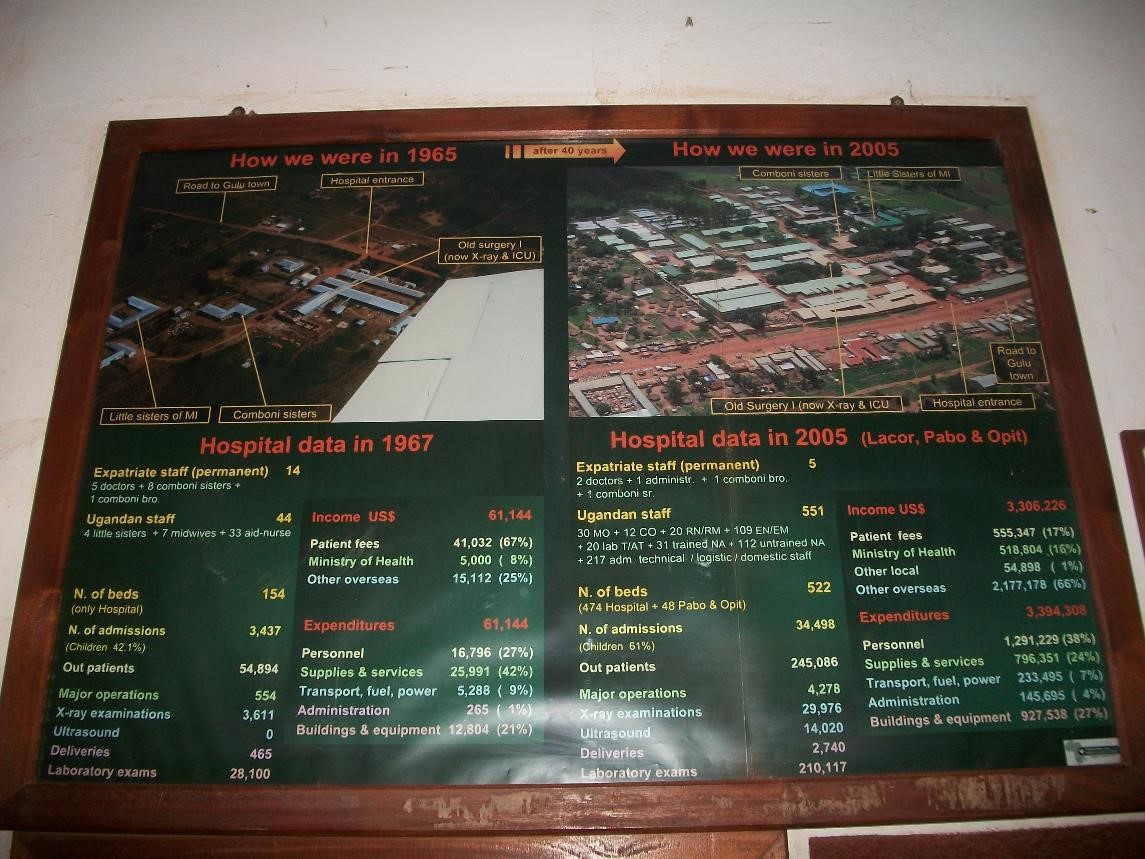
I thought that this fee schedule was a solid representation of how different services stack up to each other, and how low one could possibly hope to keep one’s fees, given that one wanted to remain quite charitable. The photo also reveals where the administrations allegiances (hopefully) lie. In order to convert to dollars, divide each number by 2500. So, a 10,000 Uganda Shilling (Ush) operation would cost $4. The standard/institutional/private distinctions are as follows: “Standard” is for Joe Blow Ugandan walking in off the street who doesn’t mind being crammed together in a Ward with a bunch of other folks, “Institutional” is for people associated with relief work (I think), and “Private” is for folks who want a single room and some special attention.
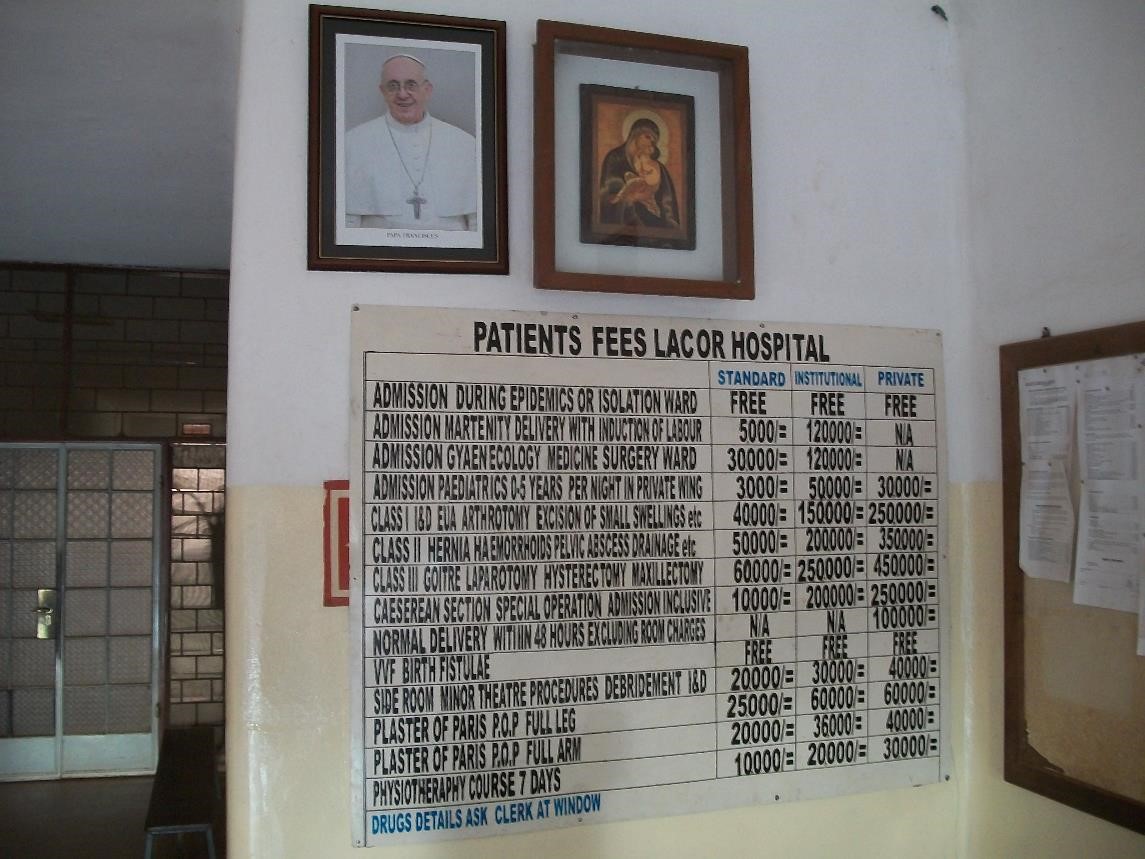
This creative young fellow made a remote control truck out of wire. Pretty rad:
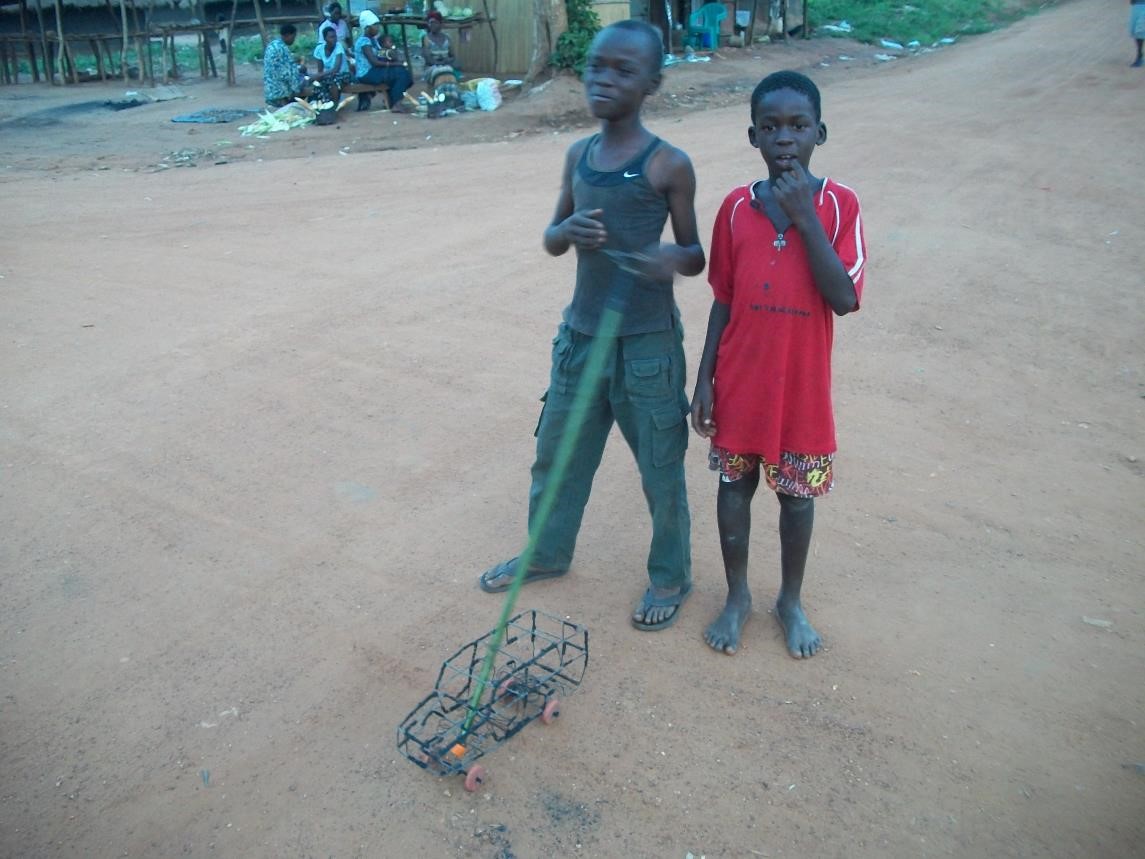
My lodging is right down the road from the Archdiocese cathedral. When I went for my morning run yesterday and came upon the edifice, I felt like I had stumbled upon the house of a god or the outpost of an alien civilization way more advanced and powerful than ours. I can barely even begin to relate the effect. Imagine spending a life among grass huts and never seeing a building made of concrete, let alone anything higher than ten feet tall. And then this:
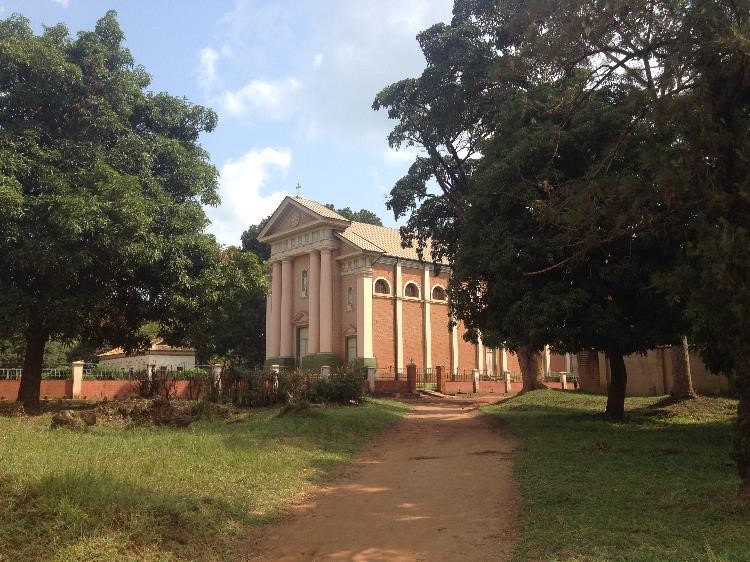
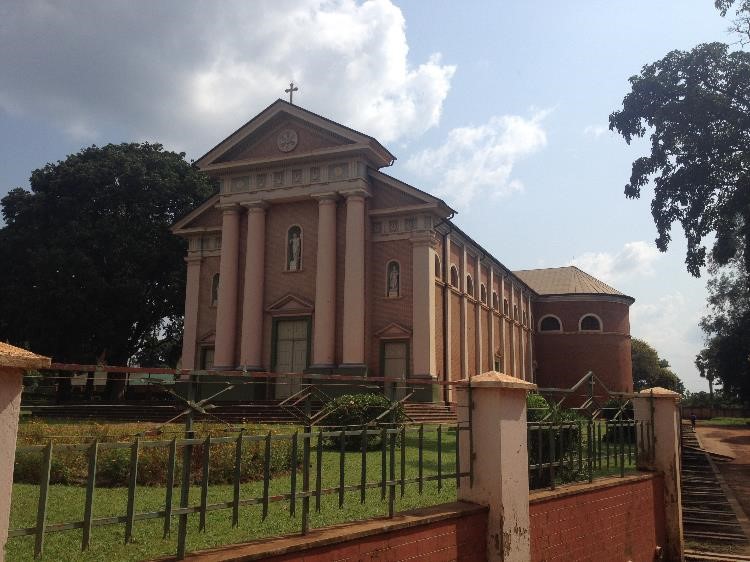
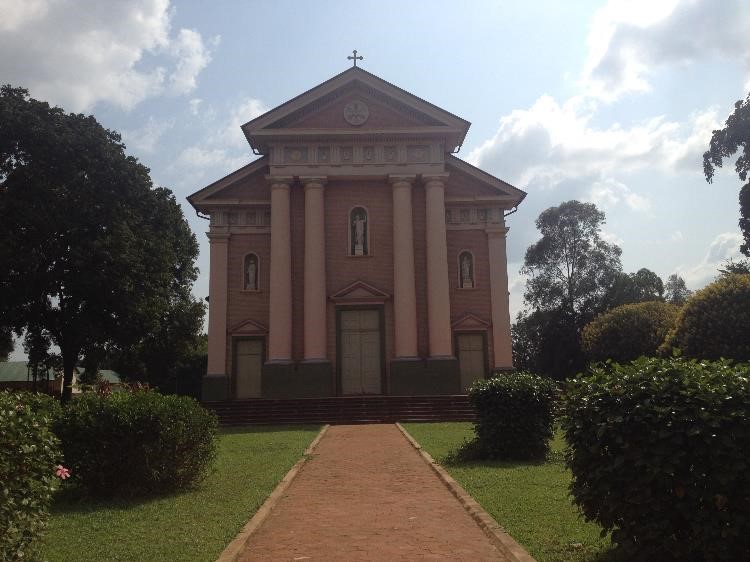
Tremendous. Awe-ful. Jaw-dropping. The architecture screams power and glory, beauty and might. Though I’ve taken a course in Roman architecture before, I’ve never quite understood before now what it would have meant for a Roman peasant to arrive at an imperial temple, or for a son of Christendom to worship at his local seat of eternal power. And though I’ve seen many of the most famous and impressive cathedrals throughout Europe, I’ve never before had this experience of juxtaposition, this insight into parochial awe. Thanks again, Africa.
7.13.14
I travelled from Gulu back to Kampala today. I was spared from a cramped bus ride and seven hours of Uganda pop music by my very generous host, Fr. Jino, who gave me a ride in his SUV. Here are a couple of pics from the trip:
Crossing the Nile

Baboons!
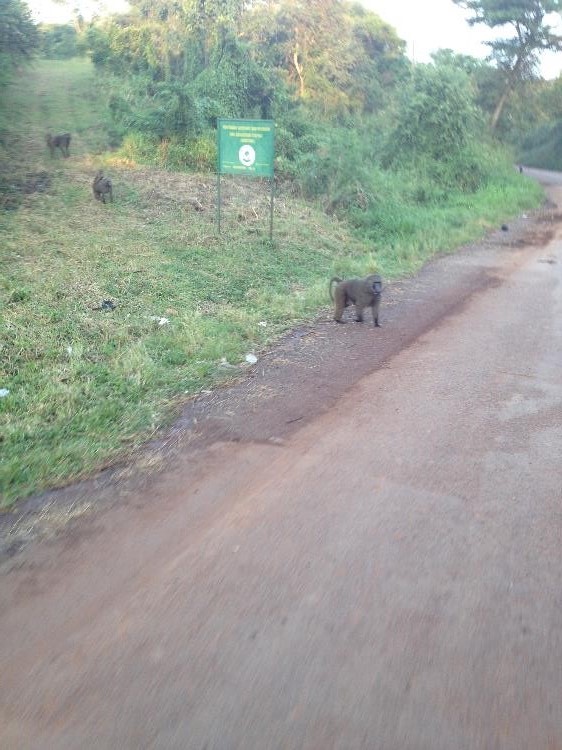
7.15.14
[Note from 7.22.14: The following days were full to overflowing with travel, a wedding (not mine), family time, etc.. I didn’t have much time to write much about it all, so the entries are truncated. I will try expand them soon, though. Thank you very much for your patience.]
Today, my local friends, David, Lawrence, and I took a 30-strong crew of street boys to the beach. Totally epic and hilarious. Here are the pics only; I will try to fill in the stories soon. In the mean time, I hope that the pics will suffice to convey that it was a riot, and that a blast was had by all.
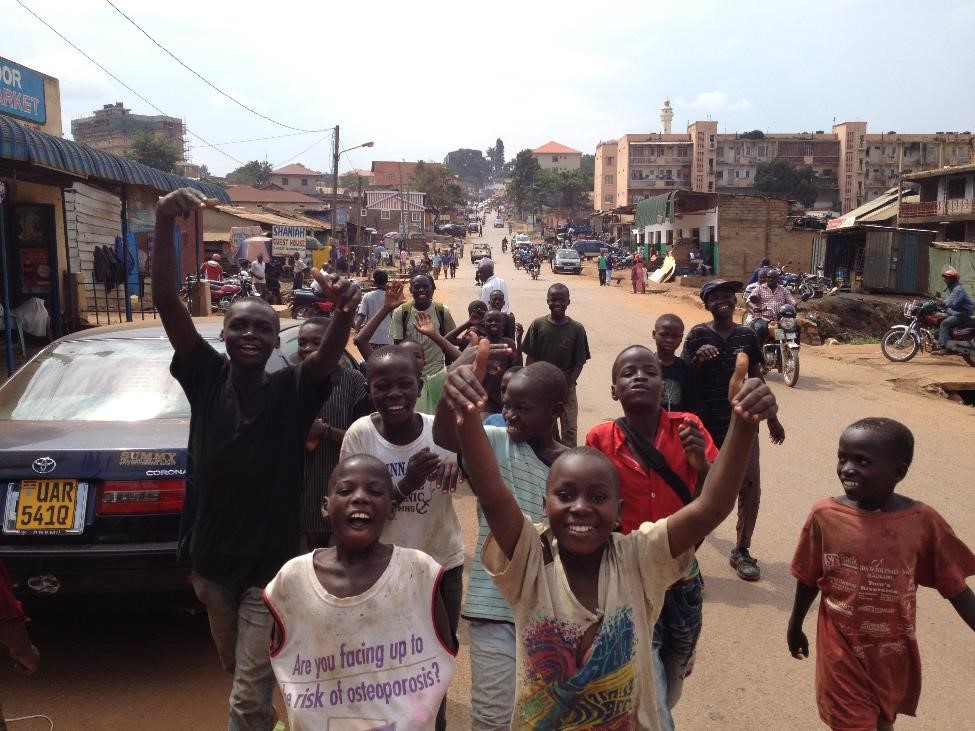
Do you remember one of the opening scenes in the movie Aladdin, where the starring street-urchin sweeps through the city, swiping pieces of bread and evading the authorities while winning over the audience with his indomitable smile and boyish charms? The soundtrack from that scene accompanies my memory of the mile-long walk from the slums to the taxi park. Whenever we passed a street-vendor, he guarded his cart with squint-eyed suspicion, and with his arms spread out to ward off the band of ravenous mongrels. I doubt that the city had ever seen so many of its most notorious trouble-makers all banded together and on the move. At one point, I spied Shafique, one of the most charming, funny, and devious of the bunch, popping his head into a trailer full of goods while the owner was making a trip to unload it. At another point, one of the guys snatched the fabric trash-liner from a public trash can; they use them as sleeping bags at night. One of his colleagues gave him a cuff over the head, though, and replaced the bag. I guess the overall sensibility was that this beach trip was something of a high occasion, and no time for the usual antics, even if the old temptations proved irresistible at times.
A picture of the dudes on the busride to the Lake:
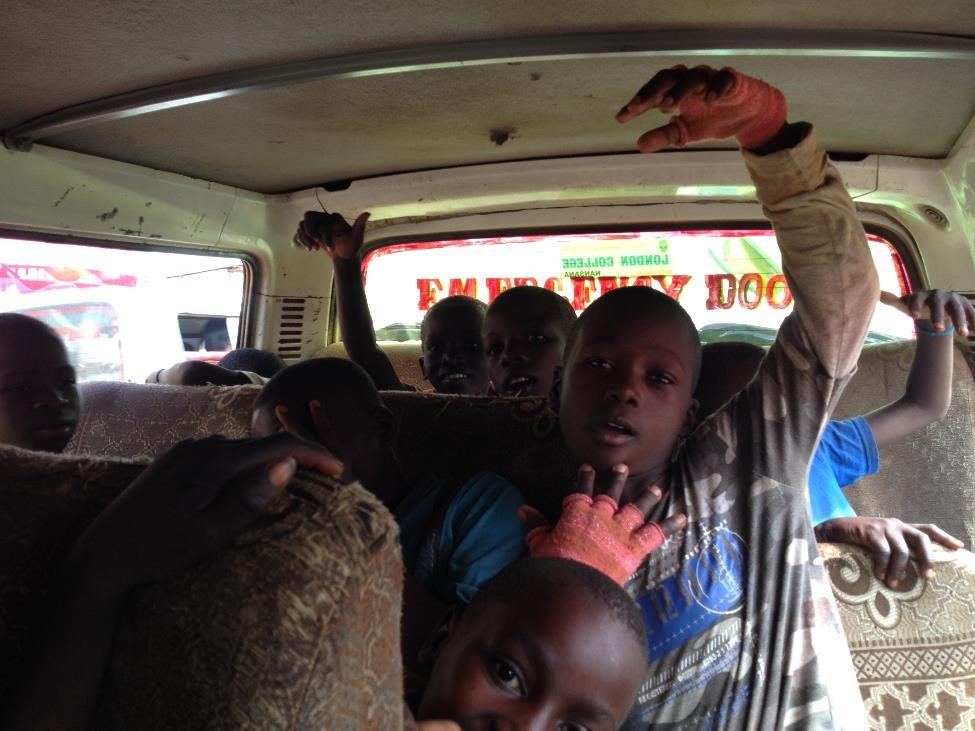
The swim:
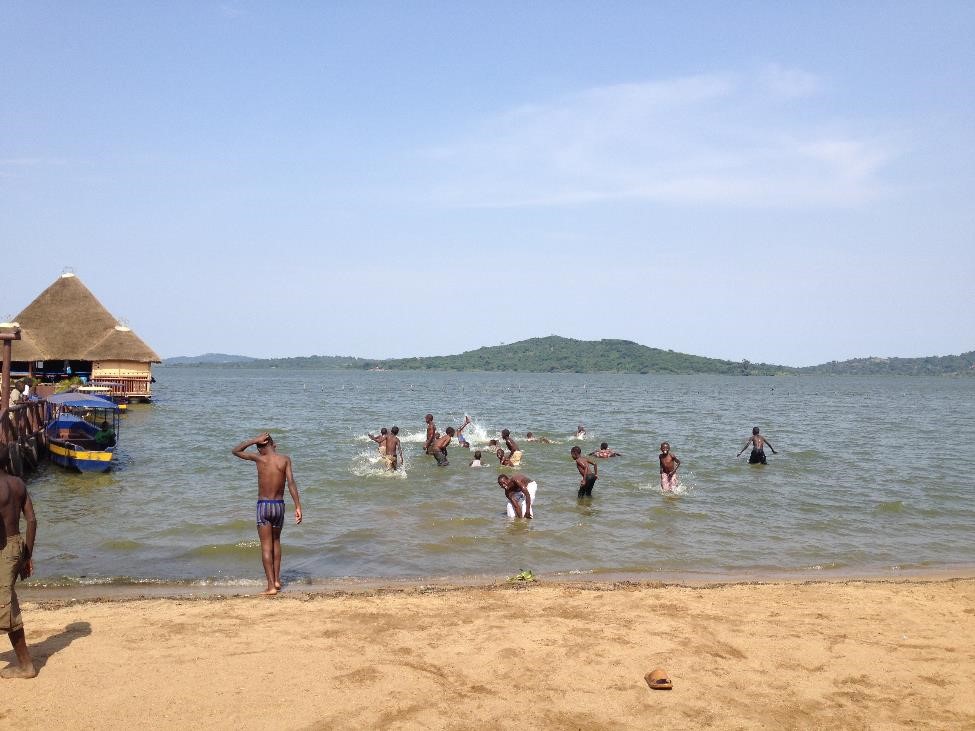
Coordinated attacks and merciless retribution:
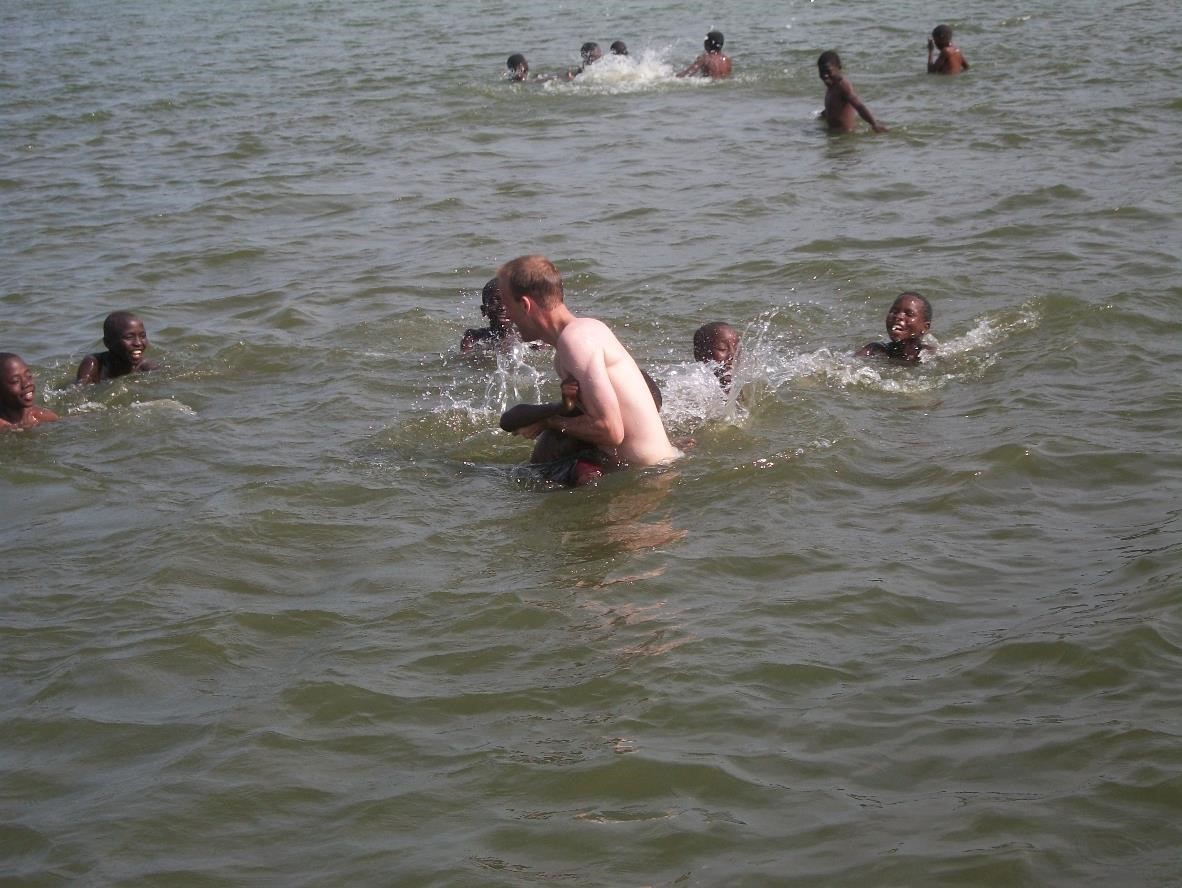
Some dudes post-swim:
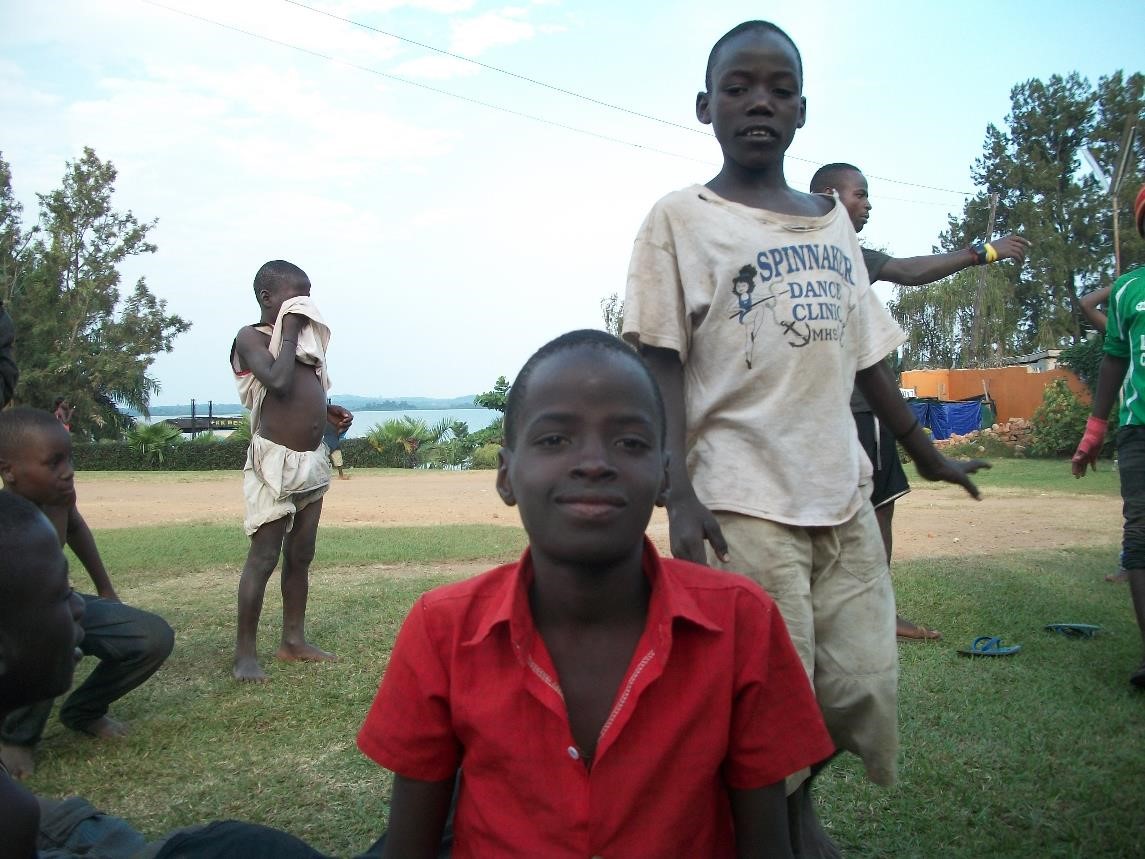
This is a picture of wolves circling their prey.
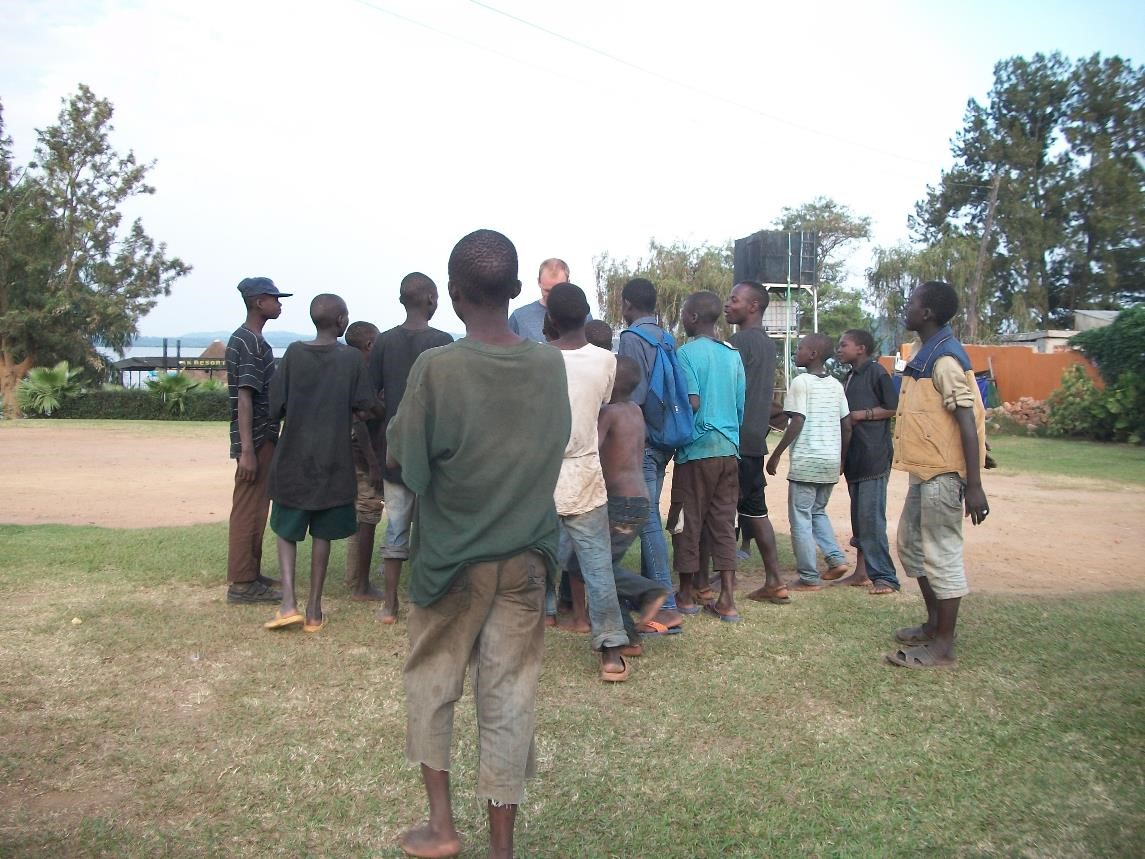
I made the huge mistake of ordering a few plates of fries to serve as prizes for some friendly competition. I failed to realize that in the Street Boy world, everything consumable, food especially, is always up for grabs. Just after I handed a plate to the first winner, and before I could register what was happening, a pack of thirty wild-eyed, ravenous beasts descended on the poor guy and stuffed their mouths with his spoils. Everyone, including the victor, thought that it was pretty funny, though, so no harm was done. The remaining two plates were really difficult to guard; they had tasted blood, and they were eyeing the remainders with real, almost desperate, longing. Some of the guys even begged me pitifully for just a fry. It gave me some insight into the mentality that accompanies these guys’ need. Food isn’t the stuff of games for them. Food, and the survival that it represents, is a deadly serious business. Their horizon of hope and opportunity extend not much further beyond the next meal. Whereas most full-bellied American kids, if placed in this situation, would be interested in behaving well in hopes of future favor and reward, these kids regressed to brutality at the scent of a snack because their opportunities for care and sustenance end after the meal does.
This is a little watering hole close to where the guys live, colloquially called “The Beach.” A sad reminder of the real thing, but hopefully one that will help them remember a happy day:
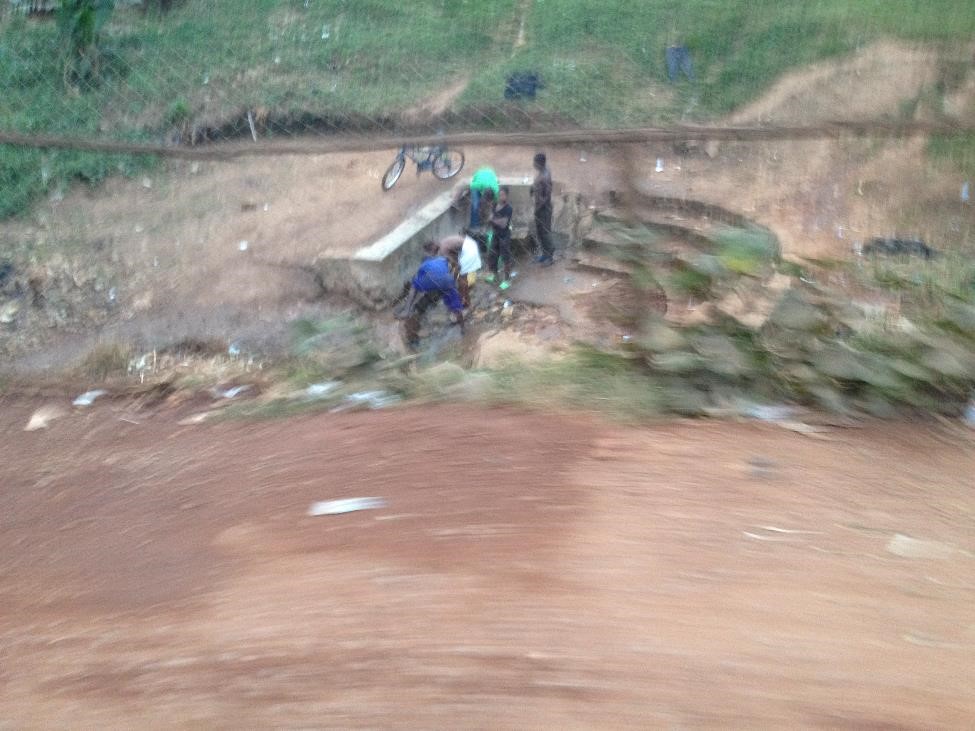
7.16.14
Last day in Uganda. Thoughts aplenty. More soon, hopefully. Stay tuned.

There is a story here. I will try to tell it soon.
7.17.14
After a night-long plane flight from Uganda, I arrived in Brussels for a five-hour layover. I put my bags in a locker, took the train into town, and ran around for a couple of hours. It turns out that Brussels might be the most pleasant city in the entire world. The contrast with Africa is, of course, astounding, and the culture shock both pleasant and intense. I will post pics now, and try to relate some more thoughts later.
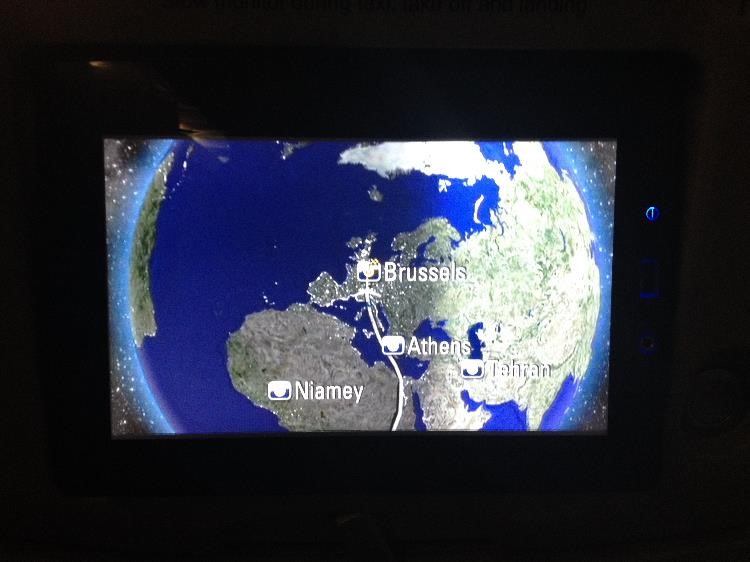
Back in the land of six-dollar juice-shots:

One of the most astounding things about the city of Brussels is that one encounters a fabulously old and utterly majestic church on almost every other corner. Priceless gothic gems awaited me at every turn. It was like being at an old University such as Oxford, and encountering centerpiece-worthy specimens all over campus, just strewn about among the other quotidian buildings like it was no big deal at all. Here are just a couple of the many examples:
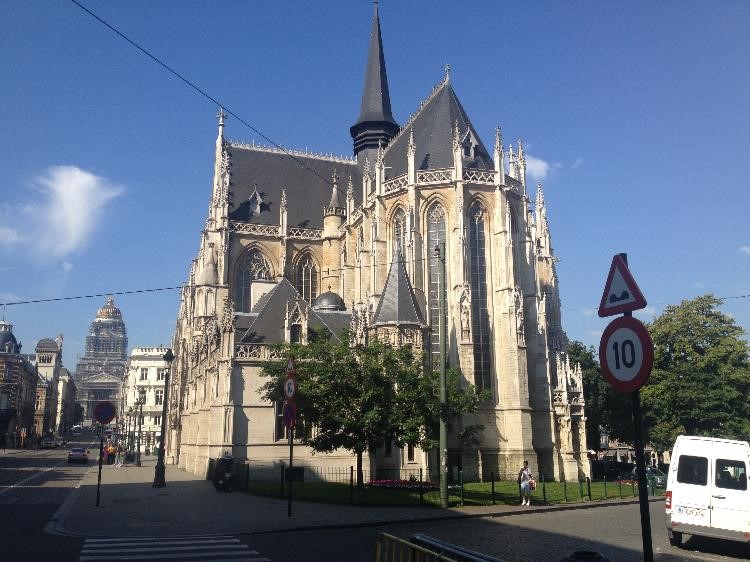
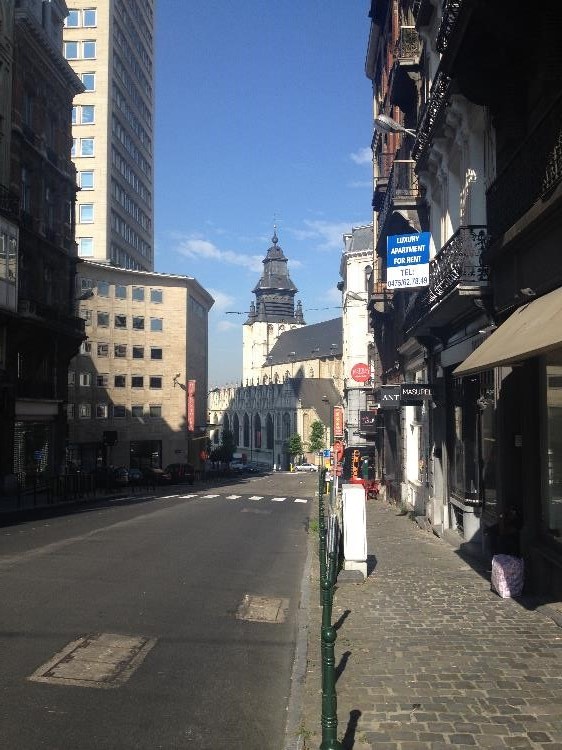
Another really pleasant aspect of the city is that it features plenty of gorgeous public spaces. Here is a centuries-old Grand Duke’s rose garden, open for the world to enjoy:
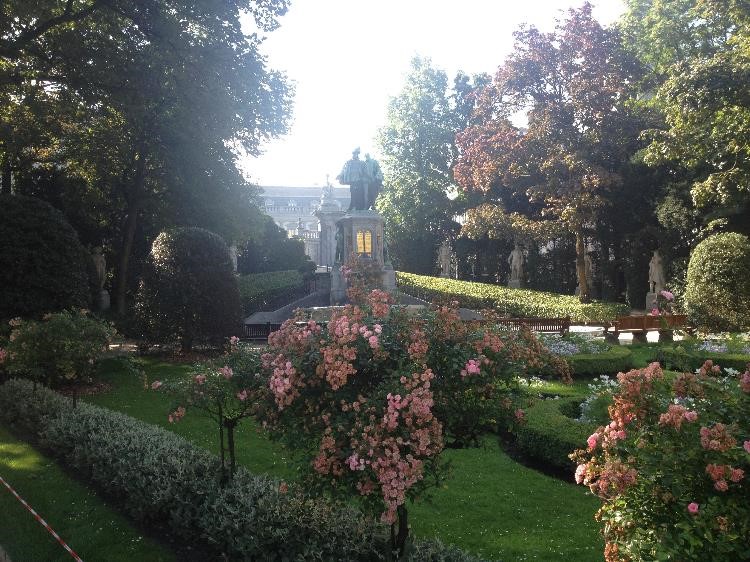
7.18.14
Arrival in Denver.

Yeah!
A sight that gave me no end of delight and peace:

The stateside reader probably has no concept of what a beautiful, life-affirming thing it is to see a word like “defibrillator” spelled correctly in a public posting. It somehow conveys the sense that there is order in the cosmos, intelligent design, peace on earth, and attention to my well-being. Society is conspiring against chaos, and, in the end, people care that things go well instead of poorly. Oh, it is so good to be back. God bless America.
7.19.14
Before returning home to the Bend, I spent a week in Crested Butte, Colorado to celebrate my sister’s wedding and hang out with the parents a bit afterwards. The rehearsal dinner was tonight, and the wedding will be tomorrow.
A couple of shots from the decks chez Arnold:
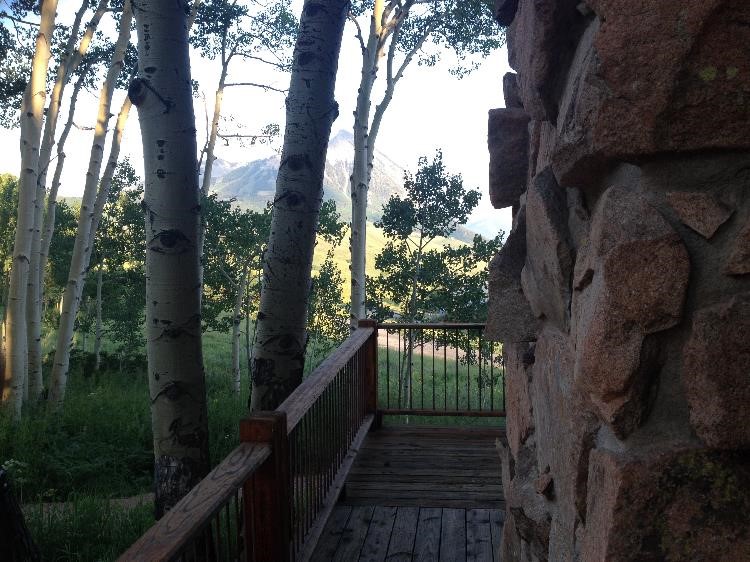

It’s a pretty place.
7.20.14
The Big Day.
Pregame:

The groom and the ladies:
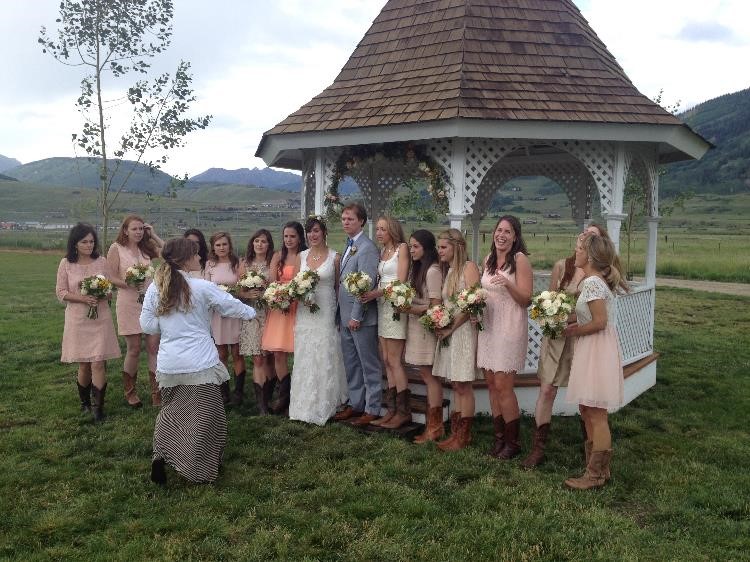
The wedding was tremendously joyful and I think that it worked.
7.21.14
Today my family minus the honeymooning bride drove about ten miles up into the mountains to reach our favorite picnic spot. The place is called Paradise Divide. “Paradise” because, well, it’s pretty astoundingly beautiful, and “Divide” because it’s the place from which rainfall and snowmelt either go towards the Atlantic or the Pacific, depending on which side of these mountains they lie.
A sister and me getting just drenched in the glory:

Front-row seats to the cloud-works bonanza:

Fireside sunset. The picture doesn’t really capture it that well, but at a certain point right before the sun goes down, everything turns to a pinkish-orangish-gold and bursts into a fiery glow.

If you want to get a sense of where we were from a satellite’s perspective, click here (You can actually see the firepit if you zoom in close enough; pretty impressive work there, Google. If this type of imaging is available to the general public, just imagine what our dear, vigilant, and solicitous government can do.).
My dear, magnificent youngest sister:

7.22.14
This morning, I woke up with a chip on my shoulder. In my waking confusion I had no idea what it was, so I blurted out a cussword, batted this creepy thing off of me, jumped up in my bed, and tried to figure out what the heck kind of gigantic insect or something had visited me in my sleep. Only later, after being up for a bit, did I spy the culprit and identify my bedfellow. Here he is, pictured in his setting and then up-close:
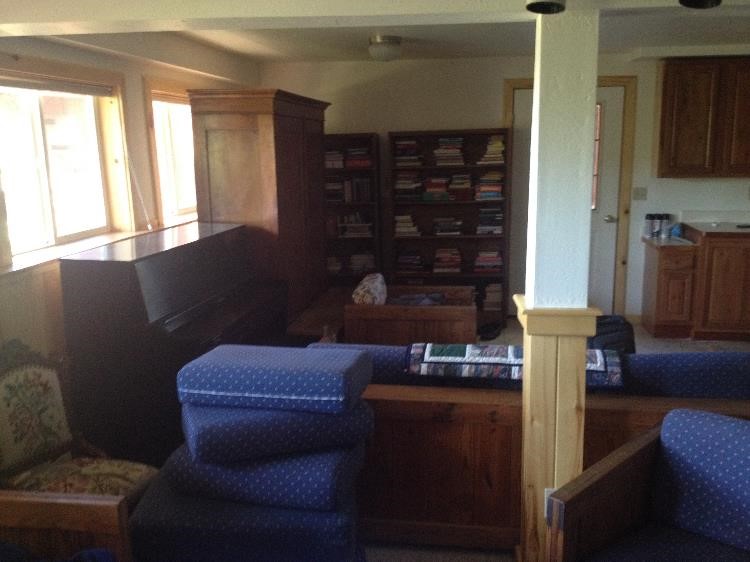

I suspect that this little sprite appeared here for a reason. I suspect that this might be one of those mythical and seldom-seen (let alone photographed) editorial chipmunks, sent by the Fairy Queen of the Blogosphere to encourage some manner of restraint among her more loquacious devotees. Although I don’t precisely remember it, I am pretty sure that, while perched on my shoulder, the editorial chipmunk whispered into my slumbering subconscious gentle admonishments to maintain brevity and pleasant dreams of swift endings. How else can I explain my waking with the overwhelming sensibility that now is indeed the time to leave you, my dear reader, to your own journeys in the wide and glorious world.
Thank you very much for following this monstrous tale to its conclusion, and for your prayers. I hope that you’ve enjoyed a thing or two here. Please be in touch.
Christ’s Peace,
Cliff
P.S. I intend to write an Epilogue soon in order to tie up some loose ends and include some great pics that didn’t make it into the narrative flow of the rest of the journal. So check back soon if you’d like. C
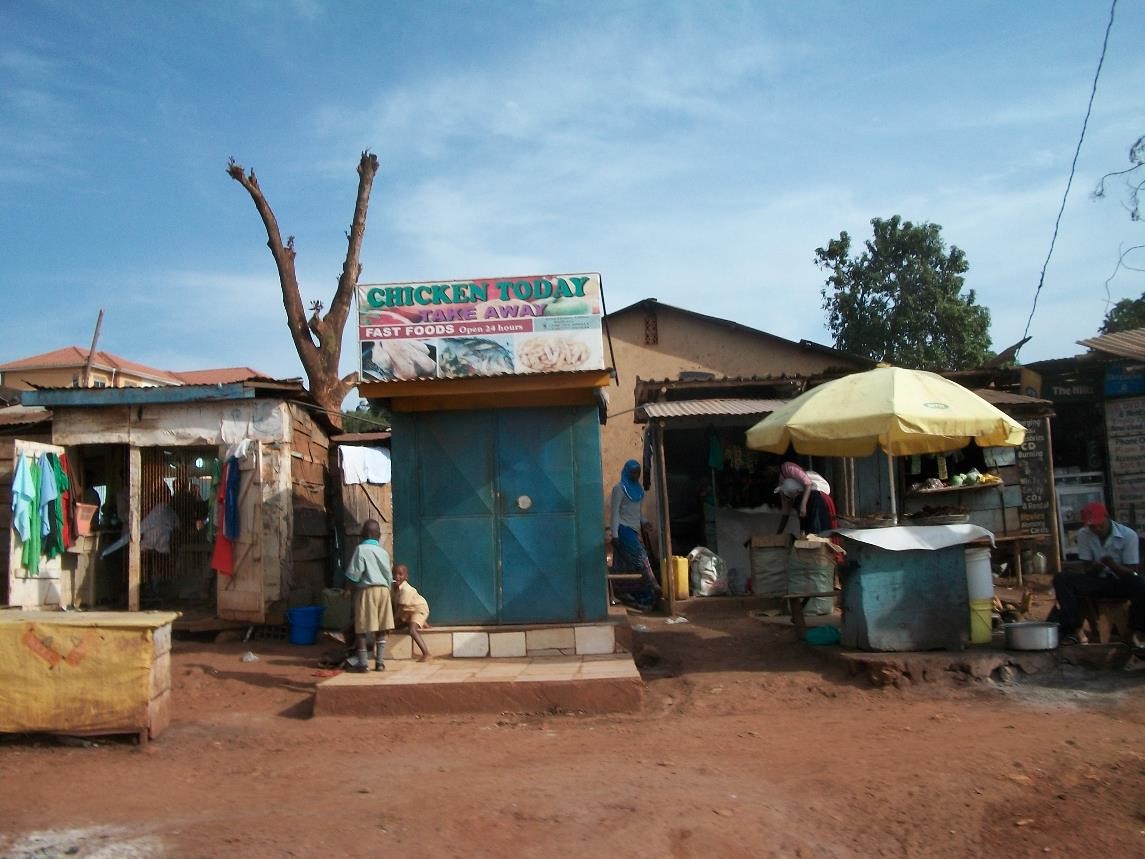
This communication website is for informational purposes only. It is not intended as an offer or solicitation for the purchase or sale of any financial instrument or as an official confirmation of any transaction. All market prices, data and other information are not warranted as to completeness or accuracy and are subject to change without notice. Any comments or statements made herein do not necessarily reflect those of JPMorgan Chase & Co. cliffarnold.com, its subsidiaries and affiliates.
This transmission may contain information that is privileged, confidential, legally privileged, and/or exempt from disclosure under applicable law. If you are not the intended recipient, you are hereby notified that Any disclosure, copying, distribution, or use of the information contained herein (including any reliance thereon) is STRICTLY PROHIBITED. If you received this transmission in error, please immediately contact the sender and destroy the material in its entirety, whether in electronic or hard copy format. Thank you.



























 Please note the rhino horn:
Please note the rhino horn: 
 The dragging:
The dragging: 
 Dragging attempt #2:
Dragging attempt #2: 
 Sick!:
Sick!: 
 Not actually like this:
Not actually like this: 
 For your sense of scale [!]:
For your sense of scale [!]: 


























































































